Impossibles

Paul Gauguin: Soyez amoureuses, vous serez heureuses
[Love, and You Will Be Happy], (1899)
"I will not be telling anyone what I didn't intend to tell them again."
By long tradition, the final installment of any story series should at least attempt to summarize, to digest whatever it might have attempted to impart in its prior pieces, to, in the crude vernacular of the professional trainer, "tell them what you told them." There almost always came a time, in my career as a teacher of professional people, when the organizer would start speaking of Training The Trainer. This point signified the impending end of my relationship with that organization and the doom of our inevitably short-lived initiative. Corporations seem to need to frequently change their imperatives, as if to keep fresh whatever impossible they pursue, and they might well be wise to insist upon such shifts, because when dealing with Impossibles, freshness might remain the most important consideration. While it might well be absolutely true that most corporate imperatives represent some sort of impossible intention, one cannot continue perpetually holding the unrequited. It must be "achieved" or abandoned, left without fanfare in favor of some fresh and more enlivening initiative, also inevitably another impossible, eventually facing the same fate.
The Train The Trainer speech gave notice that the client intended to transform their present impossible into standard curriculum, a process which dumbs down its content.
PerfectEnding
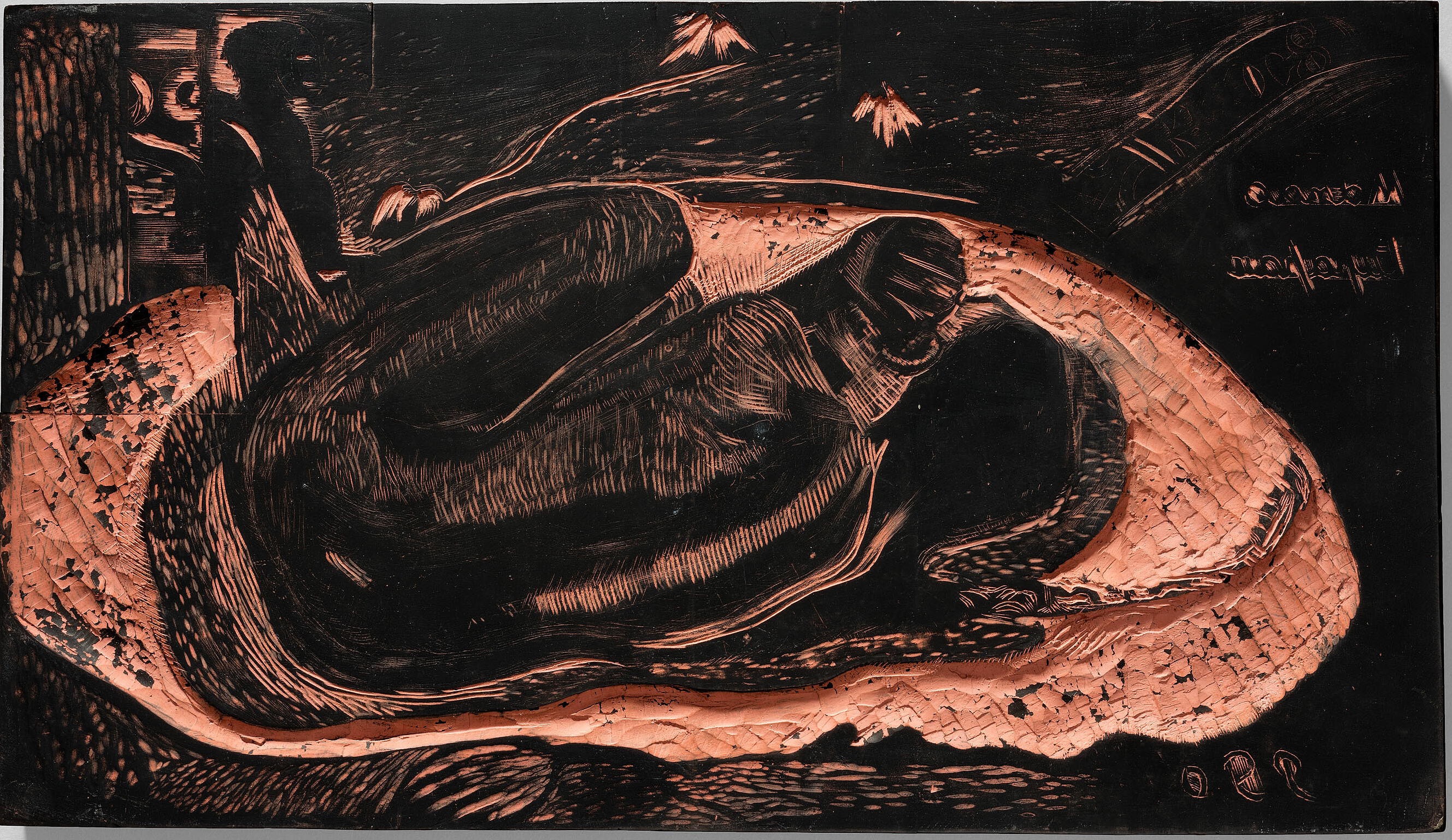
Paul Gauguin: Manao tupapau:
(She Thinks of the Ghost or The Ghost Thinks of Her),
from the Noa Noa Suite (1893/94)
"I'm not quite finished yet."
To speak of a PerfectEnding might be to speak heresy, for the orthodoxy does not usually believe in such things. For them, endings bring opportunities for analysis, for determining what went wrong, to identify root causes, and to inflict judgement, all for the purpose of pursuing the ultimate unachievable objective: continuous improvement. Without such operations, orthodoxies would very quickly go out of business, for without the need for imposing salvation, it's whole operation seems simply fraudulent. If improvement isn't warranted, what's a higher power supposed to do? Could it thrive living in parity with its laity?
In SetTheory, such traditional hierarchies do not hold sway, for they become just another basis for conducting analysis intended to make sense of their presence.
HouseConcert

Adriaen van Ostade: The Concert (1644)
" … another storybook ending."
As unlikely as it seemed for much of the journey there, the long-touted HouseConcert actually happened. It even arrived a little ahead of the schedule requirement, which I'd imagined to be before I'd reached the end of the current seasonal quarter, before the upcoming Solstice. The right people showed up, too, precisely the proper cast which could not have been improved by the concerted efforts of even an army of over-experienced talent scouts. The light supper was very well received. It just seemed such a freedom to invite folks into The Villa, whatever the pretext. Delivering this SetList of songs seemed an embellishment atop what would have qualified as a very decent holiday gathering regardless.
I'd set the stage, such as it was, along the recently refurbished front window seat, directly in front of the massive front window, which The Muse had decorated with multicolored Christmas lights.
FinishingTouched
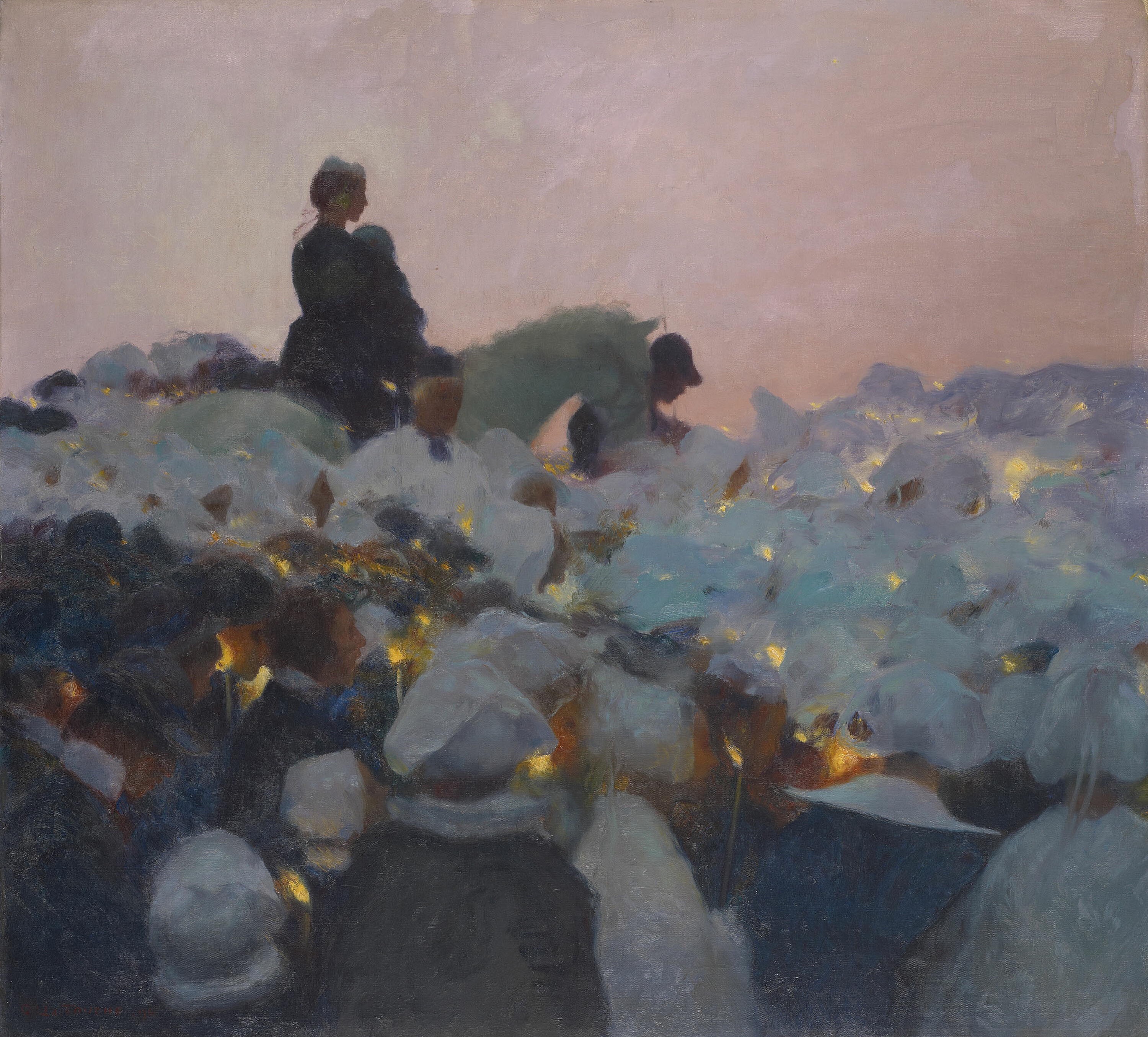
Gaston La Touche: Pardon in Brittany (1896)
A "Pardon" is a Breton form of penitential pilgrimage
conducted at twilight with candles.
"What's inevitably started in innocence
must perhaps necessarily end in gratitude."
Those of us instructed to 'start with the end in mind,' eventually find ourselves going out of our minds since the end always shows up differently than originally imagined. These projections must always originate hopelessly out of that future context, which carries subtleties impossible to imagine beforehand. I suppose this injunction's real intention was never to enable anyone to envision any future, but to serve instead as motivation or inspiration, just to get the imaginer moving toward something, however unlikely that something might be to ever actually manifest. As a result, people often experience endings as bait and switch operations, where what was promised never seems to have been delivered. Success sometimes feels more like a failure.
My almost three month preparation for my house concert carries all the usual vestiges, for it was an initiative no more than normally blessed.
Patter

Albrecht Dürer: The Monstrous Sow of Landser (1496)
"The breathtaking's almost always worth taking the risk."
If my years as a performer taught me anything, they taught me the necessity of Patter and also of the absurdity of preparing Patter beforehand. Proper Patter, my experience taught me, should be impromptu, off the cuff, unscripted. The Patter of which I speak comes before and between the songs, the introductions and reflections that serve as a sort of stage punctuation in the performance conversation. I know that the old vaudeville performers scripted every second of their stage time. Us veterans of coffeehouse stages and small college venues did not, or learned not to. We sought a more authentic presence on stage and did not seriously consider ourselves to be performing, certainly not acting a part, or so we would have insisted at the time. We all were, of course, trying hard to successfully channel whomever we wished to be like, so that we would be liked. Many were bad Dylans. I, myself, leaned more toward the awful Donovan persona, though I was serious about aspiring for authenticity.
What does the term Authentic Performer even mean?
Winnowing
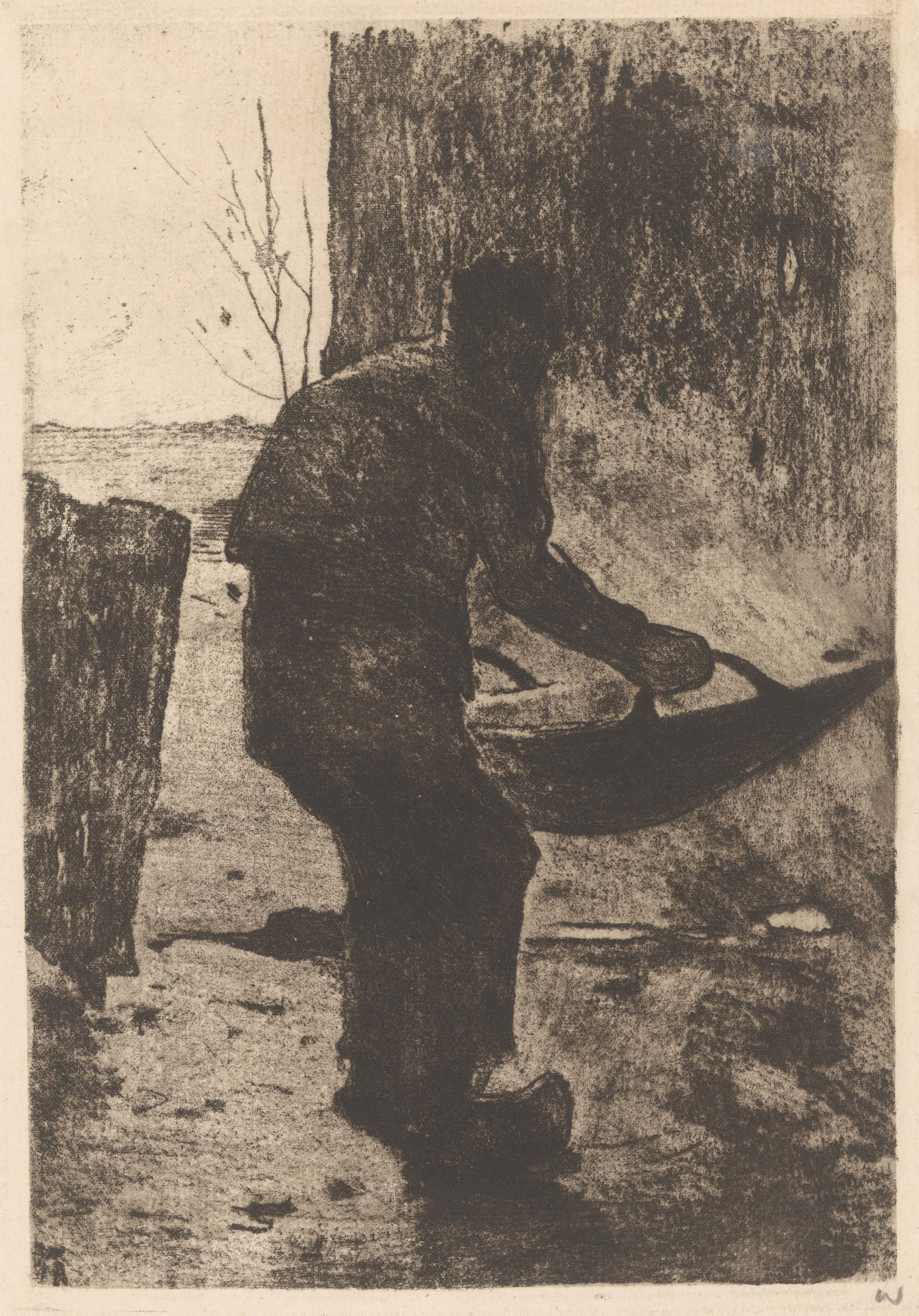
Willem Witsen: Man die aan het wannen is
[Man Winnowing] (c. 1888)
"Winnowing serves as the final embellishment."
Any efficiency expert—probably even any efficiency apprentice—would tell you that this amounts to perhaps the least efficient means to accomplish anything: Over prepare to under deliver, yet this phrase precisely describes the proper method for producing a set of songs. One defers the LifeboatDrill decisions until very nearly the ending, thereby ensuring that more than twice the number of songs actually performed get rehearsed, and not half-assed rehearsed, either. Each must have been considered a genuine contender and even the more difficult ones should have been painstakingly practiced, even unto and beyond great frustration. The list, too, should have properly been re-ordered several times as if the set might last almost ninety minutes, just as if our earnest performer could last a full ninety minutes, which he probably can't.
But performer capability probably sits beside this point.
SittingOnTop
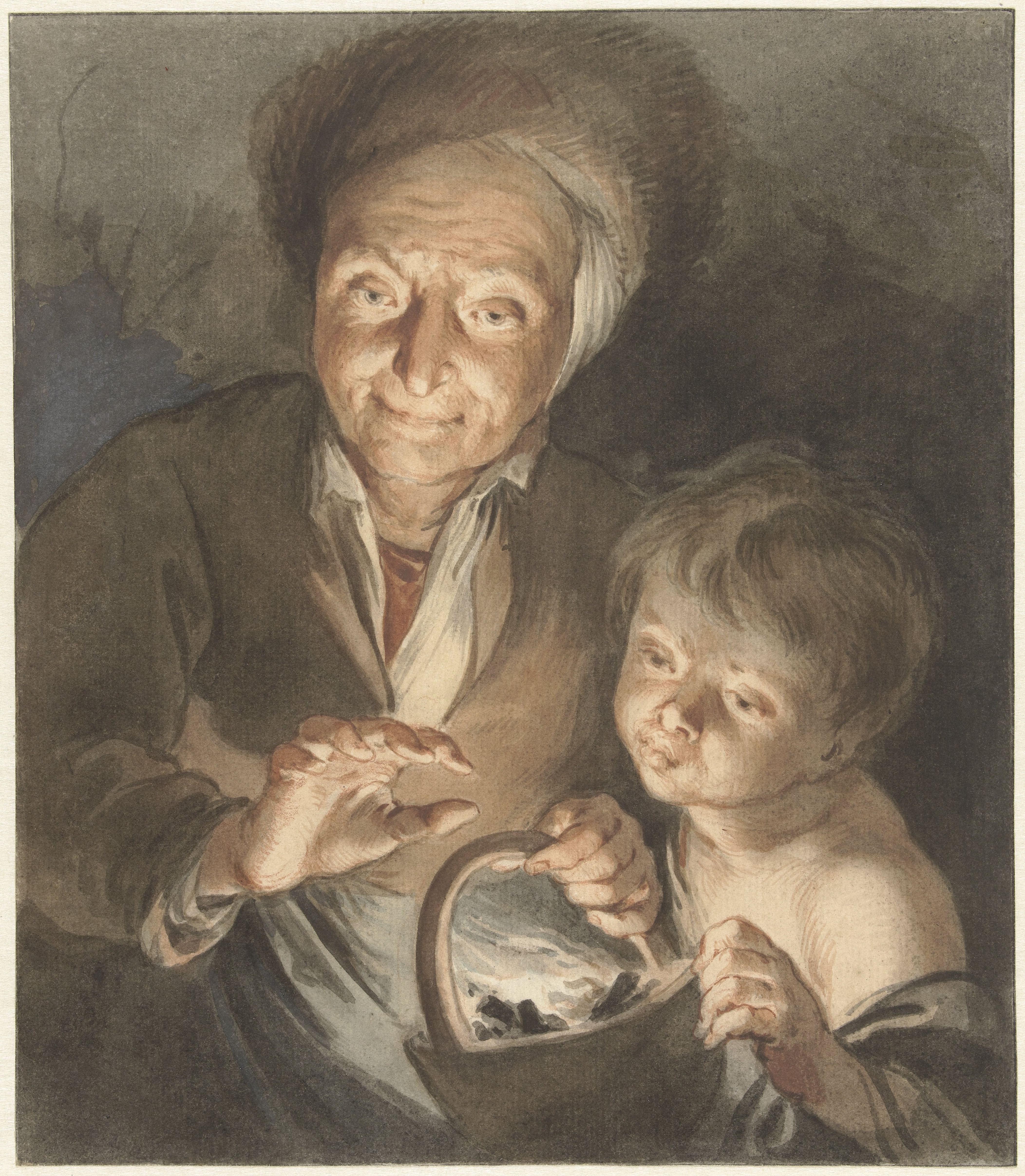
Jacob de Wit, after Peter Paul Rubens:
Oude vrouw met kind en vuurtest
[Old woman with Child and Fire Test] (1734)
"There might not be any better feeling …"
I wrote most of my songs in the Key of D, both because chords in D seemed easier to play and also because its notes fell comfortably within my singing voice's range. I've noticed that many songwriter/performers write exclusively within a single key. Our recently departed and dearly beloved Nanci Griffith also wrote and performed everything in D, so I must be in good company. This choice can produce similar songs, ones only narrowly differentiated from each other, as if every one was the same one all over again, producing a Groundhog Day catalogue like Bruce Springsteen or Tommy James and the Shondells. Fans don't care that they're fed the same supper every night. They are rarely gourmets and, like my cats, tend to reject any supper that's not instantly familiar. Still, the performer might notice and try to stage songs so as to minimize this same-old effect; vary a bit.
The venerable old Key of D no longer proves one my singing range can easily reach.
Convergering

Artist unknown [Japan], Fukusa [Gift Cover] (circa 1801–1900)
" … The Muse departs those premises for good …"
As we pulled The Schooner into the Cancer Center parking lot, the radio started playing Leroy Anderson's arraignment of Sleigh Ride, the only absolutely essential holiday song, complete with wood block hoof pounding, slapstick, and full orchestration. The Muse commenced to shake and jiggle in the seat beside me. I asked what was happening and she replied that she was channeling when she played percussion with the Groton, SD high school band. "I'm shaking sleigh bells," she said, "and whipping the slapstick." Our reverie resolved into tears, and we held hands there while weeping in recognition that this infusion would be the final one in The Muse's months-long sleigh ride through CancerLand.
The oncologist had little more to offer.
LifeboatDrill
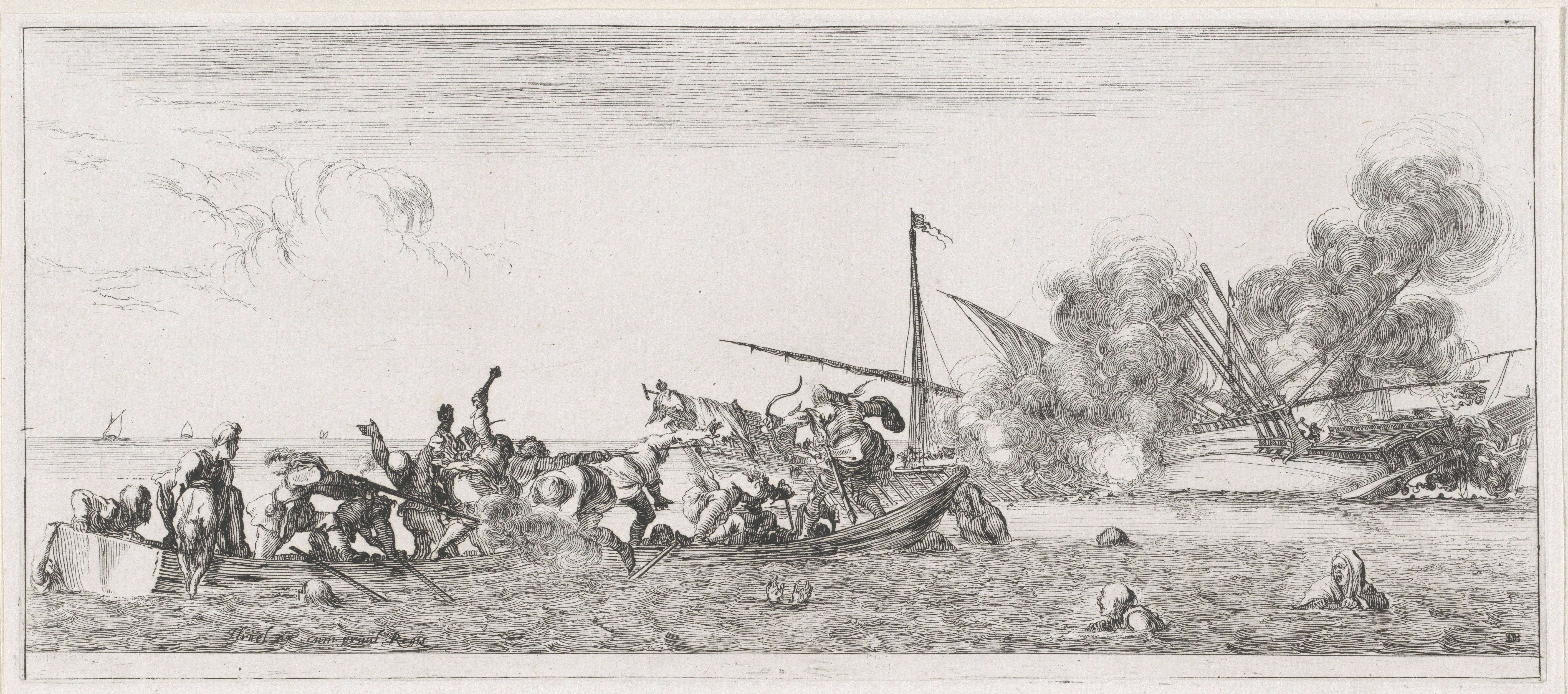
Stefano della Bella:
Mannen in een reddingsboot [Men In Lifeboat]
(Undated- circa 1620-64)
" … nobody intended or wanted to do anyone any damage …"
As consultants, The Muse and I often employed experiential exercises to help our clients gain insights. These amounted to what appeared to be silly little games, though they usually managed to help the client gain traction against some difficulty. We were extremely careful with our game design, though, as we came to understand that these silly little games could leave lasting, even damaging impressions. We always avoided introducing any game which might resemble what we called LifeBoatDrills, those games where a group was forced to choose to vote one or more of its members "off the island," for these can spark real trauma and produce permanent ill feelings, more harm than good. Curiously, this design seems the most common one employed by what has been strangely labeled "reality television," since reality only very rarely if ever actually delivers these sorts of dilemmas. Those who practice LifeBoatDrills probably practice for conditions they will never encounter in the real world or they produce the sorts of experiences nobody ever really wants, probably both. A master of the LifeBoatDrill seems the sorriest master of all.
My long-anticipated house concert, though, seems to have morphed into somewhat of a LifeBoatDrill.
Newing

Paul Gauguin: Jean René Gauguin (1881)
"Not a slave to precedent nor an idiot to improvement."
For me, nothing seems sadder than a tribute band, one dedicated to reliving some heyday on stage. I respect original work, but seeing a late middle-aged troubadour replay their pubescent angst on a stage seems just as sad as Lawrence Welk's orchestra seemed in their later days: dated and then some, unappreciable. Their easy mastery no longer resembles talent or skill, but clearly came as the result of ad nauseam repetition. It was always a wonder that those band members could stay awake through the chorus of most of their tunes because they knew their parts too well to produce a credible performance, which must seem like discovery to really work. They seemed to most need some strategy to just let bygones become bygones. Their performances most reminded their audiences of the absolute the necessity of retirement.
I carry vestiges of these feelings about performing my own compositions, though I have not been vainly repeating the same old songs for generations.
UndressedRehearsals

Unknown Artist, Italian, 17th century:
Juno Commanding Aeolus to Release the Winds (Not dated)
" … all about believing self-deception …"
Practicing slowly morphs into rehearsals as the performance date nears. Practice focused upon bare mechanics while rehearsals include some stagecraft. A performer might scrutinize camera angles, hoping to expose their best profile and, of course, cloak the more unflattering perspectives. Beginnings and endings become more deliberate and the performer actively projects into the ever nearer future. Knowing the performance allows no do-overs, he pushes each tune to conclusion, no longer so quick to stop and repeat a flubbed phrase. He might even gain time consciousness, a terrible addition. What once was timeless becomes time bound as what was once lost slowly gets found again.
The neck of the guitar becomes less restrictive as recent familiarity increases, the product of repetition as well as rediscovery.
SoundCheck

Jacob van der Heyden:
Sound, plate two from The Five Senses
(Not Dated: Artist's working dates 1593–1645)
" … success finally seemed within reasonable reach!"
Sound became the most difficult element of my effort to prepare for my house concert. I'd managed to dredge up lyrics and mostly even found the voice to sing them, transposing one song into a more workable range, but getting the sound through my microphone and guitar pick-up bedeviled me, increasingly frustrating my efforts. The slow realization that the house concert would need to be in part broadcast only increased processed sound's importance. If it wasn't my microphone troubling me, it was my studio headphones. I swear that I will never grow entirely accustomed to trailing cables behind me. They leave me feeling like a prisoner, restricted to only a scant few feet of movement whenever I'm plugged in.
I was on a Zoom® call with my old friend Franklin yesterday and had decided to plug into my sound board to give it a test with a knowledgable listener on the other end.
Sequence
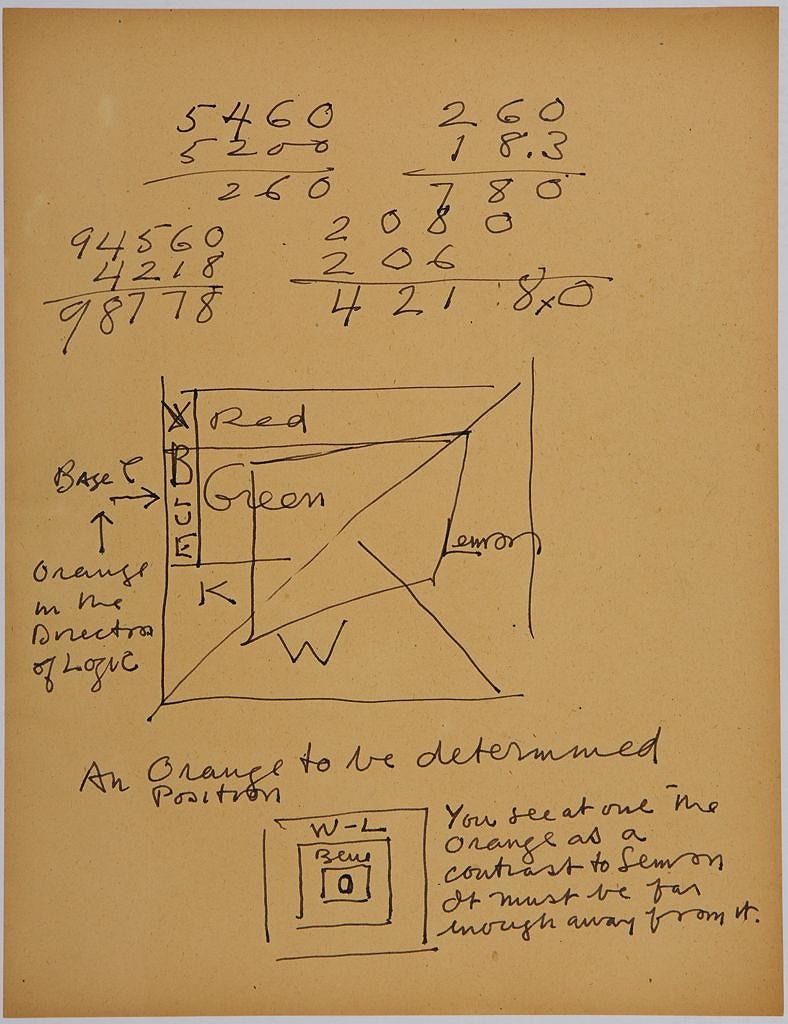
Stuart Davis:
Art Theory Text with Color Sequence Diagram (1951)
"Who's on first? …"
I hold the utterly irrational belief that natural orders exist in both nature and in the works of man, even mine. For instance, I imagine myself ordering the songs in my SetList in such a way as to maximize their impact. I imagine this without for a second having access to what might constitute impact from my perspective or from anyone else's. I might know after I've performed a set, but can only imagine after that natural order beforehand, and even if a song order works, I will have no way of verifying that the order constitutes the natural one or was in any way superior to any other. I must, it seems, create and then manage to believe in a layered fiction which might somehow reinforce itself, bringing resolution. I am today attempting to properly order my SetList songs, a provably impossible undertaking.
Sequence seems like one of those meta conditions not obvious at first glance.
Invitation

Antique Christmas Card
from The New York City Public Library's digital collection
" … who would even agree to attend … ?"
This week, I need to send out the invitations for my SetList performance. I've long planned to deliver this performance in The Villa, with me seated before the grand front window with bookshelves on either side. I've imagined my audience arrayed back into the living room, with perhaps a couple of dozen easily fitting into that space with furniture rearranged and extra chairs. A few might choose to stand. I'd keep the SetList short enough so that nobody would get too fidgety before I finished. We'd drink some wine before and more after as well as enjoy a light mobile supper. It would be a celebration as well as the conclusion of this series, my appreciation for the attention I've received through the lengthy preparation. It would also serve as an introduction of sorts, a first exposure for most present to my semi-secret songwriter background, who I once was as well as who I always was beneath my facade, and who I'll also always thereafter be. I planned it as a curious kind of coming out party.
In the two years and nine months since This Damned Pandemic locked us down, we've rarely hosted any of our usual gatherings.
Seconds

Edward Penfield:
Will You Help the Women of France? (1917)
Printed by W. F. Powers Company Lithographers
published by United States Food Administration
"We're still praying and waiting …"
Ten days after Thanksgiving, Tetrazzini season settles in for a short visit. The turkey's tailpiece remains, the so-called Bishop's Nose, along with an odd wing and a piece of that greasy meat that once covered ribs; little else besides bone. These pieces, proven poor sandwich material, ache to become stock, their last chance to become anything useful on their way out of this world. Half the leftover meat disappeared over Thanksgiving night at the hands of what I suspect to have been a raccoon sauntering through our walk-out refrigerator, also known as the back deck. I'd used Zip-lock® bags to secure the goodies and the raccoon apparently carried a switchblade—we all know they all do— which made short work of my weak defense. The remaining bag contained the more marginal pieces, greasy and barely edible even when amply disguised with The Muse's housemade cranberry sauce, mayonnaise, and thick slices of Swiss cheese. I, too, was aching to render that meat into stock.
The Muse continues recovering from her radiation treatments.
Justifying

Friedrich Amerling: The Young Eastern Woman (1838)
"The cost/benefit analysis of every artistic endeavor,
SetTheory concludes, produces only The Null Set …"
In my apparent insistence to at least attempt to overthink every damned thing I engage in, I stumbled upon the poisonous question: Why? Why seems naked standing alone. It seems to need a question mark attached to its backside, as if to conceal something, and why(?) probably has much to conceal. Its unceasing attempts to justify come as close to original sin as anything anyone could possibly engage in, primarily because it asks a fundamentally unanswerable question. Nothing anyone might muster in response could possibly satisfy it. It sparks excuses, sure, and often long-winded explanations which ultimately fail to explain to anyone's full satisfaction. It amounts to distraction, focusing attention away from essence and toward insistence, like any "good" advertisement attempts. Its likely purpose seems to be to sidetrack focus, to undermine true inevitably unspeakable purpose, and to encourage a commercial mediocrity upon activities which hardly deserve this. As I said above, Why(?) almost always proves poisonous.
In business school I learned how to concoct cost/benefit analysis, this to guide what was labeled decision-making.
ClawingForward
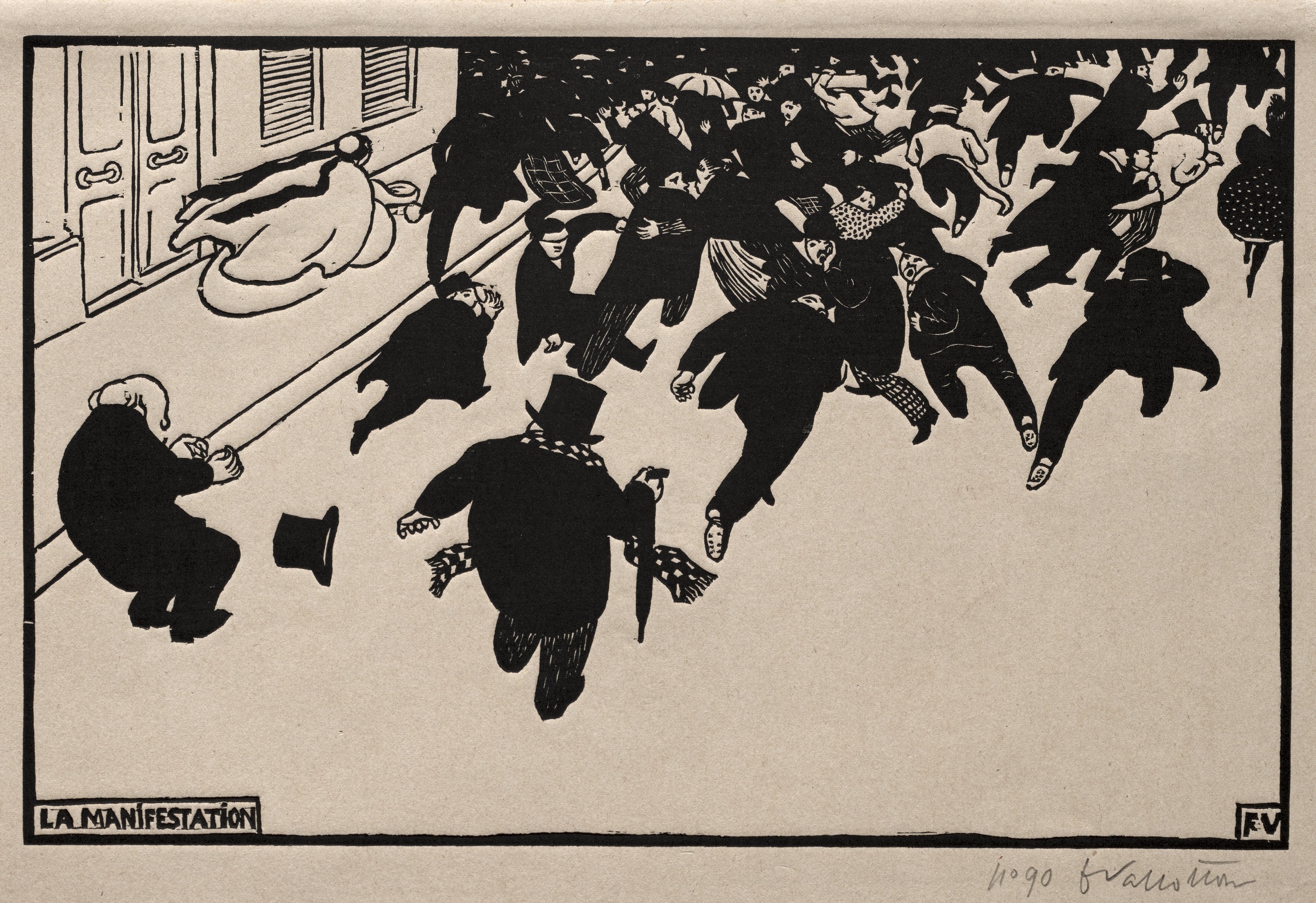
Félix Vallotton: The Protest (1893)
"I try to not make a habit of such behavior."
Each setback provides a fresh premise for ClawingForward, a new dedication test trying to determine the depth of commitment behind the pursuit. I can always forfeit whatever I've already invested and walk away, hoping nobody will notice that I surrendered. Honor, or some emotion very much like it, encourages me to continue anyway, to perhaps even courageously overcome whatever barrier I've encountered. My response more often comes from embarrassment than bravery. I cannot quite face what it might mean if I cannot overcome this encumbrance, so I continue the struggle. I sometimes even succeed, even though trying in no way guarantees any outcome. I fancy myself tenacious when I'm probably just stubborn, but hitting a wall usually incites me into action, and often into investigating some new direction, anything to maintain accustomed momentum.
I read the freaking owner's manual, though the submission was, indeed, painful.
ReSettingBackwards
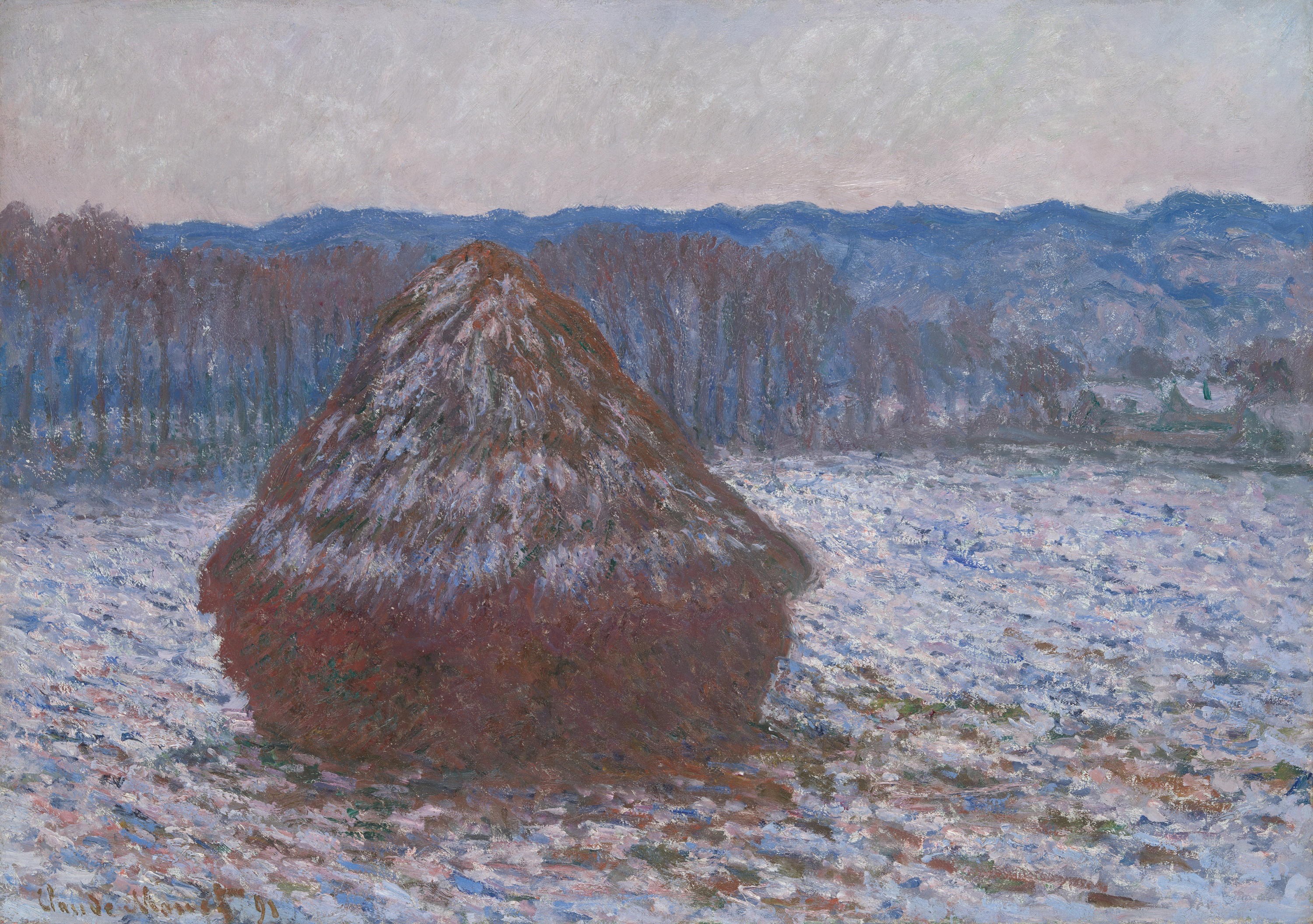
Claude Monet: Stack of Wheat (1890/91)
"Wrong-footed, I sprint for the finish line."
After a week of reporting solid progress, my SetTheory efforts finally hit their wall (again.) The first principle of all forward momentum mentions this wall as a certainty, an inevitability, not a possible encounter but an unavoidable one. This wall generally appears early in an effort, as the usual notional initiation notices that its context differs from what was earlier imagined and planned upon. The experience always feel deflating, as if some cruel mistake had been made against the proceedings. Most efforts manage to recover, albeit almost always on different terms than originally imagined. The possible takes over from the original imaginal intentions and the effort resumes, and often in a different direction. Initial notions of end results almost always amount to fantasies. The quality of leadership usually devolves into the acceptance of some closer semblance of reality over the originally motivating fantasy. The Wall reigns eternal, though. One can choose to go over, around, or through it, but ignoring it never works for long.
Ignoring it almost always seems the preferable alternative when it first appears.
Fining

Hans Weiditz (II) (anonymous:)
Mannen bij een proeverij [Men at a Tasting] (1514-32)
"I paint my face with well-practiced authenticity."
The mirror image of the project-initiating Milling Around Period appears nearer the end of the effort. It amounts to much dusting and polishing, sequencing and clarifying, none of it strictly necessary but all of it nonetheless useful. It might even qualify as meaningless work, but since ninety percent of all work apparently qualifies as meaningless, this classification alone provides no excuse for avoiding engaging in it. Besides, it feels so danged satisfying. Most of the earlier stress and anxiety have by then been leached out. What deadlines remain carry little threat. I feel prepared if not quite prepared enough. I am Fining.
Once a wine or a beer has finished fermenting, it's done for most intents and purposes, save one.
EmotionalSupportAnimal

John Edward Gray:
Dr. Hamilton's Paradoxurus, Paradoxurus Hamiltonii.
From The Living Animal in the Surry Zoological Gardens
(circa 1830-34)
"I find my redemption lurking in the far back corner of my original intention."
The Muse complains when I refer to myself as her Emotional Support Animal. When I asked after her protest, she said that she didn't think of me as an animal. "Am I vegetable, then, or mineral?" She noted that my rock head strongly suggests mineral. My purpose in declaring myself her Emotional Support Animal had more to do with keeping the most serious possible business just as light as possible. My intentions were serious but also bordered upon unspeakable. I wanted to declare that I would be there for her as she went through her cancer treatment, no babying intended. Emotional Support Animals have become troublesome, as many have seized the opportunity to declare their pet as such and thereby gain the privilege of hauling them onto airplanes without paying fares. And it's not just been dogs and cats, but every manner of critter to the point where airlines and the FAA have had to make rules ever stricter. I think it was the alligator or perhaps the ostrich that nudged the practice into untenable territory. Now, one needs evidence that the animal serves as essential emotional support, a level of proof that I suspect should border the impossible to show. Emotional support rarely seems critical.
The Muse probably didn't need the support I offered, but I'd felt it important to offer it nonetheless.
Transcending
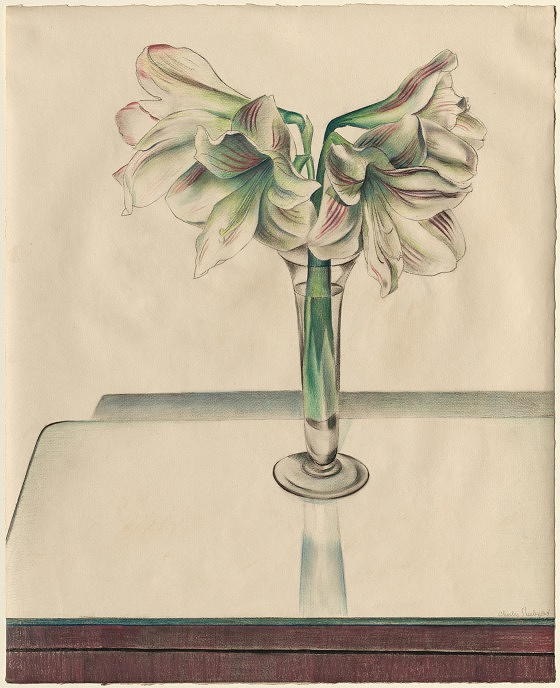
Charles Sheeler: Amaryllis (1924)
"I can see a transparent shadow of myself …"
Practicing seems like a primitive form of what this performer intends when he picks up his instrument. Initially, I struggle to just remember the progressions and to propel myself to the end of each piece, but later, after some considerable time spent immersing myself into these mysteries, my practice shifts. After, it becomes easier if not precisely easy, more expression than re-creation. I often catch myself improvising then, as if I no longer seek to resurrect or recreate, but to manifest a feeling for which the original words and music were always mere indexes, means to access a sense more than the purpose of practicing or an end unto themselves. This after space I enter amounts to Transcending, I guess. It certainly feels like a religious experience, if that description doesn't put too orthodox a spin on it. I leave refreshed and slightly light-headed, eyes clear and voice phlegm-less for a welcomed change. I feel high, as though I'm floating slightly above my former existence, witness to my experience more than mere actor.
I'm seeing that the purpose of this SetTheory experience was less about resurrecting my songbook than about rediscovering Transcending.
Spectacular

Henri-Edmond Cross: The Pink Cloud (c. 1896)
"Her forbearance might well be remembered …"
The Muse's oncologist reported that her "numbers are Spectacular," an uncharacteristic characterization from any practicing physician. They're professionally more restrained, less effusive. On good days, they might allow themselves to express guarded optimism and, always, unshakable support, but they only rarely enter the unconditional superlative realm. I ask a follow-up question and receive a more sobering perspective in return. I note that her tumor had become invisible on the last scan we saw. He cautioned us to take such visual evidence, however seemingly reassuring, with a grain of salt. He explained that this cancer's cells remain unbelievably tiny, that we can only visually verify their presence when they're present in the billions. A few hundred million of them cannot be seen by even the most sophisticated scanning technology. Visual verification's virtually impossible. We're poking sticks into darkness, he explains.
I thanked him for blunting my enthusiasm, and I meant it.
FinalPrep

Jacques Callot: Camping Place of the Gypsies:
The Preparation of the Feast
(Artist's working dates 1612–1635)
"I figure I can finish FinalPrep in the final fifteen minutes before I take the stage."
The National Weather Service predicted snow by early evening and the sky had already started spitting fine ice by the time I returned from an errand across town. I wanted to finish cleaning up the latest leaf fall before this storm hit, since the weather service also predicted a week of very cold temperatures with intermittent snowfall providing no later opportunity to complete the last of the Autumn chores before an early Winter settled in. I faced the choice of working through the icy rain or just accepting that I would fall short of my aspirations this season. I slipped into my overalls and stepped out into the weather. As usual, once imbedded within it, the drizzle seemed less ominous. I focused upon quickly removing those leaves and soon found myself finished. Then came the piddling around time.
The Muse swears that she can complete a month of unfinished business in the final few hours before she leaves on an extended trip.
MakingPerfect

Vincent van Gogh: Self-Portrait (1887)
"Will we poison ourselves with critical mediocrity or with generous perfection?"
I ordinarily cannot countenance mention of perfection, for as the owner of both an aging home and body, I see little day-to-day evidence of its existence. I'd come to think of perfection as a poisonous notion. As an objective it seemed to guarantee frustration and failure. As a representation, it seemed falsely overbearing, a transparently misleading characterization. Few experiences greater frustrated me than a shopgirl mindlessly parroting everything I'd mention with a "Perfect!" exclamation. She'd ask me if she could help me with anything. I'd decline her offer and she'd declare our encounter somehow "Perfect!" I'd pray that she might somehow pull her faux enthusiasm to the curb and join the rest of us down here on the surface of the planet Earth rather than continue inhabiting her alien-seeming stratosphere above. I found her realm annoying in the extremis.
But I think I might have groused a tad too much.
PlayForWork
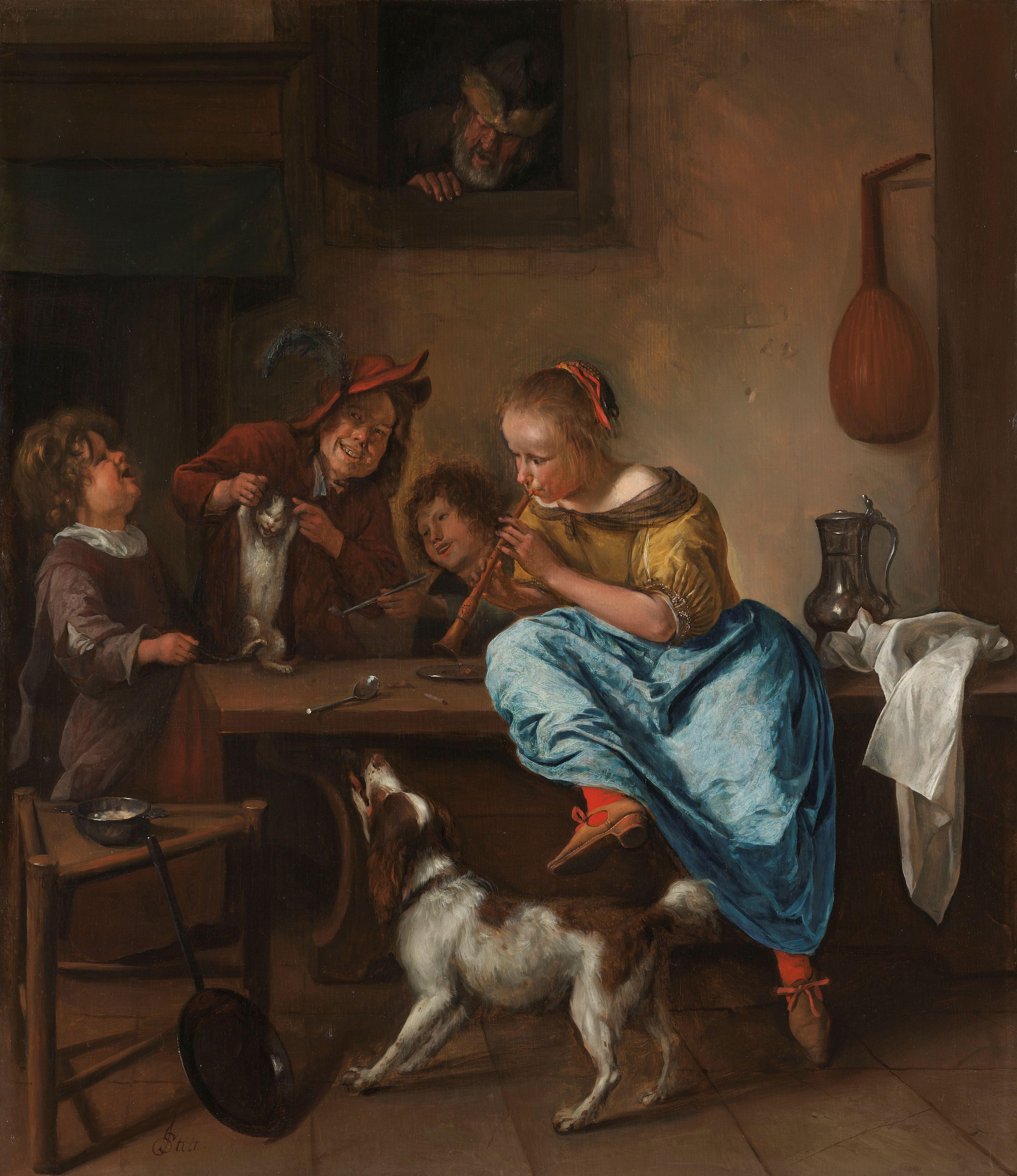
Jan Havicksz. Steen:
Children Teaching a Cat to Dance,
Known as ‘The Dancing Lesson’ (1660 - 1679)
"Maybe mastery makes fun of everything."
Early on, I imprinted on the idea that work really should be play. I sensed that the term work mischaracterized its own possibility, creating a false and disastrous dichotomy. Work might not necessarily be the opposite of play, but the very highest example of it. Mischaracterize that high-order play as work, and people might primarily engage in it to earn time away. Folks might day-dream of retirement rather than reveling in the very embodiment of what they might have been dreaming to achieve. In this way, the carrot became the stick and people started consenting to investing their time in productive but meaningless activities. Some even agreed to become professionals and a few of those consented to become responsible, and before anyone knew it, adulthood had gone to Hell without even the comforting benefit of handbaskets.
When work becomes play, it gets easier to get through the day.
Begetting
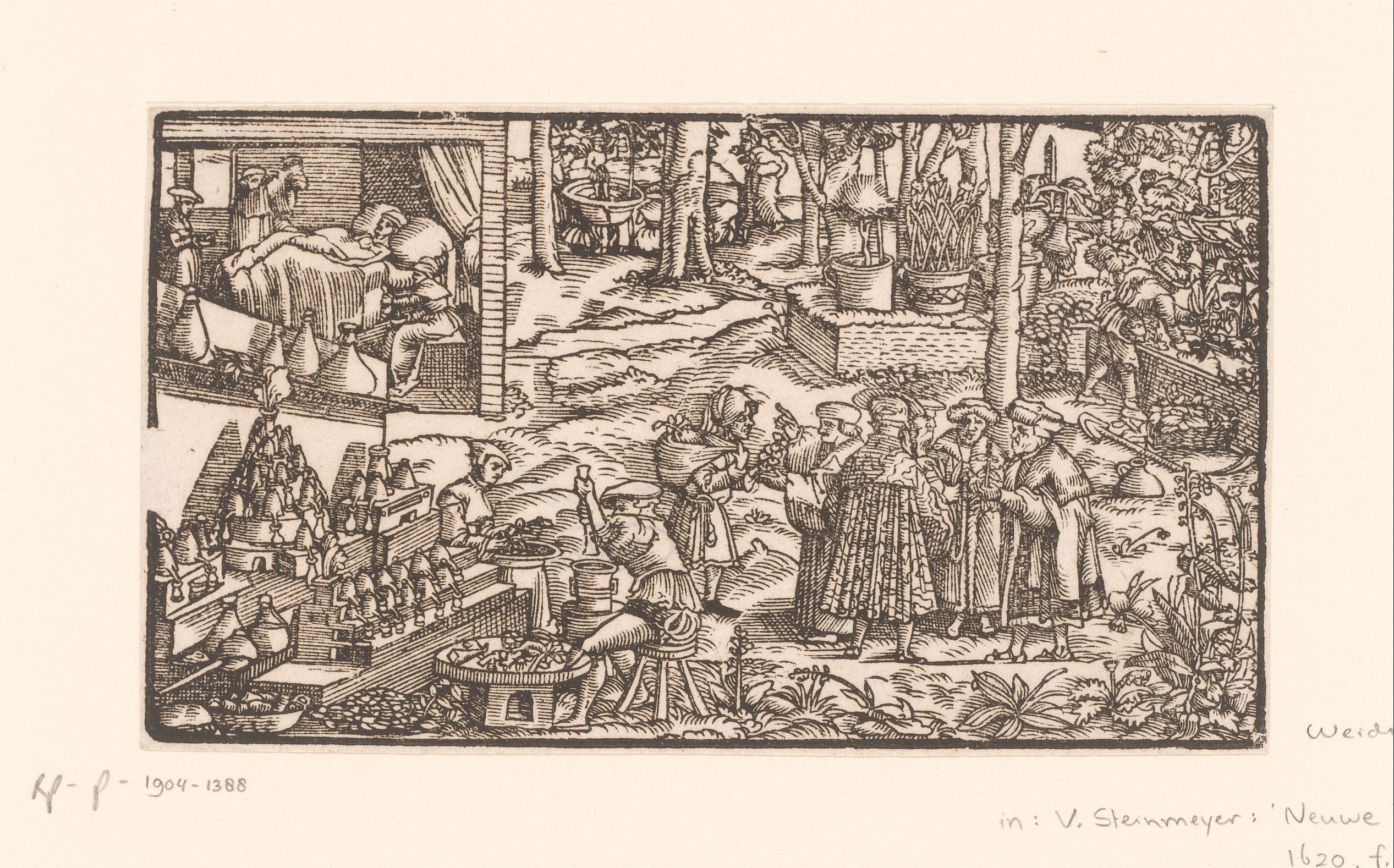
Hans Weiditz (II) (possibly):
Het produceren van wijn en andere medicinale dranken
(Producing wine and other medicinal drinks) (1620)
"… continued Begetting regardless …"
I felt shocked when The GrandOther, sitting at our Thanksgiving table, was the one insisting that we each express our thanks for something. We're no Norman Rockwell image of any holiday family, not even piss poor Presbyterians when it comes to the iconic rituals of any holiday table, yet there was The Other, the youngest at the table, insisting that tradition be acknowledged and performed. Lord (or somebody) knew that we had plenty to feel thankful for, even though this has been a difficult year. I heard myself insist that the hardest years seem to produce the greater volume of gratitude, and not just that they're over. As a blessings generator, hard times just seem better at Begetting blessings, an apparent paradox often lost on those trudging on their knees through the harder of the hardest times. Like with all religious convictions, I guess, the blessings emerge later as reward or punishment, their eventual existence a matter of faith until they manifest.
The question comes, then, how one might reliably induce gratitudes.
PlagueWinter

Arthur Wesley Dow: Marsh Creek (c. 1905)
"The future sure seems lonely."
As we enter the third successive PlagueWinter, I find little evidence that I've fully incorporated any learning from the experience. I still pine and plan as if this disease were little more than a passing inconvenience rather than endemic, as it surely has become. I'm just starting to understand that this disease will most likely haunt my remaining days here, even if I live for decades. Gratefully, neither The Muse nor I have yet contracted this bug, though her son has been through three bouts of it and has been wrestling with long Covid symptoms for two years, since he started recovering from his first bout. A friend just finally tested negative after an eight day run with his second infection this season, and he took Paxlovid just as soon as he tested positive both times, and had just the week before received his latest booster. He said it was like having a bad cold. Of the ten people who attended his ukulele group, two apparently came already infected and six of the remaining eight tested positive the next day. Covid-19 remains alarmingly infectious, though apparently not nearly as deadly as it once was for many.
I've been dreaming of a 'normal' Christmas season, similar to the ones I used to know.
Permitting

Abraham van Beyeren:
Silver Wine Jug, Ham, and Fruit (c. 1660–66)
"The creative arm wrestles with himself."
The Muse and I decided years ago that we would one day replace the railing that once graced the Villa's front porch roof deck. The old one was destroyed by an enthusiastic—some insist overly-enthusiastic—wisteria, which strangled and ultimately wrestled it to the ground. Our carpenter Joel agreed to perform the deed once we'd resolved the definite tilt the leading edge of that roof had shown over time. The brick pillars supporting that roof were filled with compression fractures, and the roof line's far end had been sinking. The roof supports needed replacing, a massive undertaking involving taking down six tall brick columns and fifty feet of brick foundation wall, repouring foundation, then replacing those columns with concrete, steel, and wood while leveling the roof's leading edge. This work was no superficial paint job, but one which would involve Permitting, that chronically over-worked and misunderstood city department seemingly dedicated to frustrating every intention.
We'd naively presumed that the critical path to completing this transformation would lie along the line of acquiring skilled craftspersons.
Burnishing
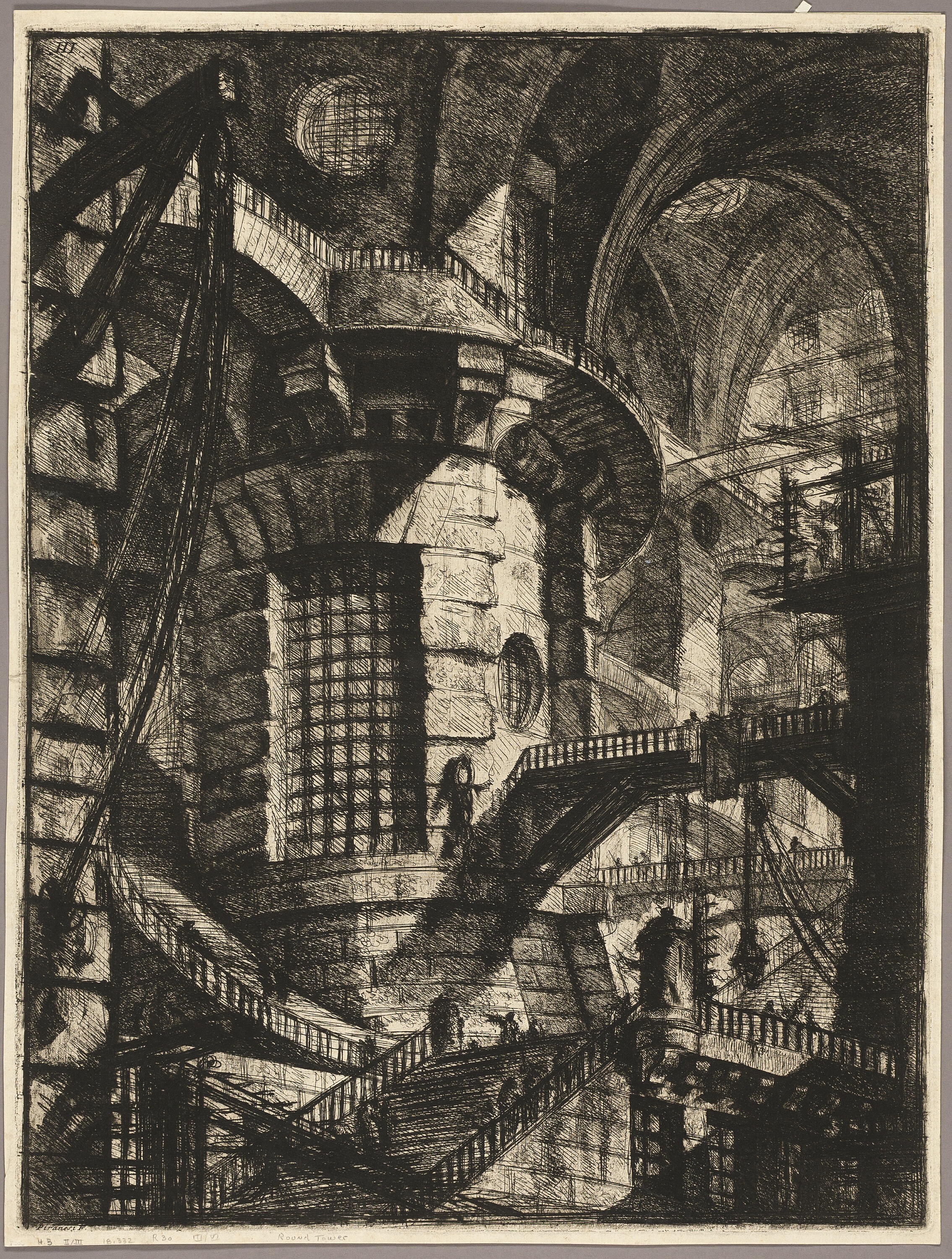
Giovanni Battista Piranesi: The Round Tower,
plate 3 from the second edition of Carceri d’invenzione (Imaginary Prisons)
1750, reworked 1761)
" … each day brings us one day closer …"
Entering her sixth week of cancer treatment, The Muse descended into the worst experiences so far. The week following her final radiation treatment brought by far her body's most extreme reactions. Her neck, which had previously shown some minor evidence of tanning, took to Burnishing in the absence of fresh insults, turning a deep mahogany red and leaving her in intermittent agony. Sleep at times became as difficult as swallowing. Sneezing could prove devastating. Coughing became essentially constant. Food either tasted like nothing or like garbage, and she was hard-pressed to decide which was worse. A few suppers went uneaten, but she could choke down most, if much more slowly and in smaller portions. Oatmeal remained the most reliable meal. She made herself the most marvelous flan, which seemed to mirror the color of her neck and the texture of her throat.
Her sister sent her some THC gummy bears which reliably induce sleep and munchies!
Knotting
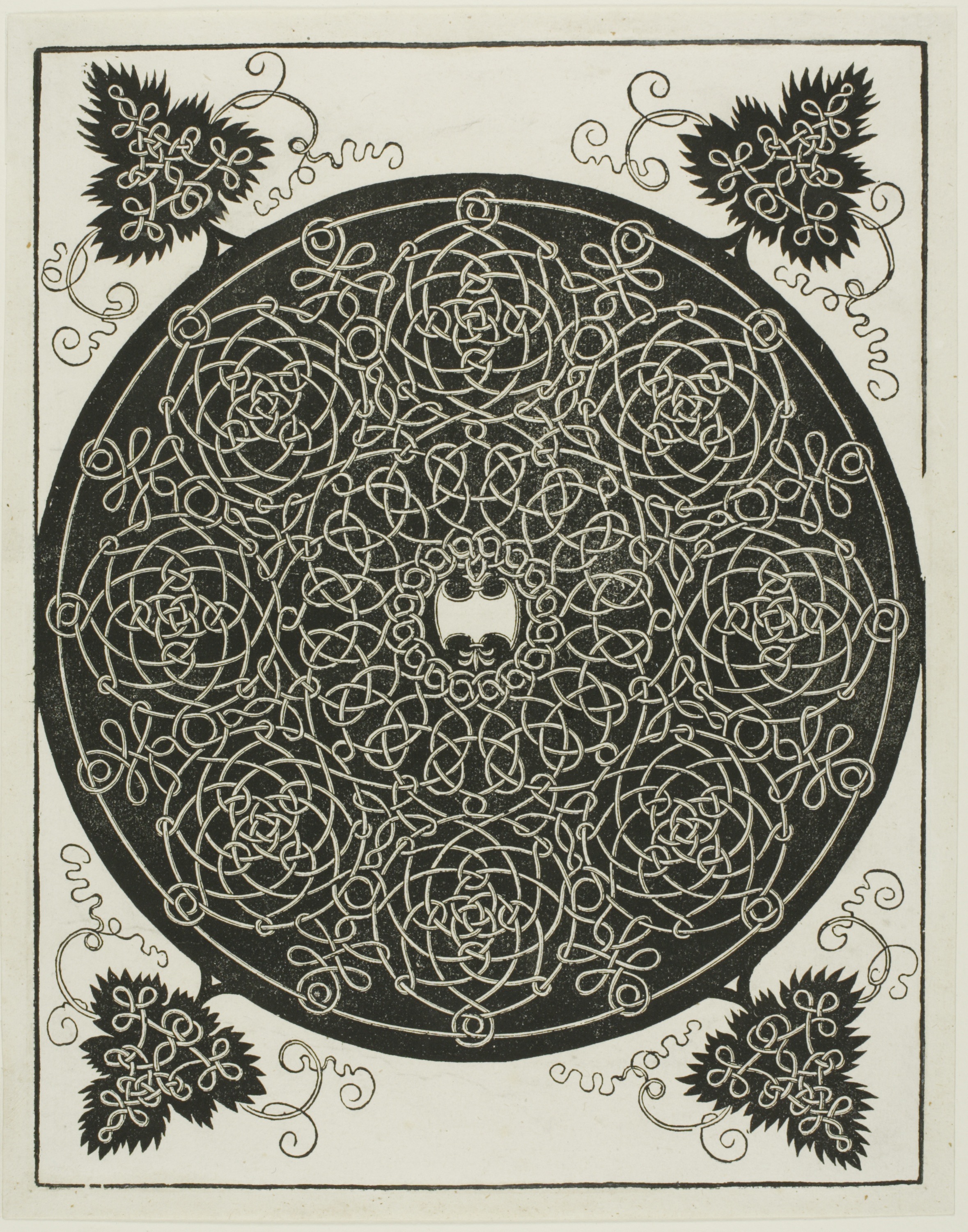
Albrecht Dürer: The Fifth Knot (c. 1507)
" … to grow more familiar with my knots …"
It might be most common to think of one's self as an untier of knots, but I'm thinking just how complicating that characterization inevitably becomes. Those of us guitar players who scrupulously maintain closely-cropped fingernails find ourselves at a natural disadvantage if we consider ourselves untyers. Many others hold no particular interest in solving puzzles, merely finding them frustrating and so best avoided. No, I'm growing to appreciate that I'm naturally more of a knot tyer. My legacy, if I ever deign to have one, should probably be comprised of knots neatly tied, suitable for untying should anyone feel so moved, but otherwise perfectly fine unresolved.
Preparing my SetList songs for public performance, I almost fell into the terrible trap of believing that I would necessarily need to resolve each mystery I encountered when resurrecting every song. …
MakingTheBest
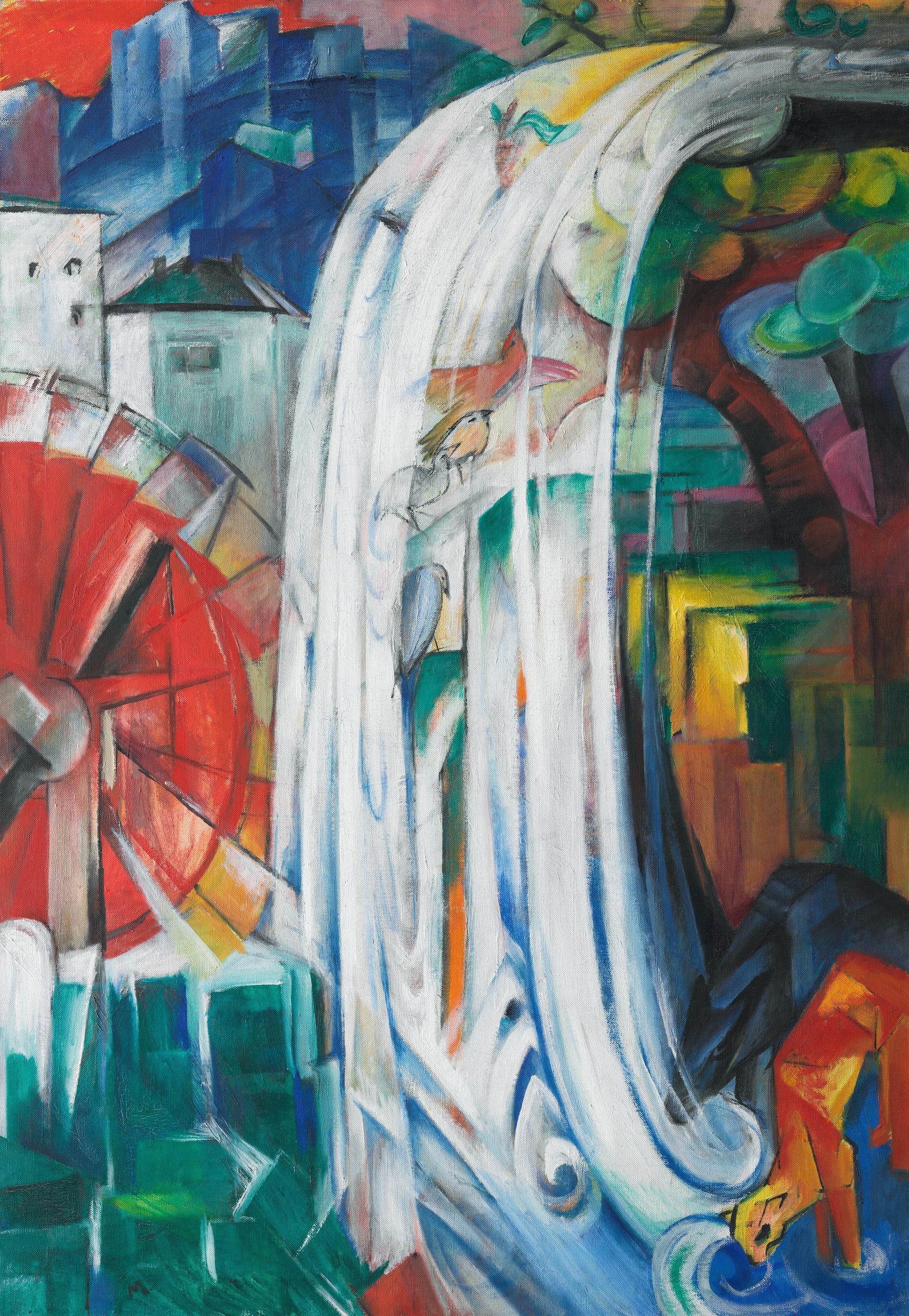
Franz Marc: The Bewitched Mill (1913)
" … once existed forever."
Make The Best
"Make The Best of the curious choices
life brings you.
They won't always rhyme
and they won't always leave a reason behind them,
'cause this is a sloppy opera and a stupid ballet
and if it isn't for the best
at least it is forever."
I always use this song to end my performances.
Innerfacing
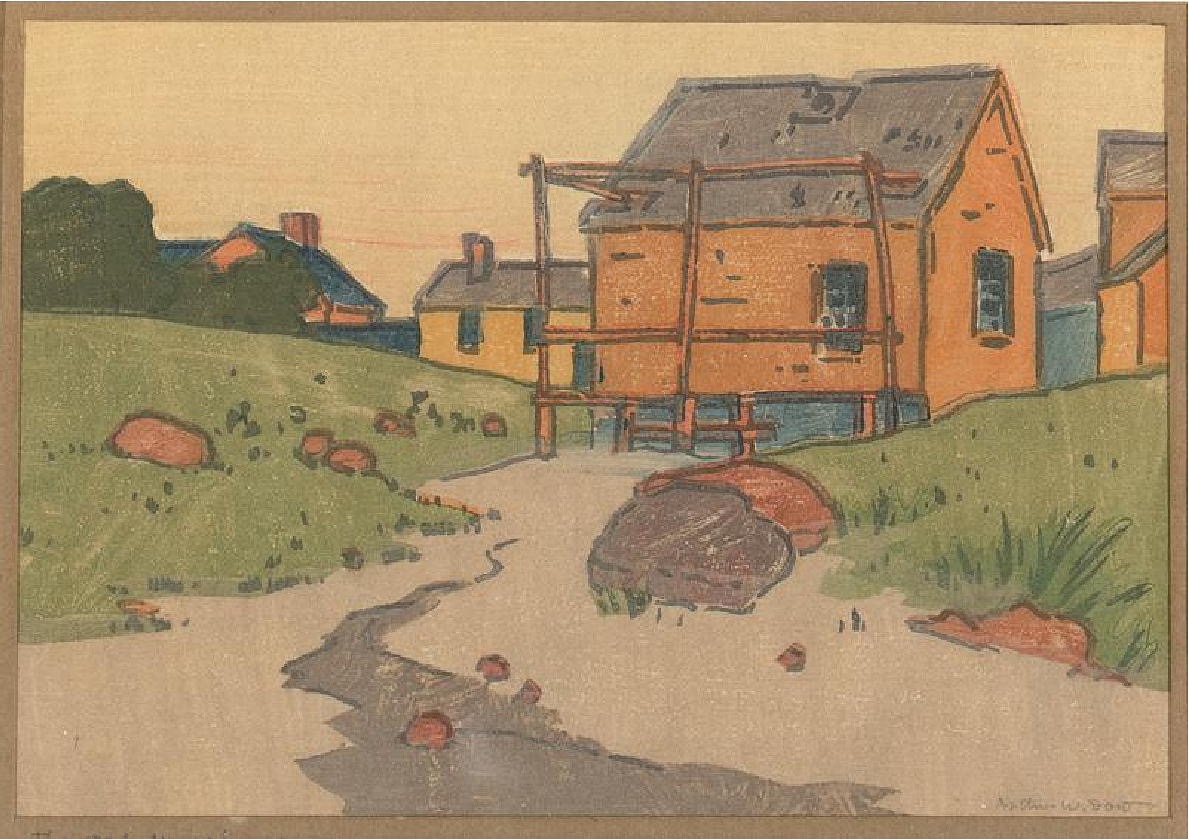
Arthur Wesley Dow: The Clam House (circa 1892)
"This so-far mythical future house concert …"
Much of my effort to resurrect my SetList of songs probably qualifies as inner work. Not to go all nineties on anybody, when the publishing world gorged in The Inner Work of pretty nearly everything, the inner work of performing even my simple tunes proves daunting. The inner world, my inner world, refuses to cleanly translate into outer mediums and contexts. Feelings repeatedly fail to pass the explicit test. Meanings steadfastly remain mysterious. Even hearing what I'm singing proves complicated and seems best amended with microphone, headphones, and a confusing array of software filters.
I've been failing to learn the software through which I filter my voice for twenty-some years and I feel no closer to figuring it out than when I started.
SurfacePrep
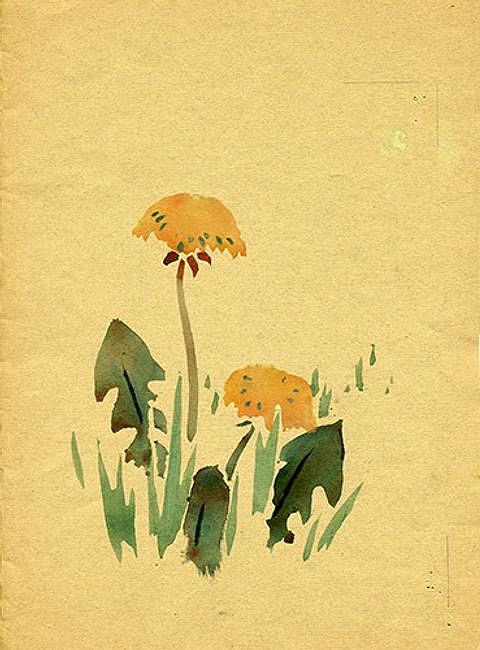
Arthur Wesley Dow, Pencil Proof (early 20th century)
"Great inconvenience can be tolerated to ease the prep."
Yesterday's SetTheory story, SurfaceTension, only introduced a topic key to my navigating through to finally produce my performable SetList. New readers should understand that I'm just shy of two months into an effort to resurrect a set of my own compositions into a performable set of songs such that I might perform a house concert around the upcoming Solstice. I've been introducing here the songs I'm considering including and following my process for preparing, which doesn't always seem very much like a process at all. Yesterday's story reported on the barriers to entry I encounter when I attempt to enter the once-familiar singer/songwriter space. The door does not seem wide open. I bump into encumbrances. I recognize these for what they are, completely normal, but I'm feeling a need to more deeply explain what I'm learning about overcoming these.
Upon closer scrutiny, I perceive some commonality between what I'm experiencing resurrecting my songs and what I came to understand about managing projects, back when I worked as a project management consultant.
SurfaceTension

Vasily Kandinsky: Improvisation No. 30 (Cannons) (1913)
" … results that I still feel certain anyone can see through."
Each fresh task seems to carry a certain SurfaceTension which I must penetrate before I can fully engage. While the act of penetrating that tension might look like I'm engaging, it seems much more tentative than that, as if whatever effort I expend breaking through that barrier doesn't count. Indeed, that work often seems a distraction, an irrelevance. It seems to prevent me from getting started rather than an integral part of starting. I very often find myself stymied by these initiation rituals in precisely the same way that I often cannot determine how to open a package or penetrate the bullet-proof plastic shell covering a new purchase. I cannot open these things with bare hands. Scissors usually prove useless, too. I most often submit these to The Muse for resolution, since she seems to have developed specialized strategies for opening these. I most often prefer to just set them aside as not having been designed for my use. I'm easily discouraged.
I reflect on my academic career, such as it was.
Excusing

Martin Schongauer: Saint Sebastian (c. 1480-1490)
" … everything I accomplished will become roughly equivalent to everything I ever wanted."
Two years and eight months into the Covid-19 pandemic, I've grown expert at Excusing. I understand the limitations that this damned pandemic places upon The Muse and I. I probably understand them too well, for while most of my contemporaries, colleagues, and friends seem to have moved on and back into what now passes for ordinary times, I remain steadfastly tied to wearing my mask, anti-social distancing, and, basically, turning down the opportunity to do much of anything. I'm still not eating out. I find disturbing the prospect of ever flying again. Oh, I also have somehow managed to avoid contracting Covid. In short, I live my life immersed in considerable negative space, informed more by what I refuse to permit myself than in what I grant myself permission to engage.
I some days feel as though I've become a master at Excusing.
Marathons

Arthur Wesley Dow: Crater Lake (1919)
"We have only inadequacy to accompany us through."
As wearying as sports metaphors can get, I might best represent cancer treatment as a sequential series of Marathons, any one of which might well prove challenging and the sum total of which certainly overwhelms. No shortcuts exist. No respites, either. From the initial discovery through the diagnosis process took The Muse three full months. Once treatment started, which began with little respite from the exhausting diagnosing effort, the insults prove unrelenting. Radiation subtlety sears. Immunotherapy infusions invade. No places to hide emerge. It's one hundred percent exposed, day and night, through the treatment period, which is scheduled from the outset: five weeks of radiation at six treatments per week and six immunotherapy infusions, one every other week for eleven weeks. Next, an indeterminate period of recovery where The Muse's body will work to rediscover all the facilities wounded in healing. It's all grueling.
If food tasted decent.
InconviencingMyself
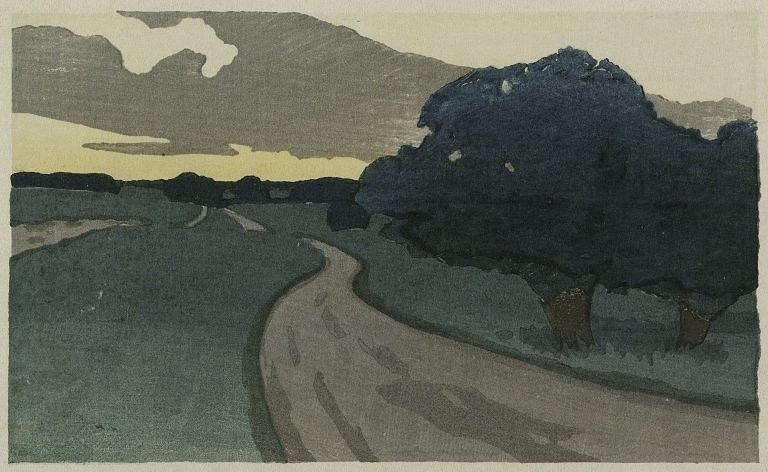
Arthur Wesley Dow:
The Long Road--Argilla Road, Ipswich (1898)
An Inconvenient Time
"It's An Inconvenient Time to cross a line,
An Inconvenient Time to be opening any new cans of worms
'cause me and my sanity have just settled into familiar scenery
and love is the last thing on my mind:
An Inconvenient Time."
I find myself very near the bottom of my tentative SetList.
Rest

Arthur Wesley Dow: Boats at Rest (c. 1895)
" … the tacit component of the effort."
Avant Garde composer John Cage famously insisted that silence comprised the essence of music, that the notes only exist to space the silences. It's easy and seductive to focus solely upon the overt pieces of a composition when preparing to perform it, but its silences significantly contribute to whatever presence it might ultimately induce. Likewise with stories. I once published a story which featured no spaces between the words. Using this technique, I was able to present something on the order of 40% more letters on the page, but while it was certainly possible to read the result, the reading felt tedious and unrewarding. The purpose of writing was never intended to see how efficiently it might employ paper. Hoarders never seem to catch on that much of the satisfaction of owning something comes from the ability to stand a few steps away and admire it. An overstuffed closet might just as well contain nothing.
I sat this morning to begin my daily writing ritual and felt for a fleeting moment as if I'd been there before.
Noughting
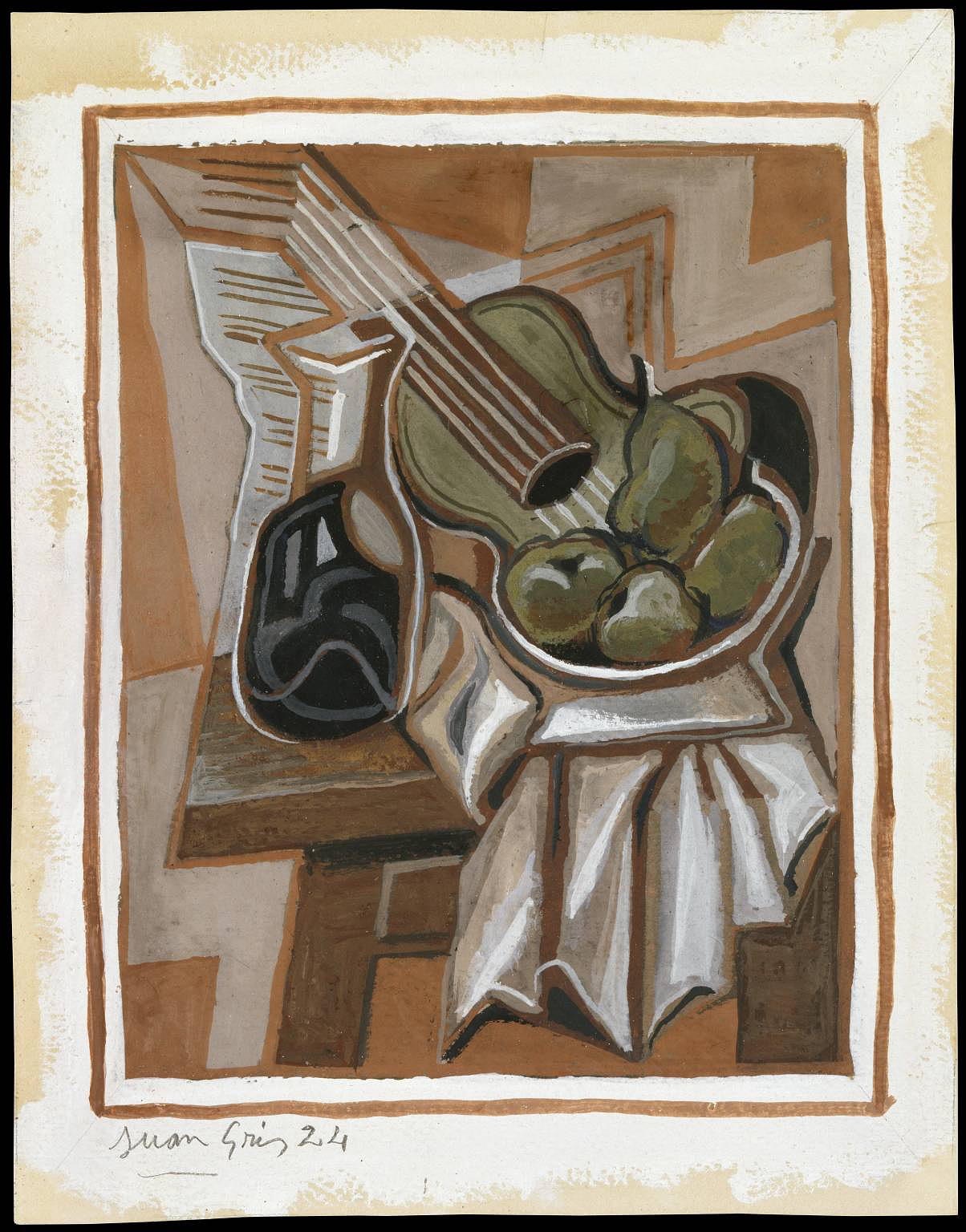
Juan Gris: Nature morte cubiste à la guitarem (1924)
"I find that tension thrilling …"
I'm not just a songwriter, but also somewhat of a guitarist. Not the kind commonly seen accompanying jazz bands, fretting hand all over the neck, fingers impossibly limber, intimately familiar with a hot half-dozen forms for even the most intimidating chords in every key. I use my guitar rather more defensively. It stands between me and my audience, a wooden fence I hide behind. I do okay but aspire to play no better. I accompany myself and I struggle wherever I attempt to get too fancy. I think of myself as primarily a lyricist, certainly much more than a guitarist. I'm a single acoustical act because I'm really not fit to play with anybody else. I keep my own tempos. I play exclusively my own songs. Consequently, I might be the only one who knows how to play along or when I play one wrong.
I became a curious kind of performer, one who'd always much rather not be the center of anyone's attention.
Prospector
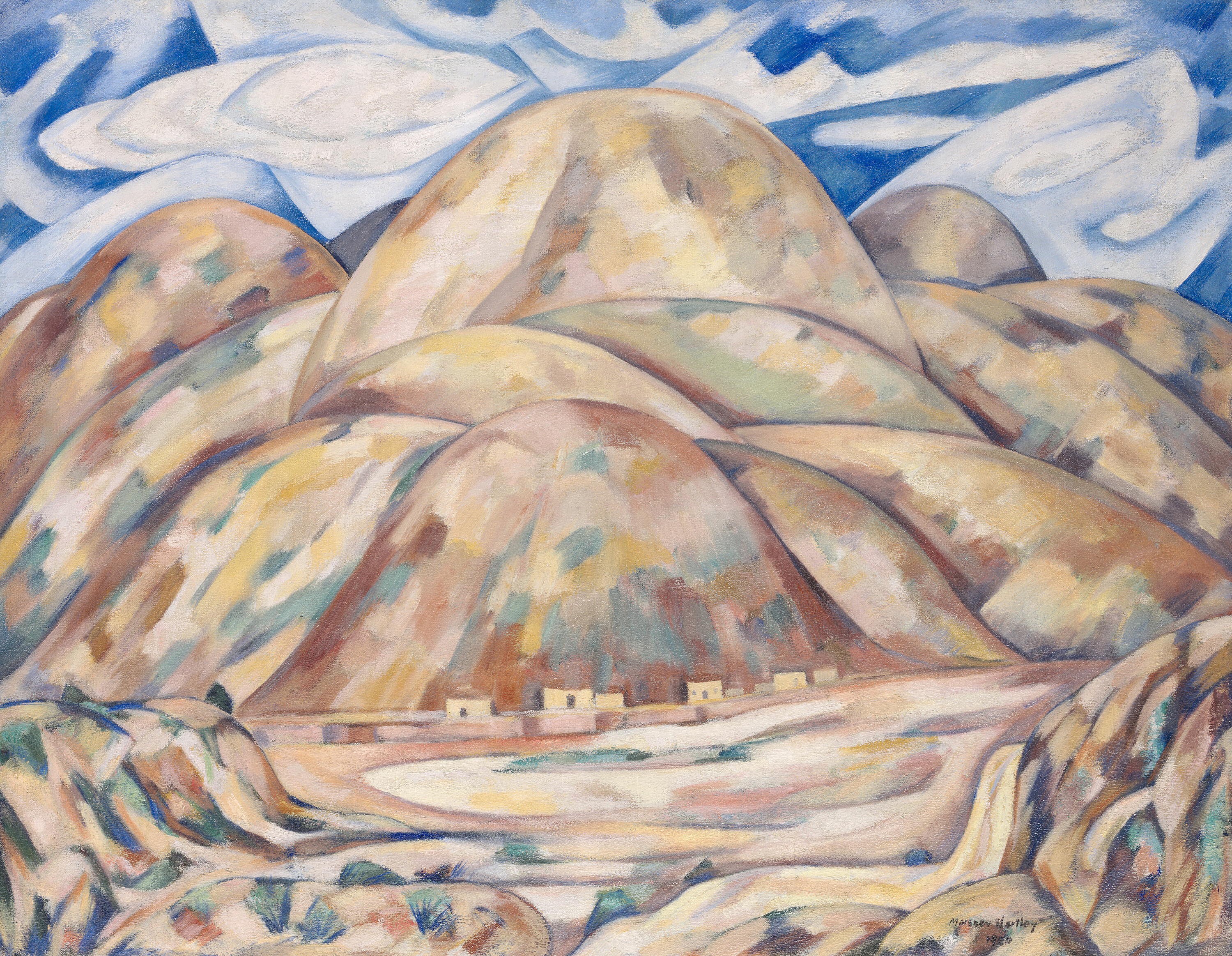
Marsden Hartley:
Landscape No. 3, Cash Entry Mines, New Mexico (1920)
"I have been the one creating that world."
Jeremiah
"Jeremiah's just as wiry as the sagebrush.
He built his home out on the desert sand.
Just a toothless old fool with a mangy mule beside him,
and a scrap of worthless parchment in his hand.
But Jeremiah says he doesn't mind his neighbors,
'course he's the only living soul for miles around,
With fifty-five years behind him in the Arizona sun,
searchin' out that old Lost Dutchman's claim."
Most of my songs seem autobiographical in that I serve as the obvious protagonist.
TheWaitingGame
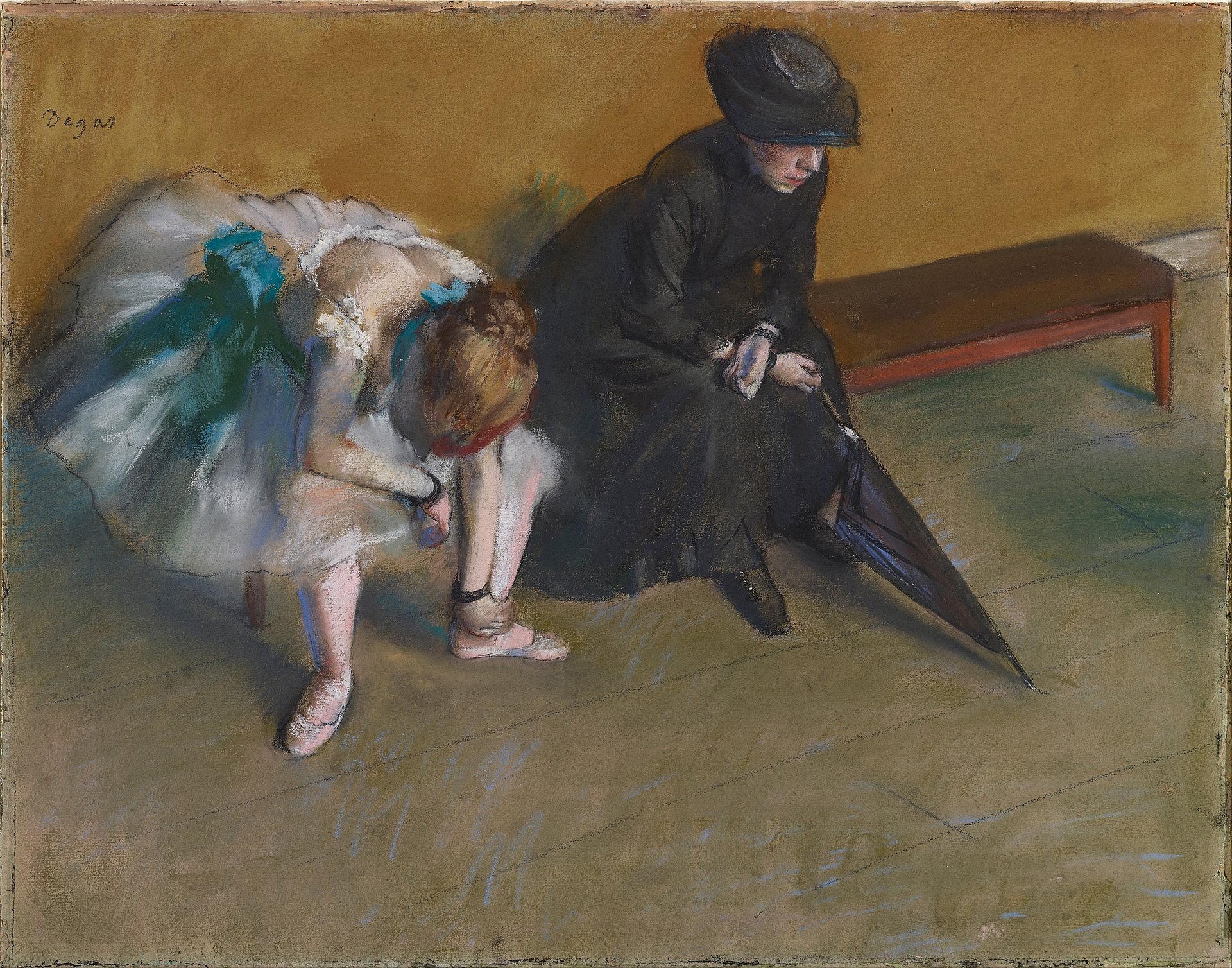
Edgar Degas: Waiting (c. 1880–1882)
"My juggling of the spaces in-between …"
Only one essential game exists: TheWaitingGame. This requisite game comes imbedded within every other game, within every occupation, whether it's considered a game or not. The one element of every engagement certain to appear before it's finished, TheWaitingGame seems anything but integral. It seems more like a waste, far worse than fallow, yet it certainly must be something other than mindless idleness. Why else would it appear universally, regardless of culture, regardless of time, age, or intelligence? The stupid receive their ration right along with the smarties. The handsome as well as the ugly, no exceptions granted. No exclusions.
My efforts to resurrect my songs and create a performable SetList feature much annoying idleness.
ChanceEncounter
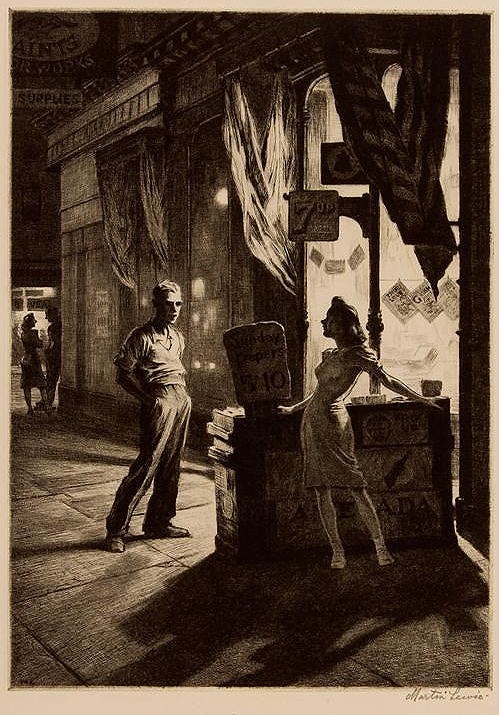
Martin Lewis: Chance Meeting (1940-41)
" … the good kind of double-damned bind."
Chance Encounter
"Let’s hear it for the Chance Encounter,
Let’s sing the praise of unplanned design;
‘Cause she’s always there keepin’ an eye on,
Unlikely you’ll leave her behind.
More unlikely, she’ll leave you behind …"
I fancy myself a great believer in the ChanceEncounter.
Twenty-fiveDown
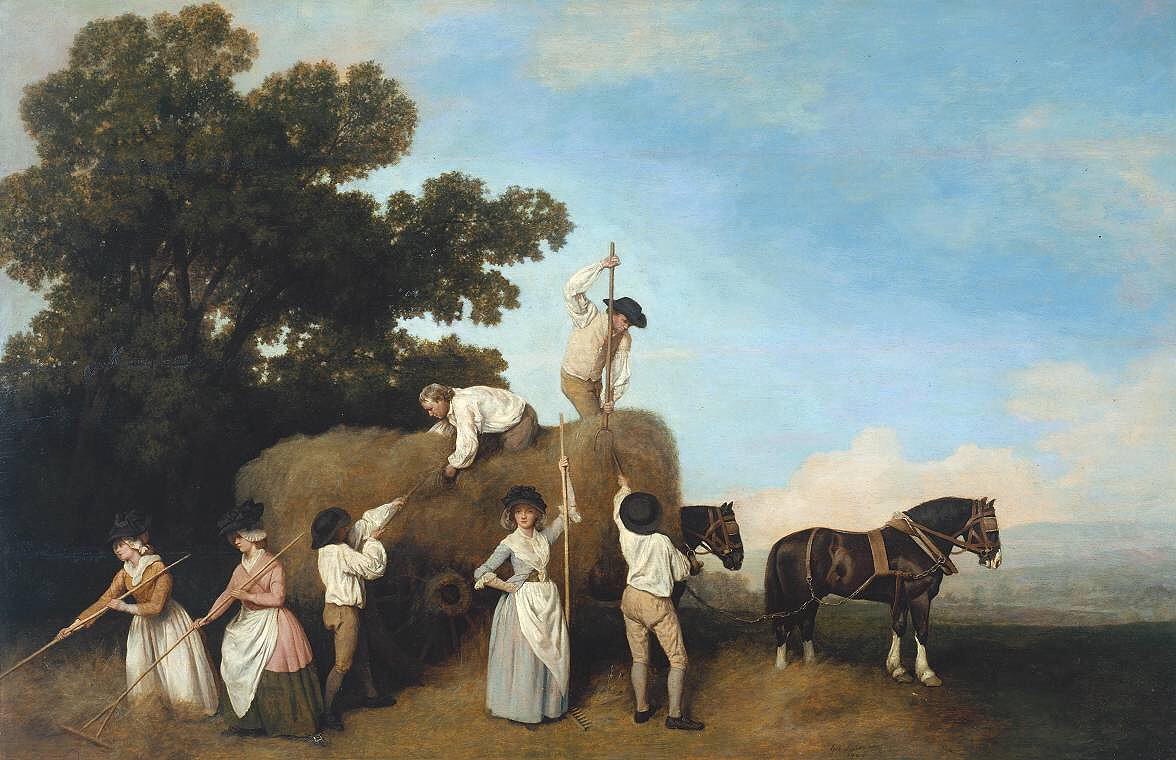
George Stubbs: Hay-Makers (1785)
"We've both come close to exceeding our patience, waiting."
"Twenty-fiveDown and five to go," The Muse whispered as she returned to the impossible puzzle on the side table in the radiation waiting room. She swore that she'd finish that puzzle by the time she'd completed her thirty dose radiation therapy, and she was down to the last week. Reduced to whispering now and without losing even an odd ounce of weight, she was entering what both of her oncologists had predicted would be remembered as her Hell week. Well, this week and the next, since the radiation continues cooking her cancer and her system for at least a week after the final application. Throat raw and increasingly exhausted, she still insists that she's feeling much better than she'd expected, and much better than almost any other cancer patient feels at this point in their treatment.
In that waiting room, there are never any exuberant patients or Emotional Support Animal spouses or children.
Entropying

Unknown artist-Central Tibet, mid 15th Century:
Tsong Khapa, Founder of the Geluk Order
(c. 1440–1470)
"May I never learn better."
Each season change brings a fresh disorder into focus as the reigning arrangement suited for the receding season falls out of fashion. What served as orderly then, now only appears disorderly and in need of cleaning up. Which of the infinite choices might suffice for order this time? The possible arrangements hardly approach the infinite, and seem limited by practical factors. I have limited time and perhaps even more limited imagination. The disorder seems powerful, for it disables significant portions of my imagination. I acquire a blindness to certain potentials and affinities for the familiar. I am as a result not so much ordering or even re-ordering, but Entropying: aiding and abetting a continuing disorder, rearranging deck chairs, blithely unaware.
I'm realizing that the disorder I found when I started poking into my songbook probably resulted from an inevitable.
MellowCat
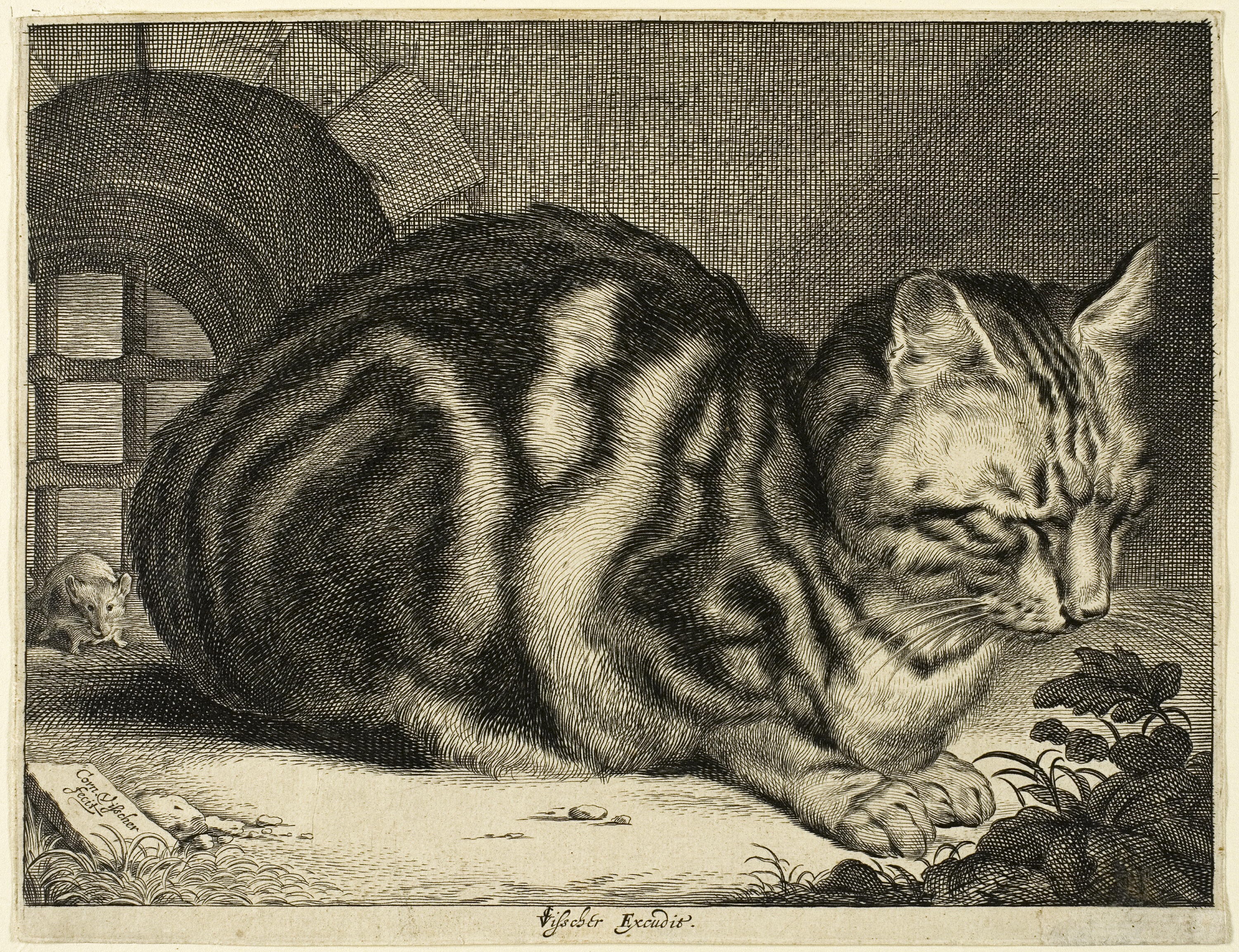
Cornelis Visscher: The Large Cat (1657)
" … I have no idea from precisely where this one came."
Me and My Mellow Cat
"Winter, my life is moving slow.
My dreams have turned into yesterdays
with no place left to go
and so I find myself
on this dark side of the sun,
just tryin' to find the ones I used to be."
I despise my anticipation of winter more than I've ever actually reviled the season in practice.
Founding

John William North: The Wood Gatherers (1869)
[Herbert Alexander, the artist’s biographer, described the artist’s interpretation of nature as similar to that of a poet, suggesting rather than describing: "In watercolor and oil an effect of intricate detail is found on examination to be quite illusive—multitudinous form is conjured by finding and losing it in endless hide-and-seek till the eye accepts infinity." from The Cleveland Museum's description of this work.]
" … as if my life might really have a purpose."
My songs seem to experience the most remarkable life cycle, for I've lost each after completing them, then found and resurrected some after they've spent some period essentially wandering in wilderness. Many still remain there. Had I not resurrected them, they would have most certainly been lost to the ages, as if they'd never existed, and they might well yet be lost, for this cycle most likely continues well into the future. My legacy, such as it might be, will probably be more determined by chance than by deliberate intent. I'm uncertain, anyway, what form a legacy might take and how I might set about to form one, if I was disposed to even attempt such a feat. My tunes have faded out then back into fashion. This might just be their nature, and mine.
Through the first part of this series, I noticed myself chewing on myself for losing the songs.
Fretwork

Frans Hals: Jester With A Lute (c. 1620 - 1625)
" … only I could ever punch the ticket I was holding …"
Little suggests that I possess my superpower. No spandex® suit, thank heavens. No special badge. Like anyone, I appear unremarkable, just another face in the crowd. Yet I believe that I possess a real gift, but one so subtle and unobservable that even I often overlook its presence. It's taken this concerted effort to produce a SetList and preparing to perform a house concert to surface this gift. Real guitar players culture their fingernails until their picking fingers become fingerpicks, darned near indestructible. Not I. Every guitar player develops calloused fingertips on their fretting hand, and often, as in my case, that hand grows a mite larger than its counterpart from constant stretching through the decades. Other than those fingertips and the outsized hand, nothing suggests that I'm a songwriter, and those aren't definitive tells, since not every guitar player writes original songs.
Songwriting's a presumed skill, one that's really only present in any verifiable form after the work's done and the purveyor becomes one who has written, but even then, the evidence of that ability won't be in evidence, not even to the scrupulous eye.
Journaling

Pierre-Auguste Renoir: The Apple Seller (c. 1890)
" … we're each much more complicated than we appear …"
I find myself feeling extremely grateful for the songs I've written over the years. Rediscovered, they seem to represent a curious form of Journaling, diary entries made without the author intending to catalogue his experiences. Yet, replaying each song seems to reliably resurrect the times and places within which it came into being. I have been revisiting those times and those places as I recover these songs. I realize that my experience has been much more diverse than it formerly seemed as though it had been, for I suppose that nobody ever carries many details of where they've been and who they were before. Our memories summarize, favoring brevity and so-called representative snippets. We might remember an encounter without really recalling how it felt, for instance. My songs seem capable of resurrecting feelings to produce a fully emotional remembering experience.
Earlier in my adulthood, I took to Journaling.
PaintMeAPicture
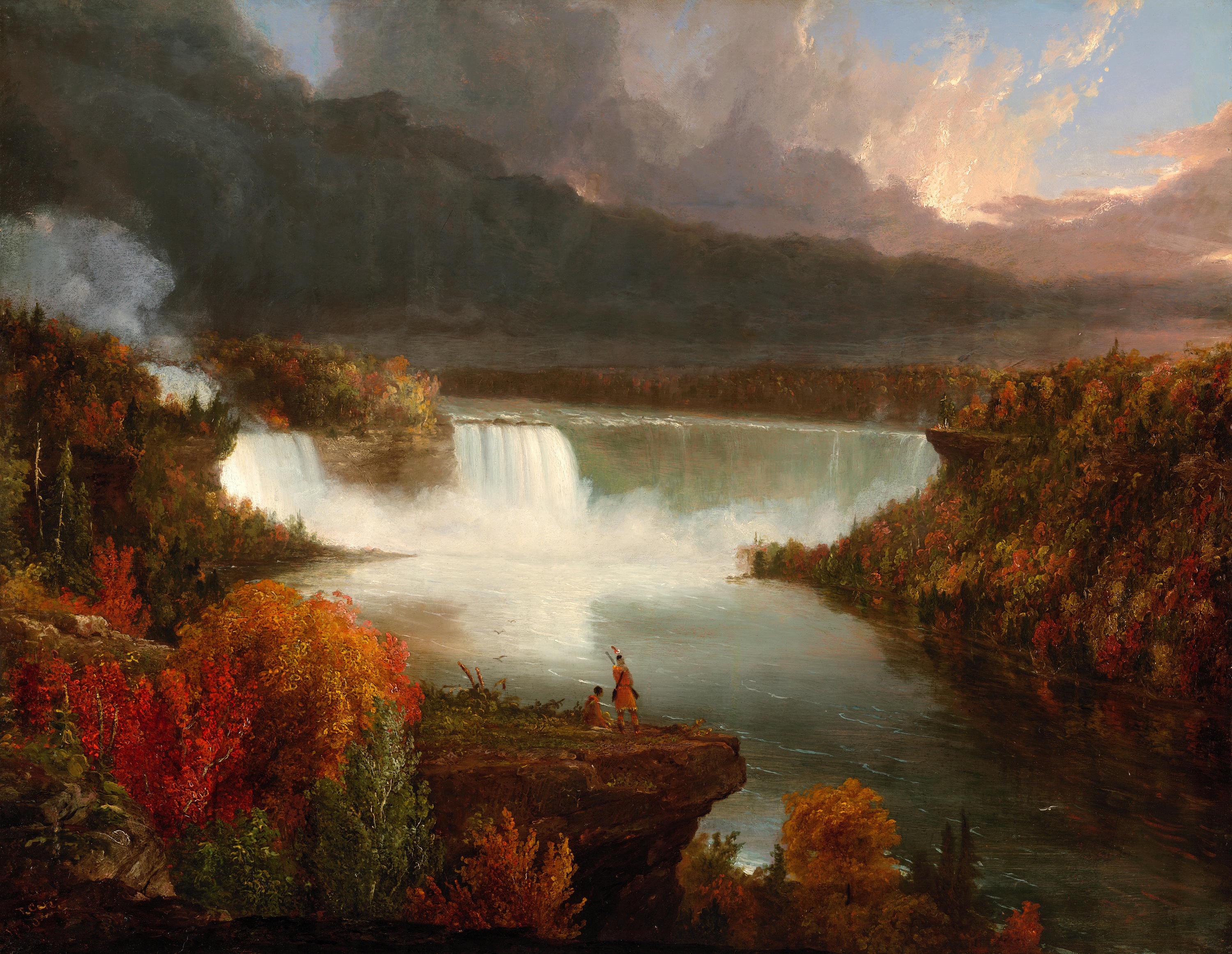
Thomas Cole: Distant View of Niagara Falls (1830)
" … the performer doesn't quite get it yet."
Paint Me A Picture
"I'm workin' my way through,
only two more sets to go and I'll be gone.
And the spotlight sees right through me,
but I don't think it shows, I mean I'm holding on.
'Cause I've been deceiving myself through the worst of it,
just hopin' to make the best of this someday.
Hey, hey!"
I began anticipating the end of my chosen career as a singer/songwriter several years before its actual demise.
Exemplary

Isack Elyas: Merry Company (1629)
"She has not managed to bust out of any of the human condition on her road to recovery …"
The slow-baked yellowfin tuna in cream sauce featuring lobster mushroom and shallot seemed a decent choice for supper. The Muse had, after all, received two terribly reassuring assessments over the preceding week. We could afford to celebrate her headway. Her radiation oncologist had declared her progress through cancer treatment, "Great!" and her other oncologist had just that morning characterized her condition as she passed into halfway through her immunotherapy treatment regimen as "Exemplary!" Her progress could not have been better, but she found that she could not swallow the tuna entree. She fell back to the baked acorn squash with Bosc pear side dish. Even that, she swallowed reluctantly, the radiation treatments culminating in a rough, raw throat wherein her shrinking tumor still resides.
It's Tuesday, the morning when I deliberately set aside the primary focus of this series to update on The Muse's progress through her present bout with cancer.
MyWives
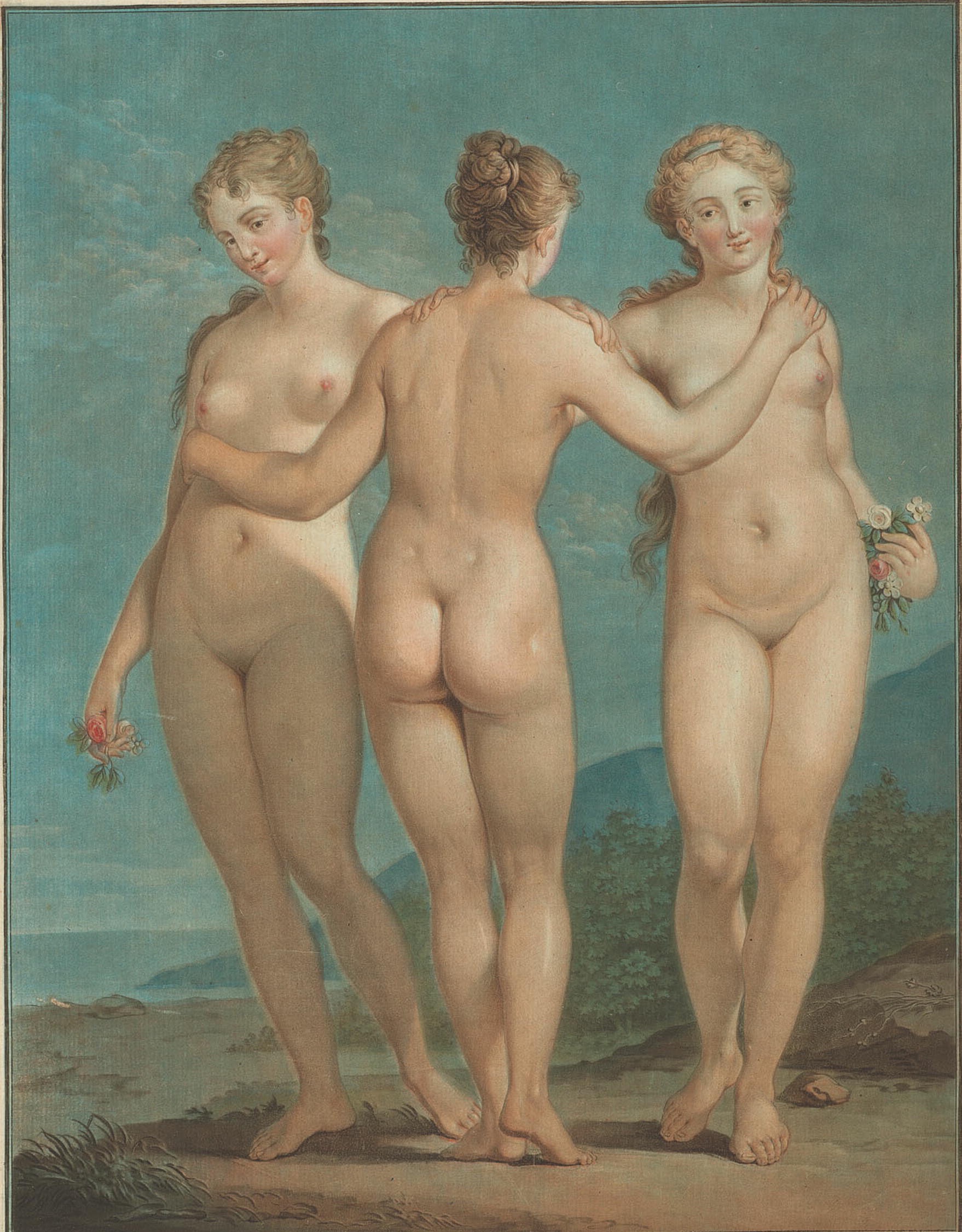
Jean Francois Janinet:
The Three Graces (Not Dated, circa 1770-1814)
"If life's not improving then it must be intruding …"
My Wives
"My first wife was an angel in disguise,
She taught me how to cry
and I taught her how to fly,
she bore two children.
We moved to Pennsylvania where we tried
to live the compromise familiar to all we lives.
We drank our fill, then …
"Life intruded on our plans, the future took our hands,
Pipes

Luc-Olivier Merson:
Head of a Boy Singing [Study for Music] (c. 1898)
"I see much whispering to myself through the near future."
My songs might well be eternal, but only conceptually. Actual eternity requires more resources than might seem obvious. That ditty you heard on the radio probably cost thousands of dollars to produce. The simpler the song, the more its production likely cost, with studio time alone costing beaucoup bucks per hour, not to mention engineers, musicians, and backup singers. My songs, as I've explained before, are more like freeze-dried preserved. They need to be reconstituted each time. This requires not only the words, melody, and chords, but also a fresh performance of those, using my voice and accompanying myself on my guitar. Recovering these tunes touches every aspect of every song. I've struggled just to recover the words for some. The melodies and chords were never transcribed into musical notation, which I never mastered and couldn't read in realtime, anyway, so those need recovering from my ever-faulty memory. It was long my dream to record in a real studio, though I only ever managed that feat once. I recorded five songs in the hour I'd reserved, if you don't count the extra time the studio's owner gave without charging me, so I could finish what I'd intended, because he liked what I was doing. Even those need recovering if I ever intend to actually perform them.
So, when I say I'm recovering a set of songs, I mean that I'm actually recreating those performances, or, more accurately, creating them anew again.
Fingerlings
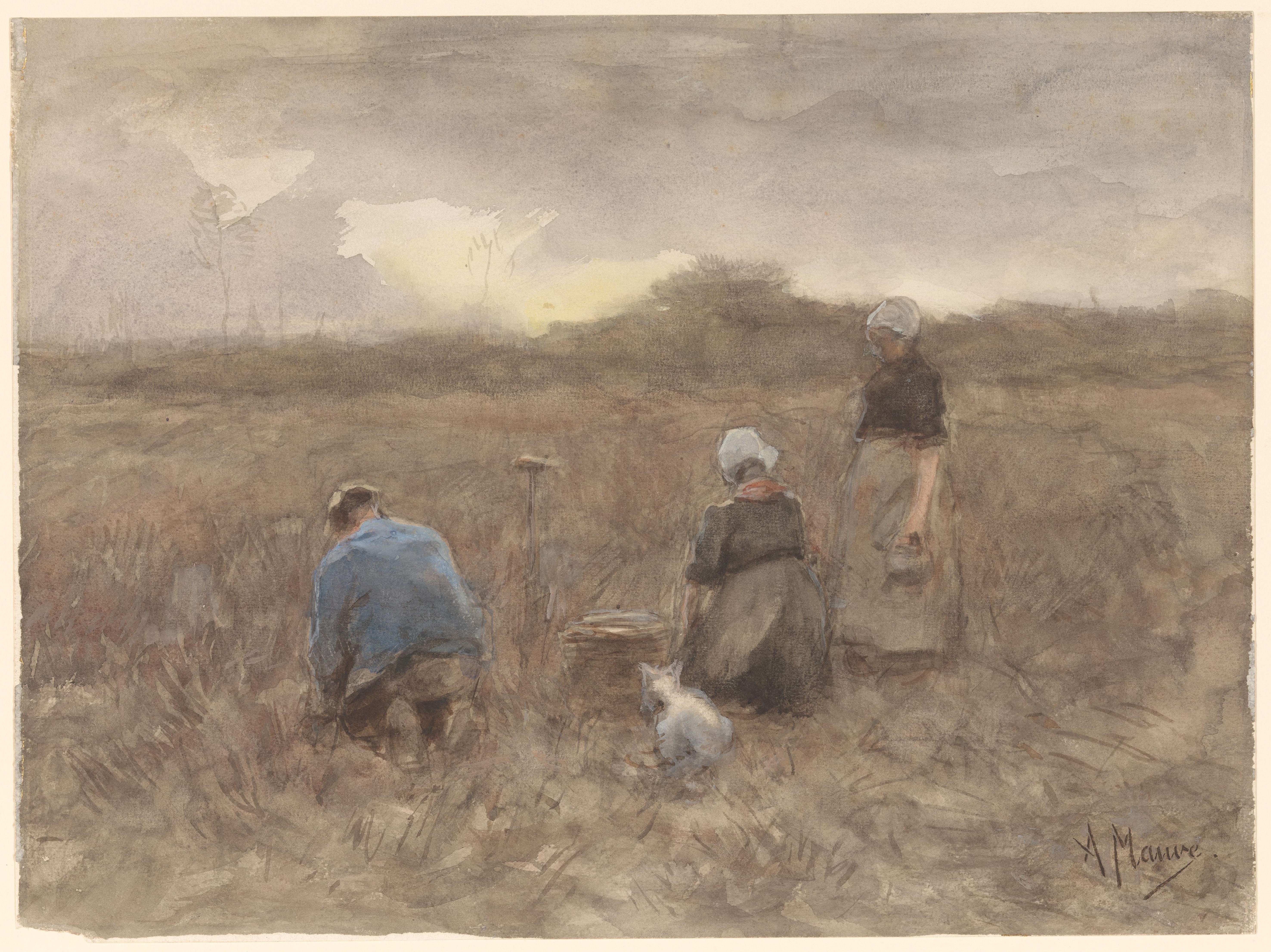
Anton Mauve:
Aardappelrooiers [Potato Harvesters]
(1848 - 1888)
"I pursue my best with the least promising resources …"
After a few years of relative inactivity, my fingers seem almost as agile as Fingerling potatoes. They've lost their limberness. They feel stiff and inattentive when attempting to play anything the least bit intricate. They transform my guitar's fretboard into an authentically fretful place. I attempt little and achieve worse, cursing under my breath. I face a long recovery, a bare uphill track featuring few useful landmarks. I some days doubt that I will ever recover my former mindlessness, for proper guitar playing requires little if any thought. It's incarnate muscle memory in action, not in any way thoughtful or strategic. Once mastered, it just happens, freeing up consciousness to remember lyrics or control voice and volume. The guitar should properly accompany, not feature, and in order to properly disappear into the background, it must be transcended. No struggling to remember chord order or, heaven forbid, proper fingering. That must follow as a matter of course, without thought or fuss.
Now, it remains mostly thought and fuss, of course, which reliably produces the absolute opposite of reinforcement to practice, which will provide the only viable escape route back to even the appearance of competence.
SpecialCrazy

Vincent van Gogh:
Madame Roulin Rocking the Cradle
[La berceuse] (1889)
" … this song cemented our sanity."
A Special Kind Of Crazy
"It takes a special sort of Fool to write a song for you.
That Special Kind Of Crazy can't help but just shine through,
Other lives and other places
You with yours and my displacements,
We'll integrate or simply leave behind,
'cause I'm crazy of that very special kind."
And so I started what promised to be a really terrific tune.
Underpants
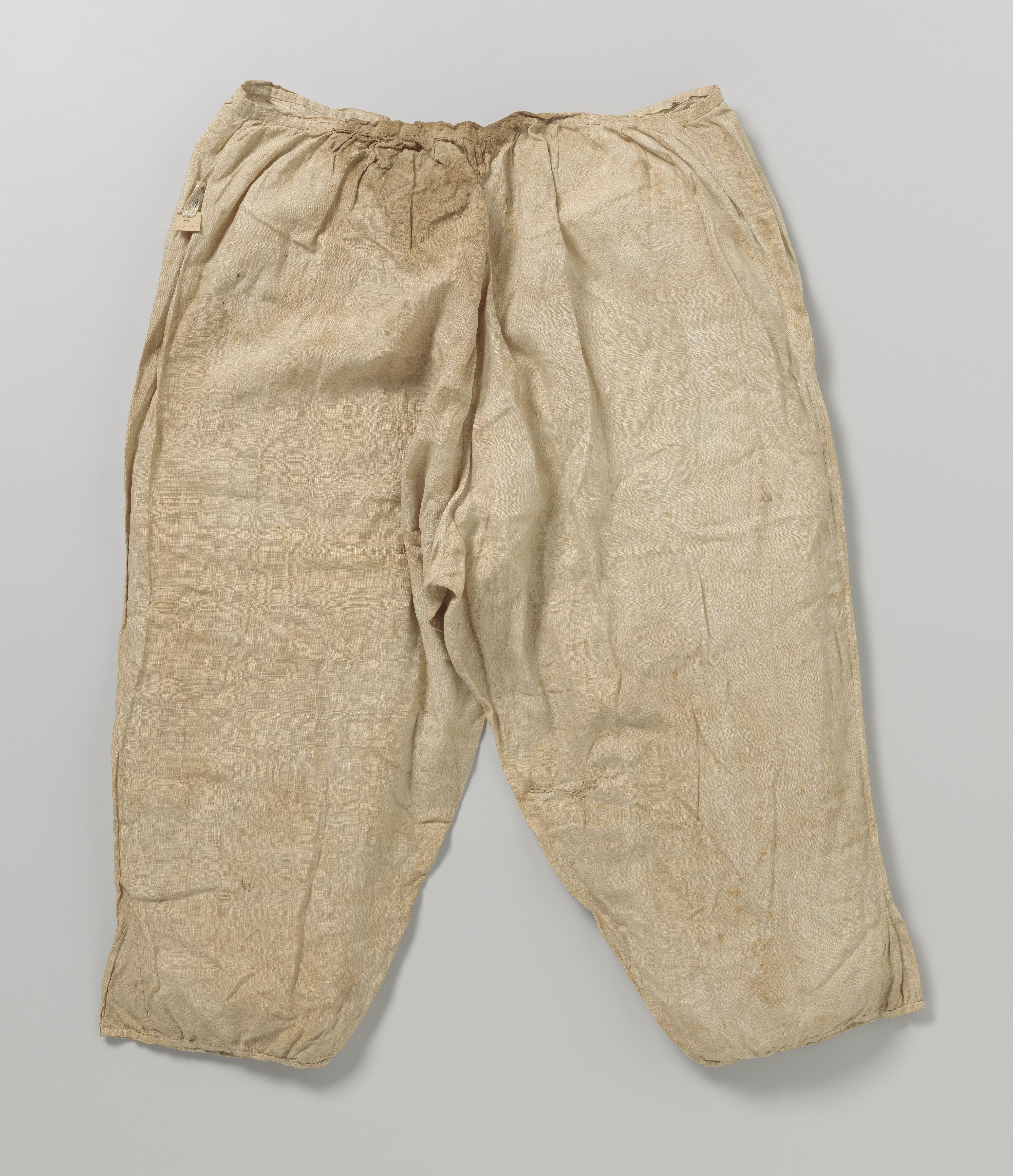
Underpants of Hendrik Casimir I: Anonymous
(1630 - 1640)
"Give me superficiality or give me certain death …"
Those who've followed my FaceBook benediction postings after my Friday PureSchmaltz Zoom Chats already know that I favor what're labeled "Novelty" tunes. I take my music seriously, as the pieces I've already introduced doubtless make clear, but I'm never more delighted than when The Muse slips some smart-assed something into the mix. Like many other songwriters, I've never really been in charge of which songs emerge. I've proven myself capable of following inspirations, but never really facile at creating them. Songs more visit me than I create them. They lead, I dutifully follow, and the responsibility does, indeed, feel like a duty to me. Like anyone, I feel enjoined to make my particular sort of noise in this world. Otherwise, why was I even born?
Amid all my more serious works, my self-described Top Fifty Truly Terrible Traveling Tunes stand eternal.
InvisibleHusband
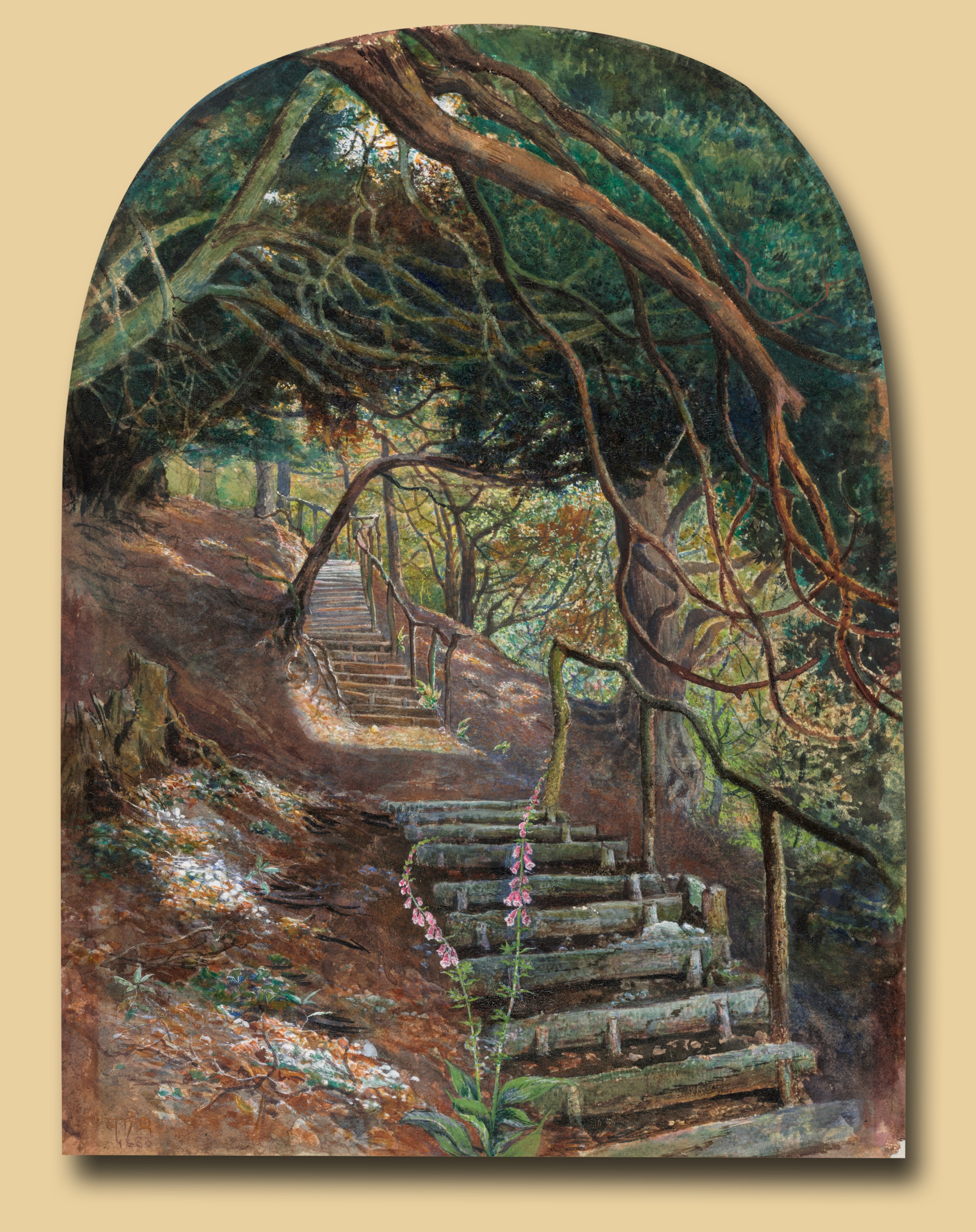
William Henry Millais: Steps in a Garden (1860)
"This wholly unlikely story is absolutely true."
The Invisible Husband
"It’s late. I’m going to sleep.
You’re still awake in an airplane seat.
I’m here, holding fort,
the cats are tended and the house is dark.
I’ll see you late Friday night,
too late for supper, I’ll keep the bed warm,
let yourself in if I couldn’t keep my eyes open."
If any of my songs have proven emblematic of an era, this one certainly managed to became that.
Magick

Corita Kent (Sister Mary Corita):
m is for magick (1968)
"[Magick] might materially misrepresent its eventual impact."
The wheat and the chessboard problem dates from at least the thirteenth century. In it, a king foolishly agrees to pay a mercenary in grain, a single kernel for the first day's effort, two kernels for the second, doubling the amount each successive day until all sixty-four squares on a chessboard are covered. The amount of grain accumulated after the first thirty-two days of effort seems huge, something on the order of 279 tons, but the thirty-third square calls for twice that amount. By the sixty-fourth square, only more than 1,600 times the world's annual grain production will meet the requirement.
I recall this story to describe how cancer treatment works.
FoolHead

Sebald Beham: The Fool and the Foolish Woman
(circa 1531-50)
"What wiser course could any half-wit devise?"
My mother would have said that I was singing my FoolHead off, but I was actually singing it on. Plugged into my studio headphones and finally satisfied with the filtering, I was suspended in an other world, singing while playing my guitar. Once tuned up and with my eyes closed, I had dulled all extraneous senses so that I could focus upon the few of them important to my mission. I was, in the vernacular, practicing, but I was more like focusing. The focusing's much harder, and a necessary precedent if practicing's to satisfy its purpose. The biggest challenge involves overcoming the distractions, and plugging into my sensory depravation system definitely helps. It seems that I can accomplish nothing as long as my full range of senses remain active. I must dismiss some feelings to make either sense or progress. I must put on my FoolHead, not remove it.
Performing seems a necessarily mindless activity.
TheVoices
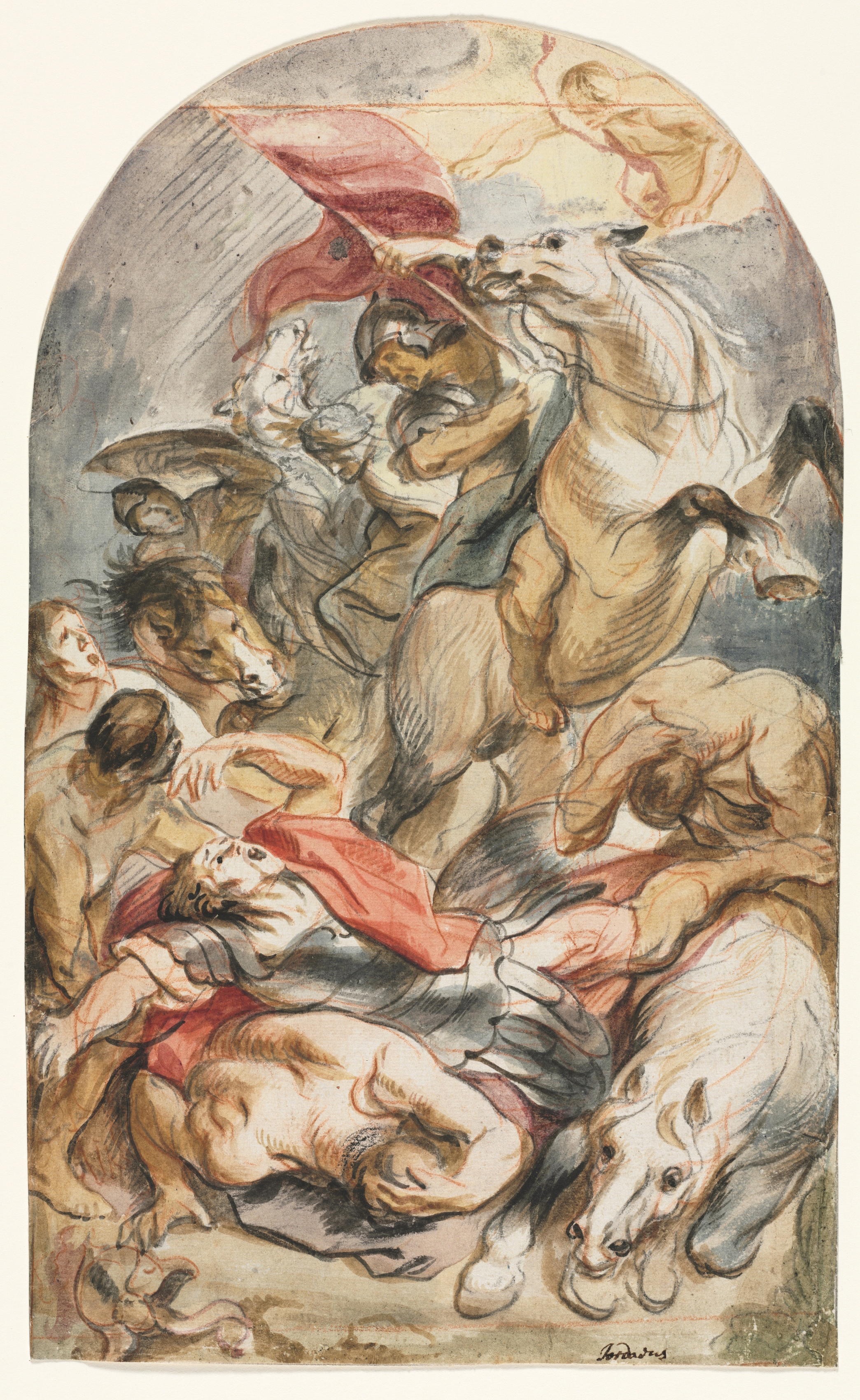
Jacob Jordaens:
The Conversion of Saul with Horseman and Banner
(c. 1645–47)
"Better if he focuses exclusively upon making a joyful noise."
Performer Leo Kottke famously described his baritone singing voice as sounding like "Geese farts on a muggy day." I've long agreed with him, yet his singing voice seems perfectly appropriate, the perfect accompaniment to his masterful guitar playing. He plays his guitar so skillfully that any accompanying voice couldn't help but mesh well. A long line of less than perfect voices have passed in and out of notoriety in my short lifetime, so many that I marvel at how few really wonderful voices I've ever heard. Clearly, the quality of a voice and the quality of any given performance remain two very separate experiences, with the twain only rarely converging. The quirky seems to have little problem attracting an adequate crowd, and often, much more than a merely adequate one.
An unheard voice, the voice within, always accompanies the one projected over the accompanying music.
BornToSee
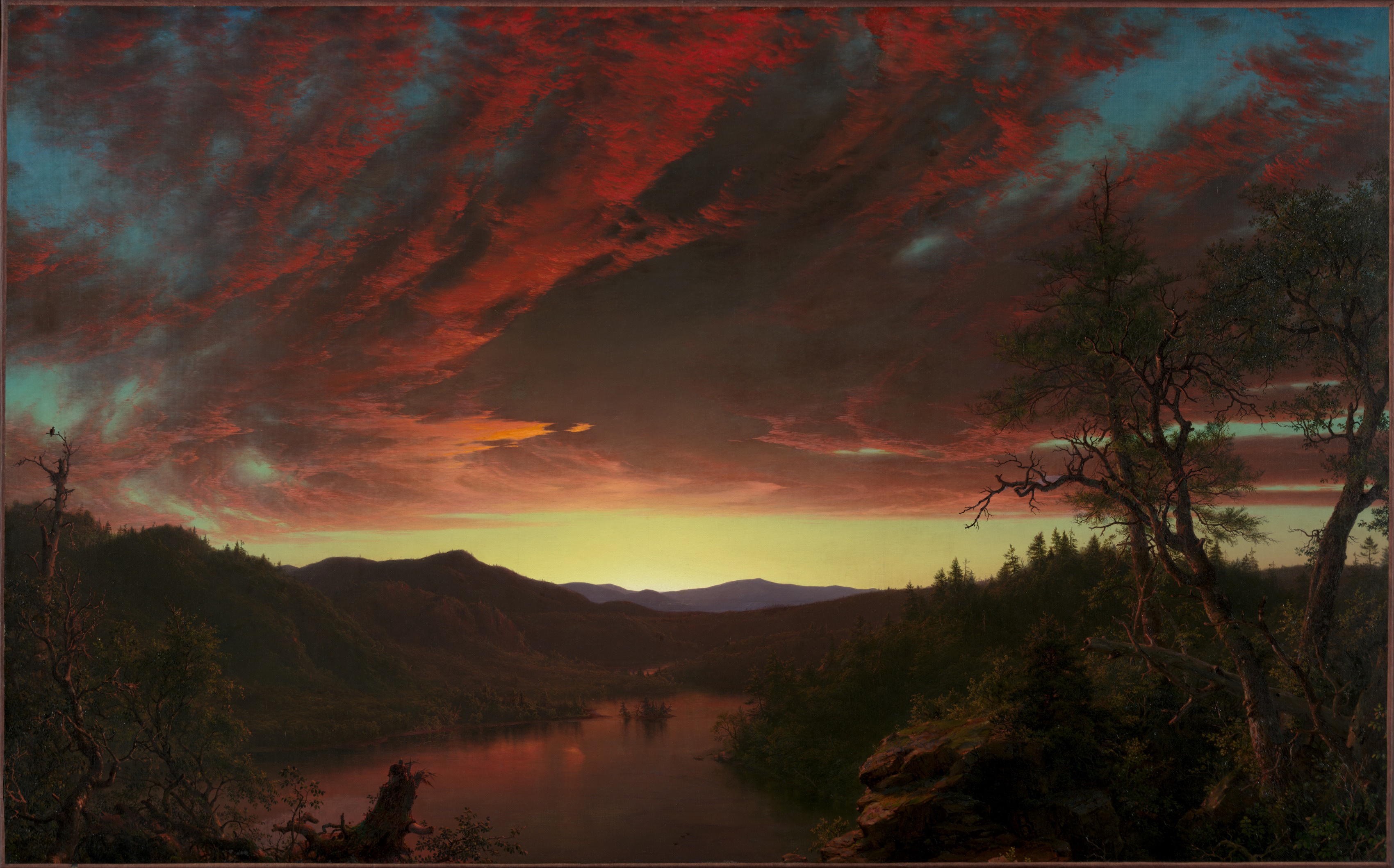
Frederic Edwin Church: Twilight in the Wilderness
(1860)
"Another dichotomy bites some dust."
Many of my song lyrics describe apparent contradictions, where opposites might temporarily take the same side. I was always attracted to seeming paradoxes, relations that make no rational sense, but which could be resolved with a little perspective shifting. I have often been fooled when some opposite turned into something much more similar than I'd earlier expected. I might have been making war on dichotomies, trying to demonstrate just how simplistic and self-destructive classifications can become. Many of my lyrics register surprise at discovering another nature lurking behind the obvious one. I believe that this phenomenon represents real learning. When all the innocent and ignorant others disappear into similar forms, enlightenment will have occurred. Until then, good and evil continuously battle to nobody's obvious benefit.
BornToSee The Light
OneMysteriousDream
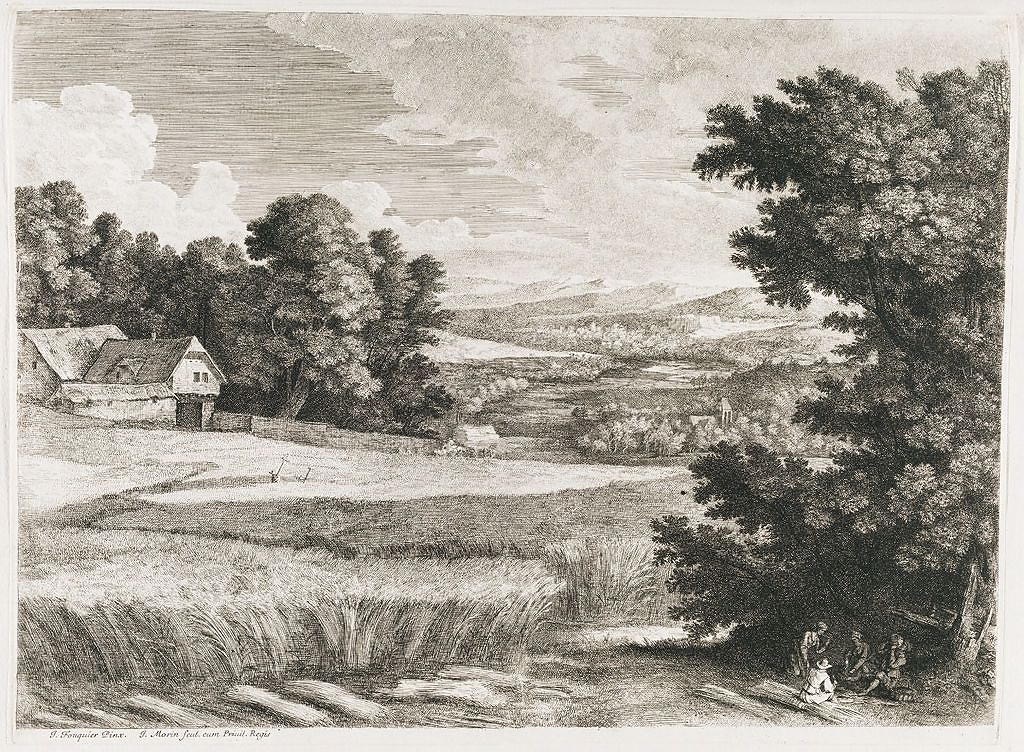
Jean Morin, After Jacques Fouquières:
Landscape with a Wheatfield (17th century)
" … it matured to say precisely what needed saying …"
One Mysterious Dream
"I will take to the morning on the first day of my life
and wander through the sparkling dew and sunshine,
and let her icy tingle wipe the sleep out of my soul,
for it seems to me I surely have been dreaming all this time.
But I almost half remember this One Mysterious Dream
that came upon me just before I rose."
Metaphysics might be the one consistent sub-theme running through all my lyrics.
AFriendOfMine

Unknown artist: "Pistol-Packing Pirate" still bank
(20th century)
"We're moving targets with static language."
A Friend Of Mine
"Talk about your side streets,
go on and talk about your country roads.
Talk about your alleyways, Daddy
where you're not supposed to go alone.
Sing me a song of the city at dawn
where the neon fades in shame,
and tell me all about your doorways, Daddy,
when you're sleeping' in the rain."
And so began the story of the end of AFriendOfMine.
AWOL
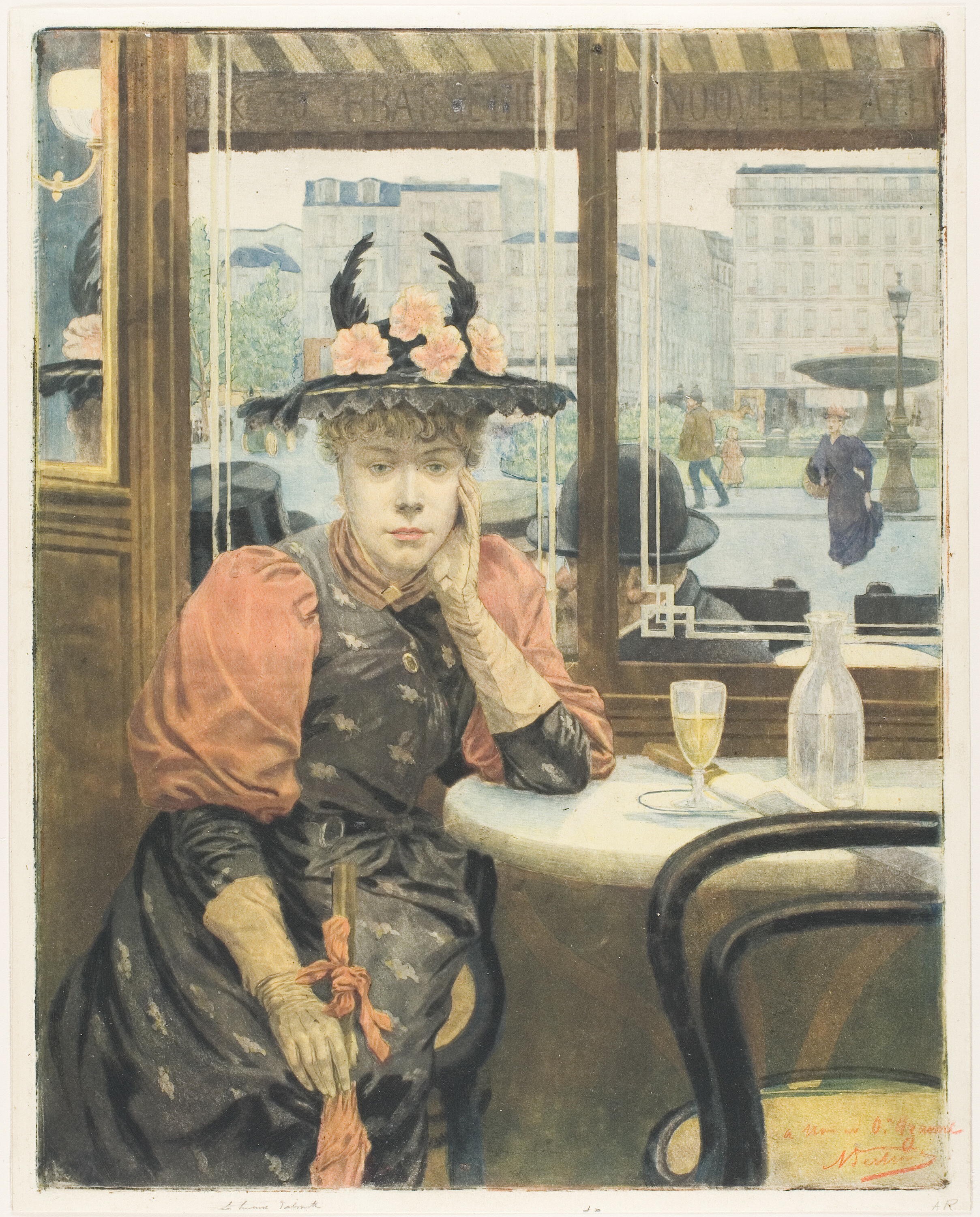
Albert Emmanuel Bertrand: The Absinthe Drinker
(c. 1890)
"Absence made this heart more insistent."
The Muse insisted that I take that trip, which made me absent for those treatments. The treatments had become routine. The radiation, a mere few seconds. The aftermath, difficult to assess. The oncologists both promised worsening experience over the next months. Still, each day passed without any dramatic changes: a definite but subtle tiredness, a growing willingness to sleep in each morning and to retire ever earlier after supper, but nothing dramatic. We, the patient and her Emotional Support Animal (me), might have grown complacent, continuing a long streak of decent good fortune into a surprisingly welcoming future.
The Muse's cancer treatment occurs as an experiment.
Estranging
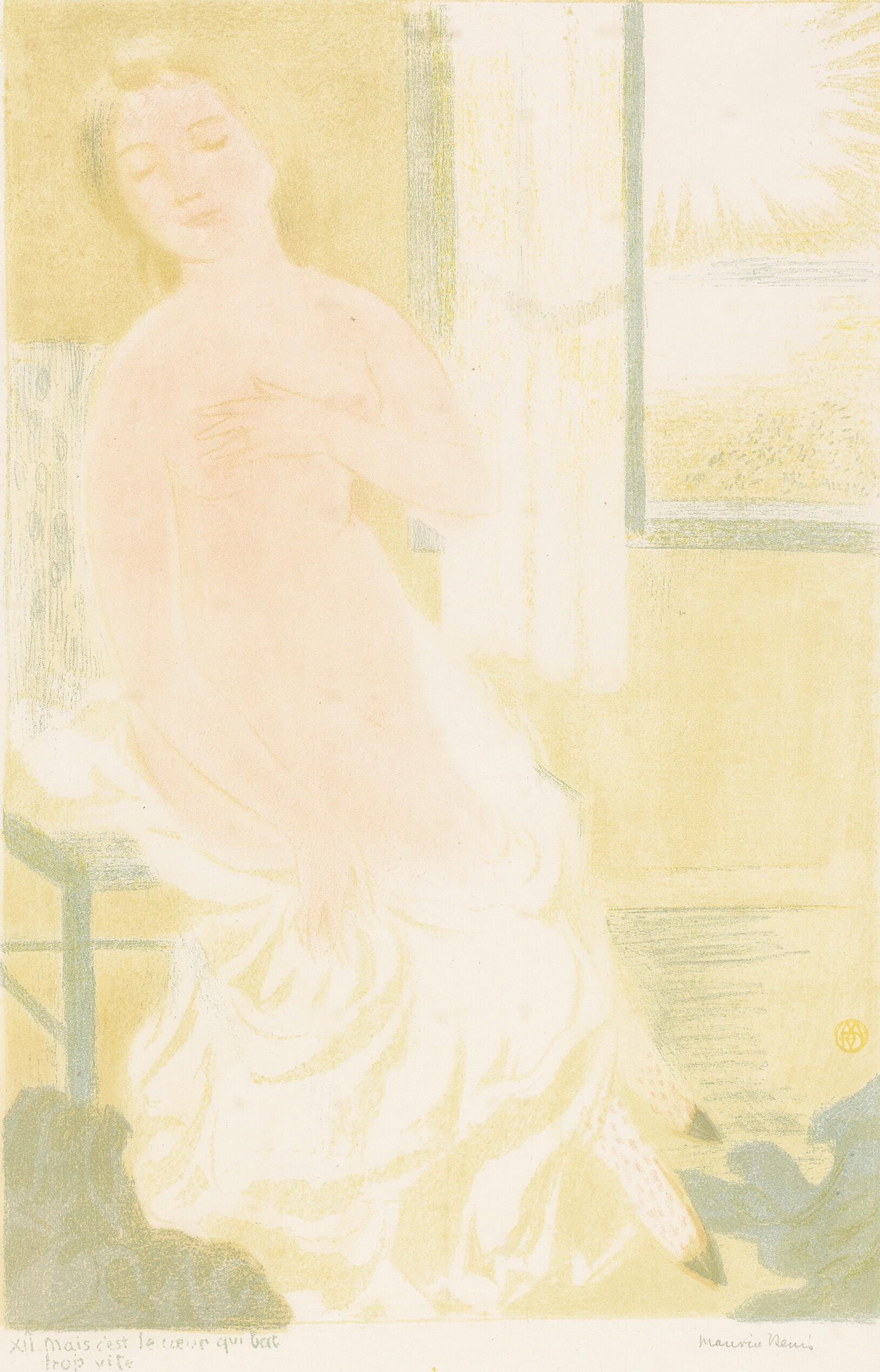
Maurice Denis:
But It is the Heart That Beats Too Quickly,
plate twelve from Love (1898)
published 1899 by Ambroise Vollard
"No way could we ever possibly be tempted to say …"
Just To Break A Heart
Half truth, and half promise
like we knew our future from the start.
I told you the truth when I said I loved you,
it came right from my heart.
Then we moved through our lives with confident strides,
just as if we knew love, just as if we controlled our hearts.
Let's just say as we tumble away
that we played Just To Break A Heart.
The yin/yang symbol illustrates how this world might seem equally divided between light and dark, but that the dark also contains a spot of light and the light, a spot of dark.
Slip over here for more ...Wandering
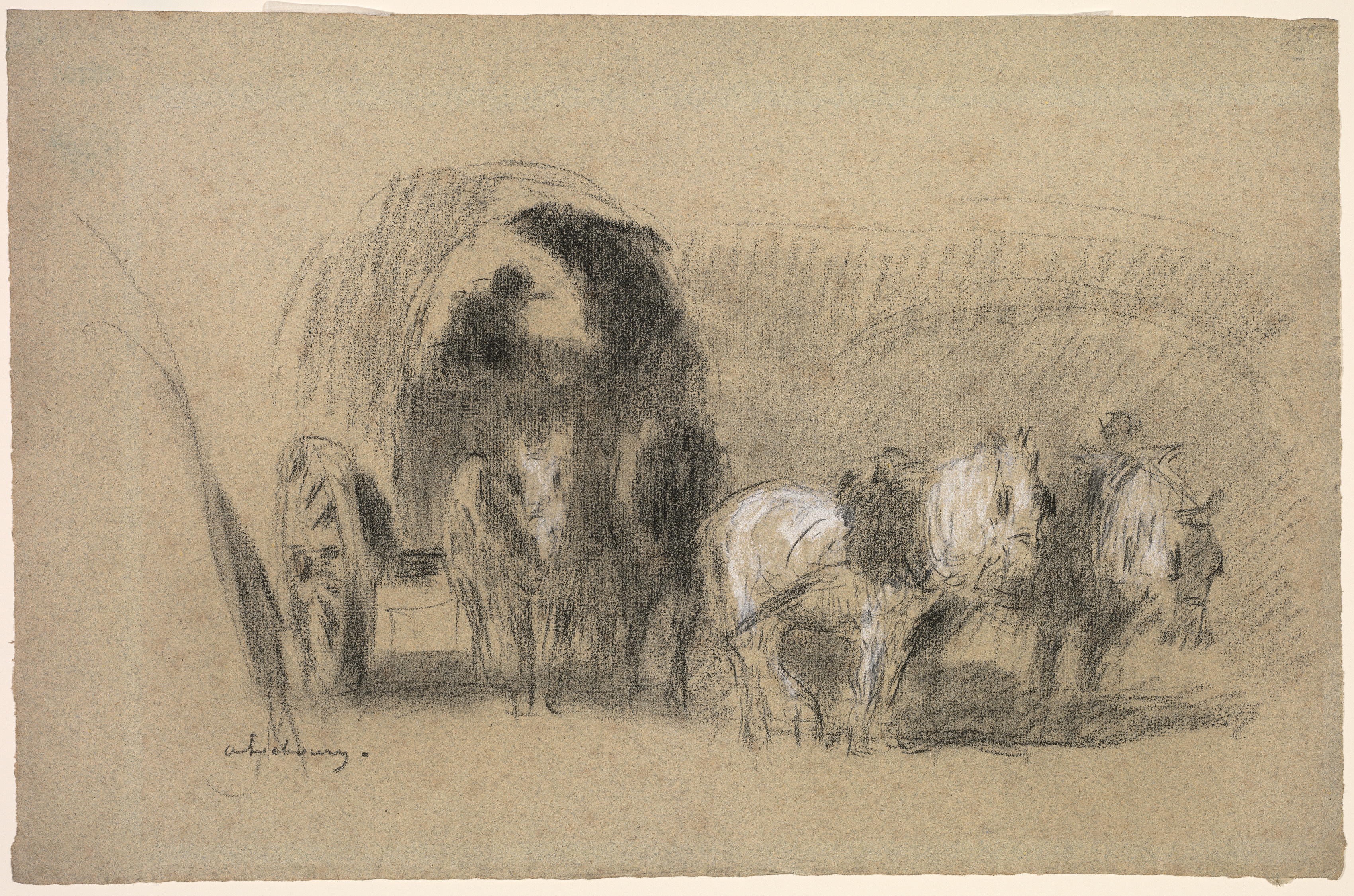
Albert-Charles Lebourg: A Miller's Carriage (c. 1895)
The horse-drawn carriage parked at the curb beside the ice cream parlor where families sat at outside tables and watched while other families boarded and unboarded the carriage. The carriage with its driver and passengers would leave, horse walking, before making a left turn a block down the street then continuing on its excursion. A few minutes later would find that same horse and carriage moving regally up the next street over, passengers watching unremarkable storefronts pass before them. People love to take rides. That carriage would take its passengers on a short journey to nowhere, past places they could more conveniently view while walking. What compelled their adventures to no place? What drove their excursions?
The horse threw a shoe as it began a later trip.
Elbowing
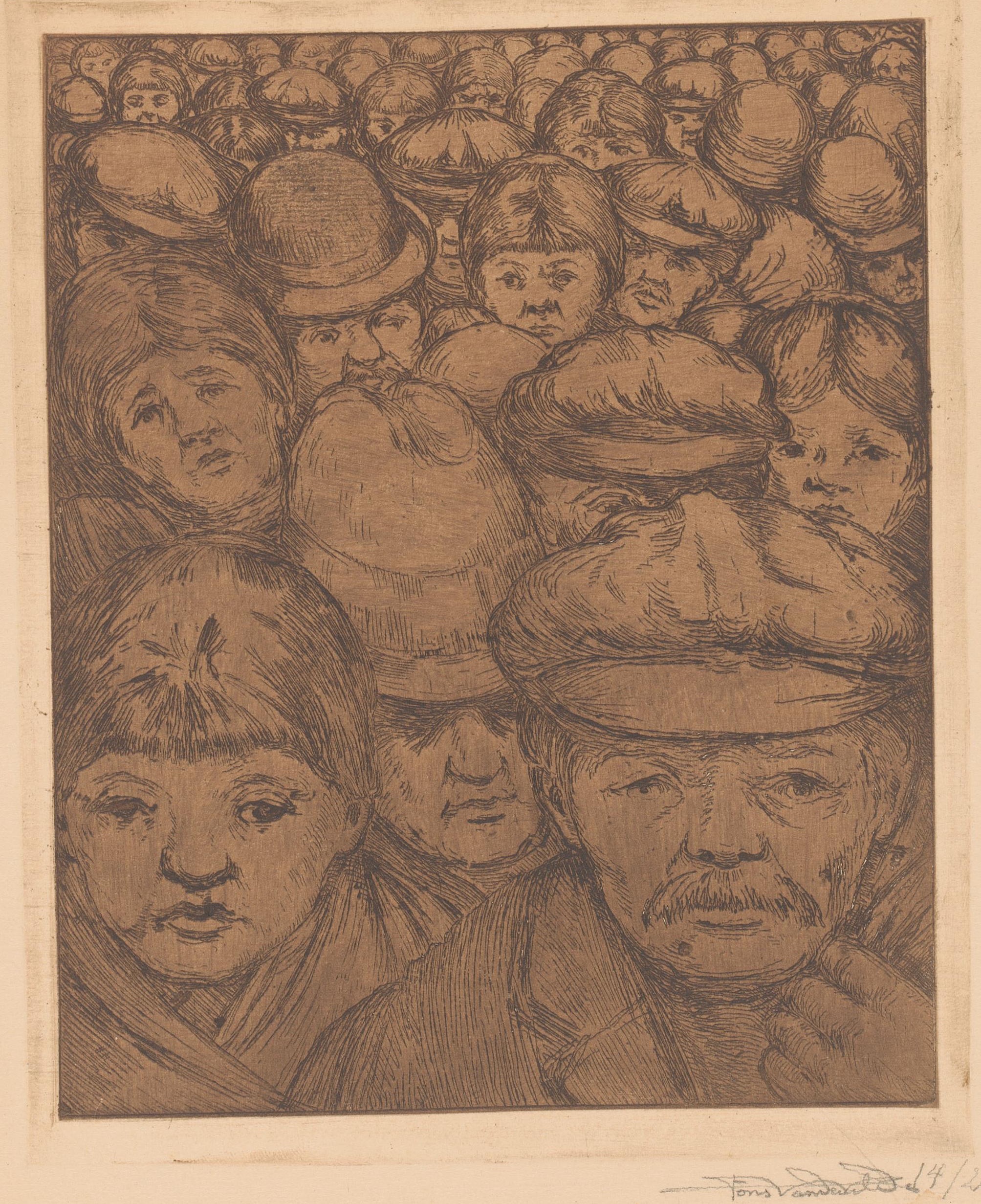
Fons Van der Velde:
Koppen in een menigte [Heads in a crowd]
(1880 - 1936)
" … no business expecting any different."
It seems a wonder bordering on a miracle when anything gets accomplished, for setting a definite priority might have always been the surest way to create competing distractions. I might look at my calendar, conclude that I have few upcoming demands, and so take on some fresh obligation. The very moment I set that intention, competing commitments swarm such that I quickly find that I'm Elbowing my way through them to find a few stolen moments to attend to what I'd intended to complete. This simply must be some sort of law of this universe, as inexorable as entropy, because it always, always, always seems to happen to me. Those around me lodge similar complaints. One apparently never actually manages to clear a schedule to thereby exclusively focus, as if that were even possible. No, we swim through diversions or we never manage to get anything done.
The end of a day should bring exhaustion even though we might then wonder just what we managed to accomplish.
Past-ing
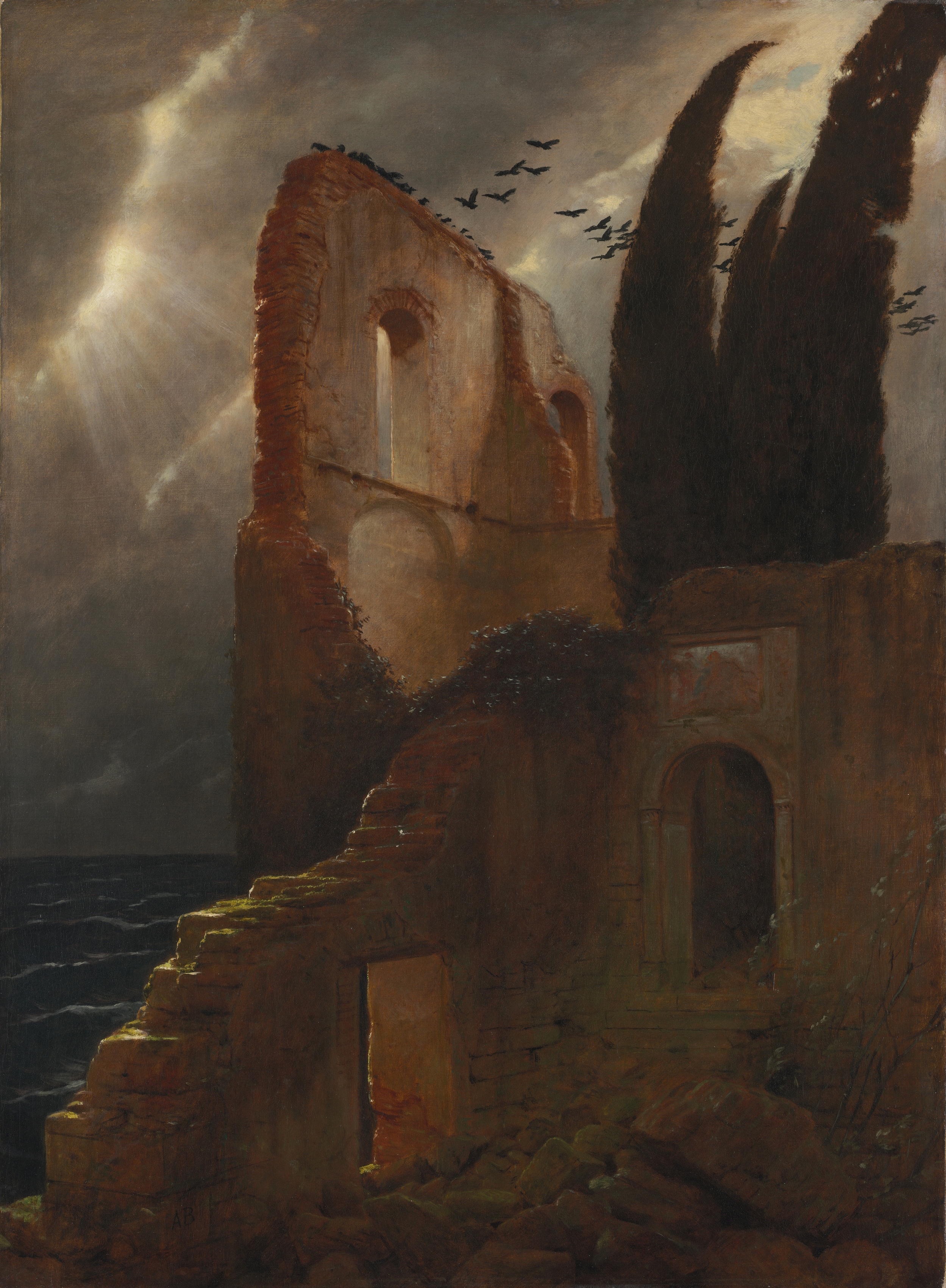
Arnold Böcklin: Ruin by the Sea (1881)
" … cast some shadow and light …"
I caught myself attempting to recreate my past, a common enough affliction for anyone touched by nostalgia, but it's an impossible. Not one of those "impossibles" intended to challenge to greatness, but one destined to produce growing frustrations. You see, the past is past and will not be seen again. Oh, I can always change the past by changing my story, by rewriting the history, my history, if I choose, but it will not be resurrected or reanimated or re-present-ed again, but only because it can't be. What I should have been aspiring to accomplish might be better understood as manifesting. I can manifest a SetList inspired and, indeed, informed by my past, but I cannot recreate what once was. Let's say that I left that on a bus back in the late seventies, so long ago that the bus company has already purged their lost and found a few dozen times since then. That past's gone and it's not ever coming back again. Period.
If I care to avoid this mistake, then, I simply must frame this SetList effort as a creating rather than as a recreating one.
Unconvinced

Gerard van Honthorst: The Merry Fiddler (1623)
Three weeks into this SetTheory experiment, I remain Unconvinced of this effort's viability. I know that I was supposed to be all in as a precondition for beginning, but I believe that such strict entry criteria might do more damage than good. The myth of the necessity of unambivalence persists, though. It haunts me as if my engaging without full conviction might doom the effort from the outset. I'm beyond outset now, though, and this work seems to be unfolding more or less normally. The resulting slight sense of inevitable failure haunts me. I have my good days and my struggling ones. Some mornings I could swear I've been blessed by angels, and others, cursed by them. I wend my way rather than stick to anything very straight or narrow. Progress mostly crawls.
Yet I sense that I'm making real progress.
Practicings

Agostino Carracci after Federico Barocci:
Aeneas and His Family Fleeing Troy (1595)
" … all the time remaining in this world to Practice …"
At its best, Practicing renews. Any its worst, it undermines its own intentions. It's never real work. It doesn't even pretend to be productive, to produce anything. It's all preliminary, preparatory, precursor to some future delivery, meaningless without its future looming before it. All that said, it can sometimes feel essential, necessary if not exactly required. It can inspire. It aspires to be more than it will likely deliver and therefore must be grasped with a forgiving hand. It can reward but it's never obligated to payback anything. It might revive or disappoint. It's too easily avoided. It probably qualifies as one of the very few truly good habits.
I become a different person under the influence of my Practicings.
FirstIteration

Odilon Redon: Evocation (undated)
"I hold raw material now, rather than "half forgotten memories," …"
I realize that I had been actively resisting writing down the FirstIteration of the SetList I've been insisting I've been working to create. I'd taken solace in its absence, comforted by the latitude I could maintain until just after I started nailing down by creating a concrete target. I might have been reveling in theory more than practice, and this response seems typical of one of mine. Maybe it's an example of Hastening Slowly at the beginning, but it eventually came to feel more like active procrastination. This morning, I resorted to pen and paper, and toughed out a FirstIteration SetList. It seems certainly wrong, by which I mean it could not possibly be the FinalIteration, for that should perhaps properly come the evening before the end of this quarter, or the final morning before I'm scheduled to perform. This project just took one giant step toward becoming real.
Reality can be such a drag.
ValleyOfShadow
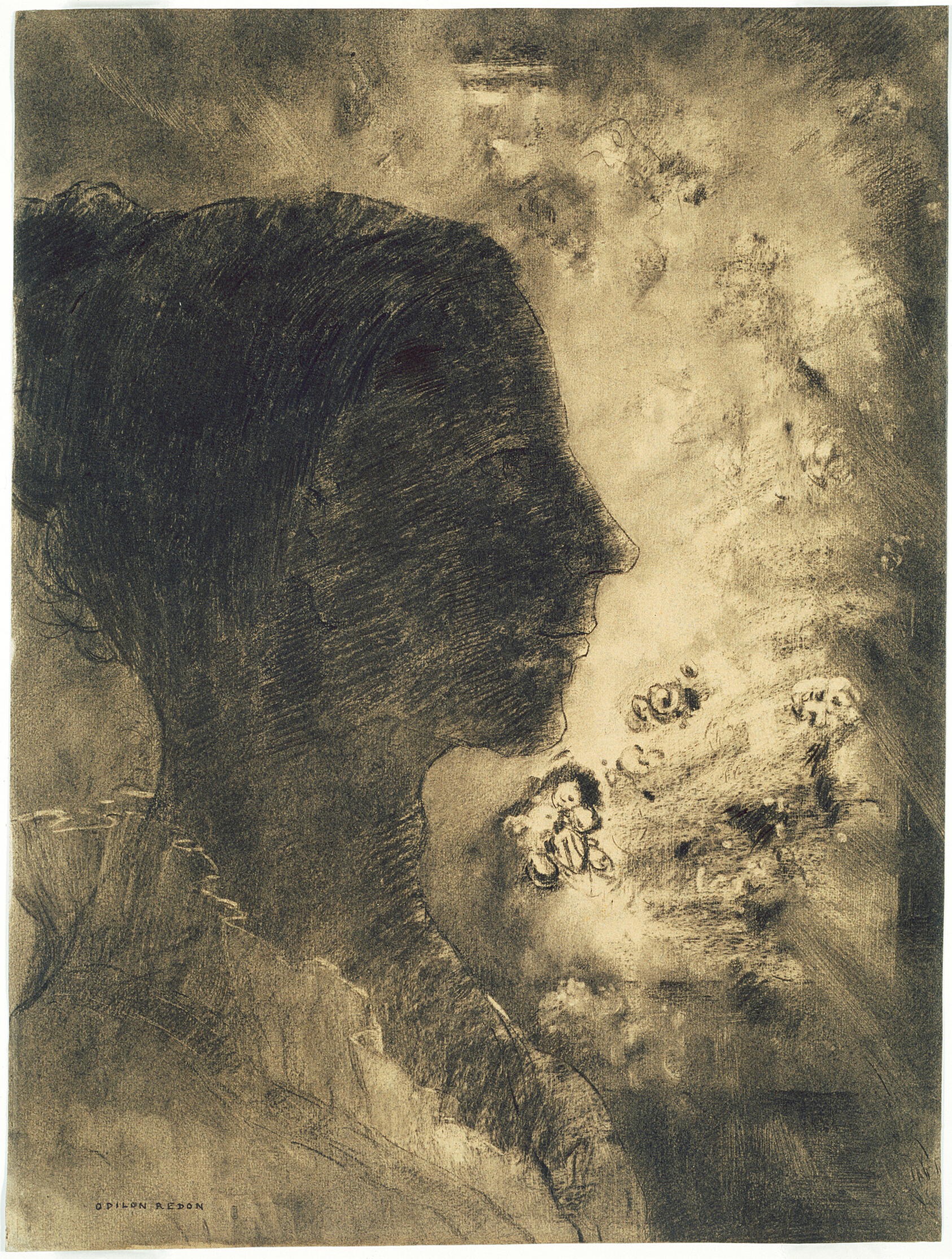
Odilon Redon: Profile of Shadow (c. 1895)
"I'm left wondering who either of us might end up being …"
It might be that Tuesday mornings become the times when I set aside my SetTheory stories to visit the infinitely more significant background saga presently accompanying The Muse and my days. Consistent readers might recall last Tuesday's story, titled Consequential, wherein I introduced The Muse's cancer diagnosis and her acceptance into a clinical trial which allowed her to forego the typical poisonous Chemo treatment. This plot twist in the cancer diagnosis that she'd already labeled her Plot Twist, left the both of us feeling extremely fortunate, as if she'd dodged an otherwise inevitable bullet, but the plot twist within this plot twist brought terms and conditions with it. She would still have to submit to radiation therapy, six times each week, for thirty iterations. Yesterday, one week after receiving her first infusion of immunotherapy magic, with no evident side effects, she was scheduled to submit to her first radiation treatment.
I was struggling with side effects from my latest Covid booster, which left me feeling clogged and groggy, but I managed to put myself together so that I could at least chauffeur her to her first radiation therapy appointment.
Illegitimate

Giovanni Battista Tiepolo:
The Immaculate Conception: 1767–1768
" … some sacred responsibility to hear myself."
My talents, such as they might be, all fall under the general label of Illegitimate, for I came by none of them through proper means. I was never recognized as a prodigy of anything. I did not distinguish myself as a student of any art or science. I was never recognized as an especially inspiring leader or a particularly gifted teacher. What notoriety I have received came in through the bathroom window and was only narrowly appreciated and, even then, often misunderstood. My songwriting therefore grew to become a more private than public thing, something I demonstrated after dinner with a properly lubricated and intimate audience. I didn't so much suffer from imposter syndrome as embody it.
I believe that many, indeed, most, legitimate artists began their careers as Illegitimates.
PluggingInto
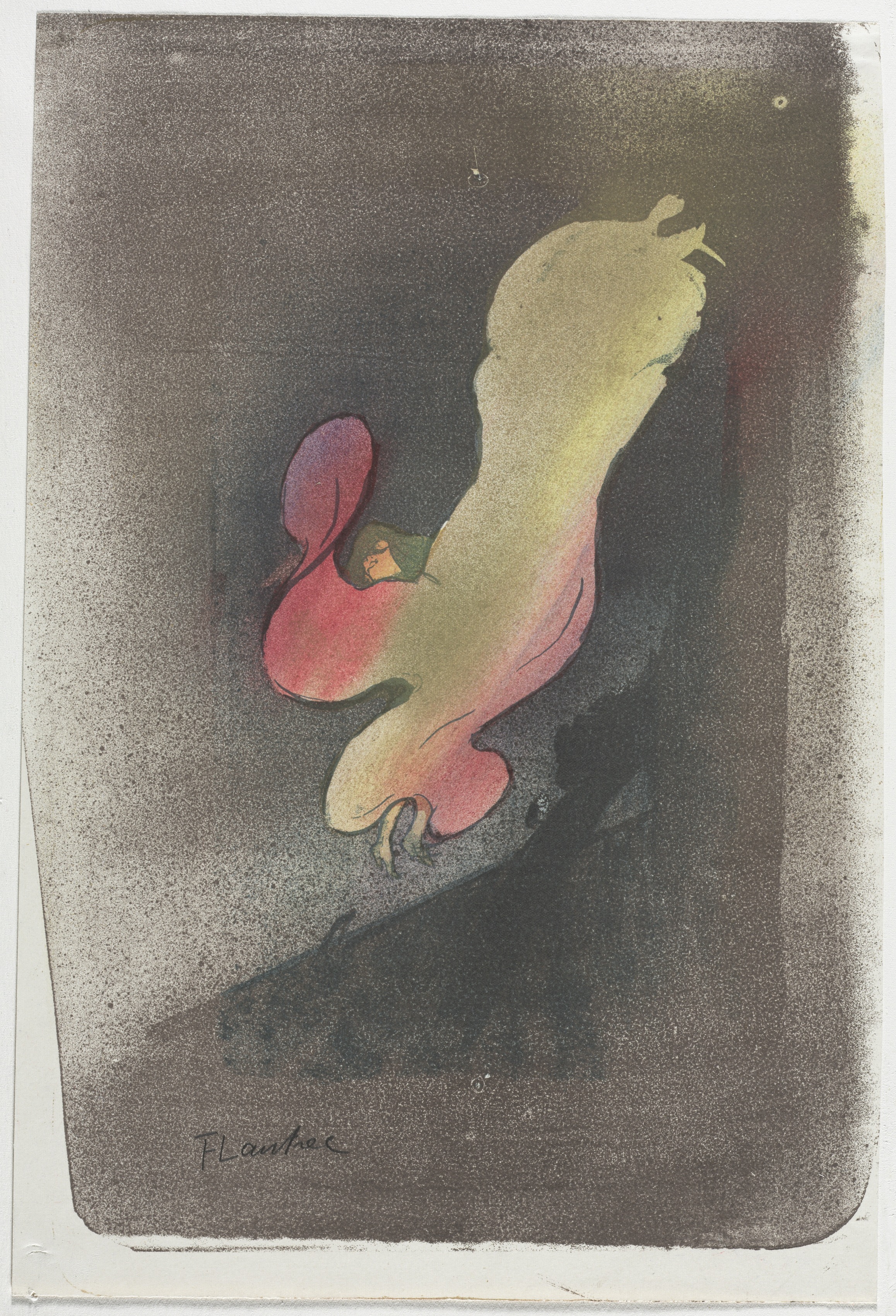
Henri de Toulouse-Lautrec: Miss Loïe Fuller (1893)
"Maybe I'm deep down trying to sabotage my effort …"
I struggle most with the technology, which I believe someone invented with the notion that it might somehow render things overall easier. Under whatever rule has always reigned over technology, though, the best one can ever expect from it might be a slight shifting of some problem, never outright resolution, and each incremental improvement in something inevitably erodes some other aspect, thereby keeping everything more or less even in this universe. Advancement might well cause the cosmos to crash in upon us. Yet each field seems to eventually yield to the ceaseless seduction of a technological improvement never once evident in actual results.
My second career involved helping to upgrade computer systems into alluring futures.
InMyHead
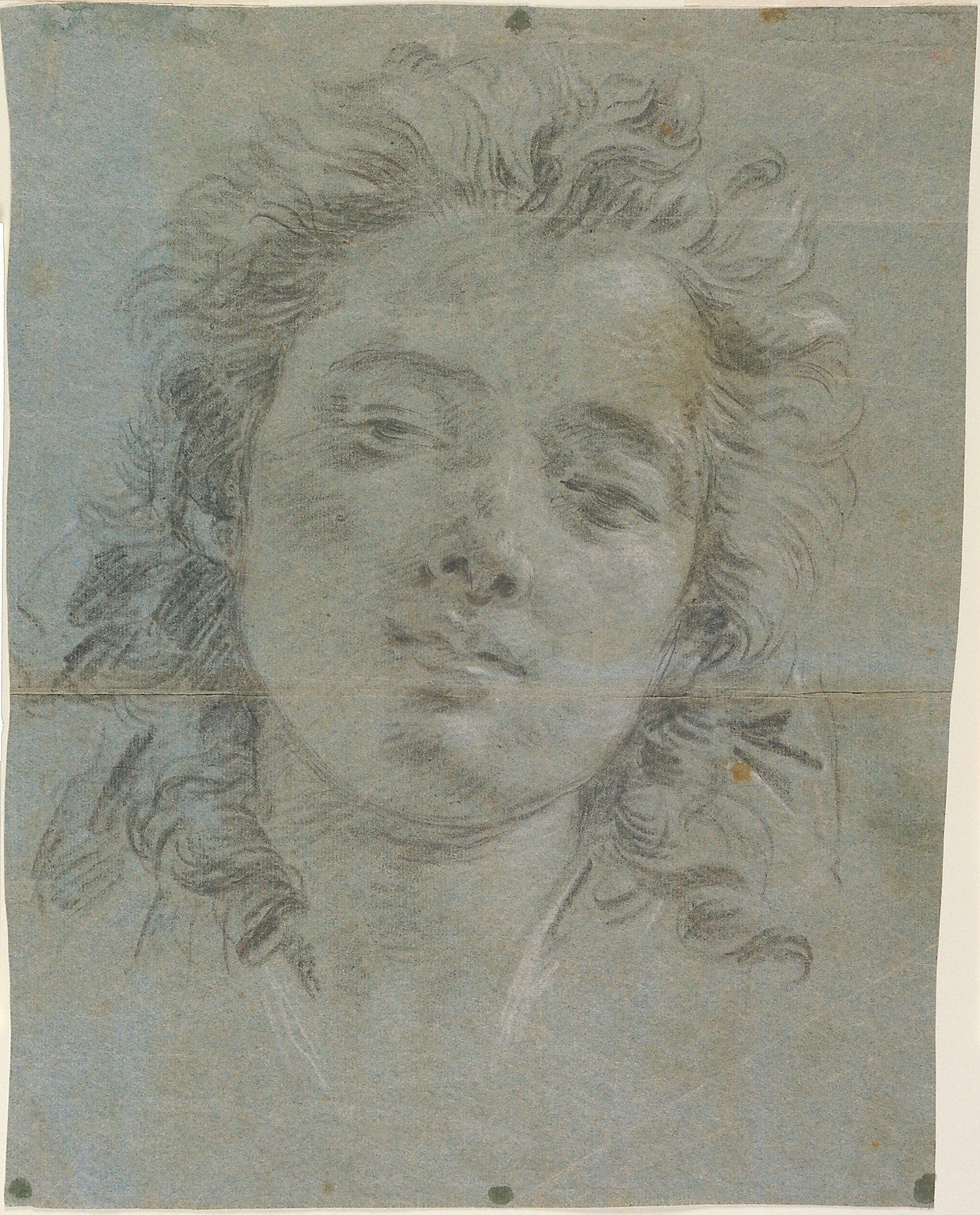
Giambattista Tiepolo (Giovanni Battista Tiepolo):
The Head of Truth (c. 1744)
" … organizing something that only exists InMyHead."
Eventually, the vague and attractive notion that initiates an undertaking starts wondering where it's going. It has always been one thing to break the inertia of rest and quite another to set a coherent course, and it's entirely normal to get moving before becoming completely clear about proper direction. It usually doesn't much matter at first if one heads off in a wrong direction as long as one gets moving. U-turns are common early on and not unknown even nearer an ending. Job one's always focused upon getting moving. Later, increasingly unsettling questions bring the questionable gift of self-awareness, especially when the adventurer cannot quite imagine how to answer them. What at first seemed if not precisely clear but certainly clear enough, comes to appear opaque. Two weeks out and self doubt enters the frame.
The questioning usually comes in the form of the universally unsettling question: If you had that, what would you have?
Habituals
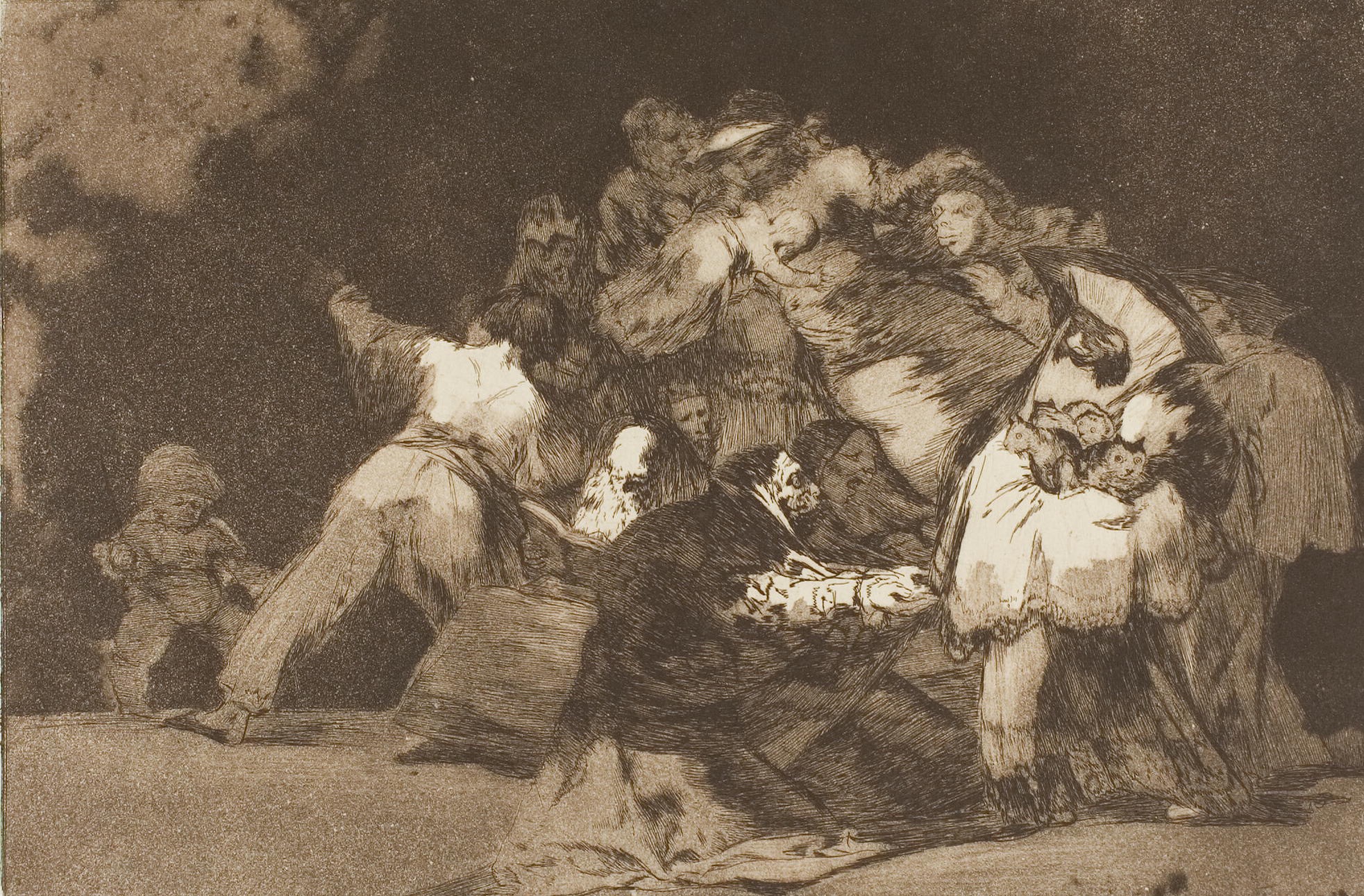
Francisco José de Goya y Lucientes:
The Claws of a Cat and the Dress of a Devotee -
similar to Vice is often clothed in Virtue’s habit,
plate nine from Los Proverbios (1815/24)
"The devil deals in Habituals."
It has sadly become common practice that people try to acquire what they consider to be good habits. I guess they figure that if they can set some activity up as automatic, they're more likely to continue engaging in it. I've even heard of some who claim to have managed to set up a mindfulness habit, the thought of which just makes me cringe. Clearly, bad habits exist and seem to be almost impossible to disengage. Ask any smoker to explain why. I've long considered the Habituals a rather cheap shot, and a fundamentally misleading one at that. I doubt that salvation lies in that direction. Most things require more attention than any Habitual reaction allows.
I prefer ritual to Habitual.
Selfless
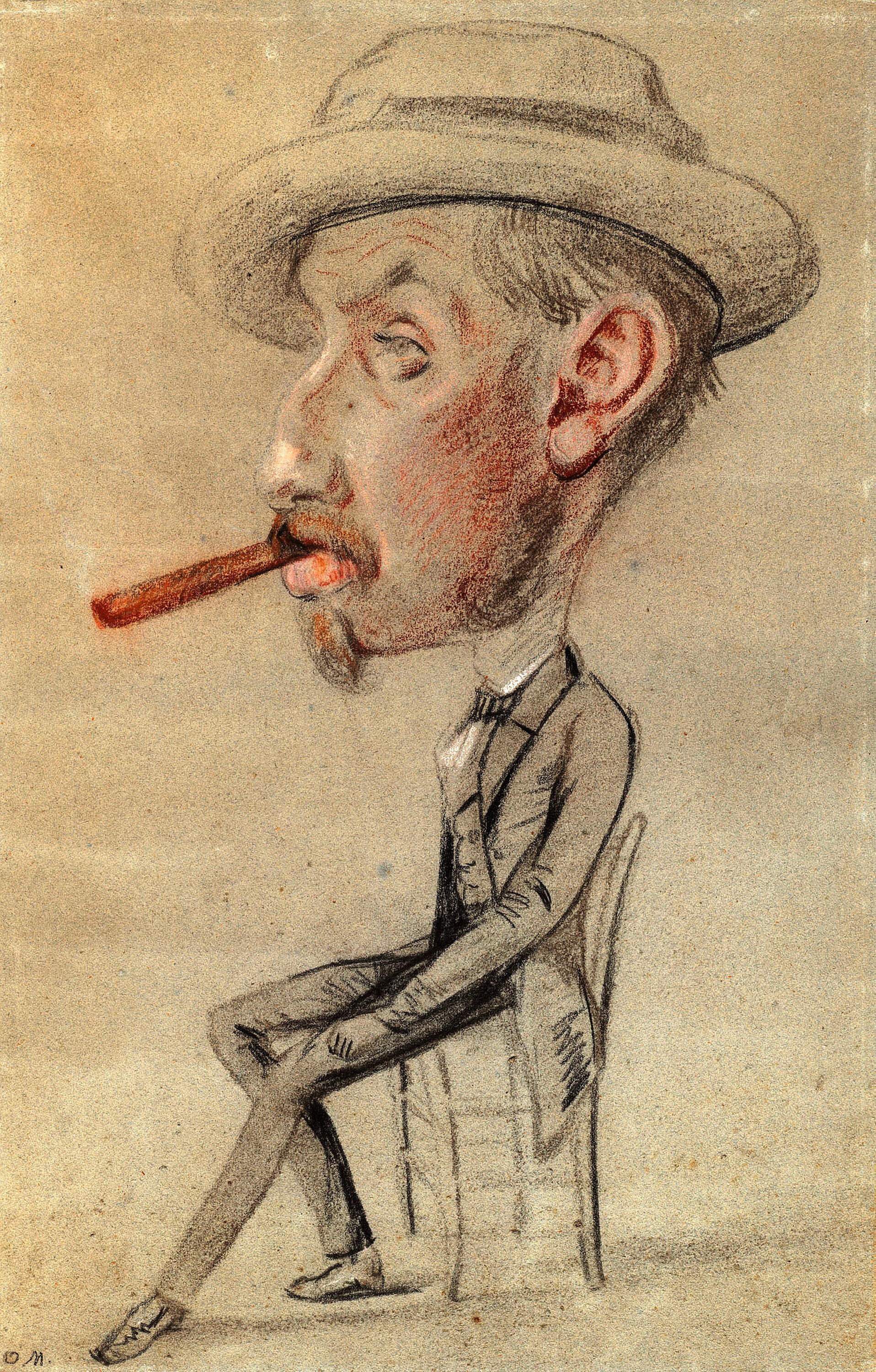
Claude Monet: Caricature of a Man with a Big Cigar (1855/56)
I lose myself sometimes, a most curious and disturbing situation. I do not remember anyone ever tipping me off to even the vaguest possibility that I might at times misplace myself, but I have. I most often lose myself when I engage so deeply in some activity that I forget I'm there, not in any way a disturbing happenstance. I sometimes try to lose myself in the interest of experiencing what some have labeled 'flow,' but trying to lose one's self rarely works. It seems that selves must slip off all by themselves, unnoticed. It might be that one cannot notice the absence of themself while they are missing. Who would be noticing if the self was gone?
My effort to create a SetList might be my attempt to reconnect with a part of myself lost in the process of living my life.
Dawdling

Pieter van der Heyden, Engraver
[after a drawing by Hans Bol, artist]
Autumnn (1570)
"… my life's work might have only approached accomplishing anything …"
The Romans insisted that one should Hasten Slowly at the beginning, but were mute with advice for ending. I've long proposed hastening even more slowly when approaching an ending, though it's become tragically popular to hasten ever more quickly then. An old saying in the project management community explains that it's "all assholes and elbows" at the end, as everyone rushes to meet some inevitably artificial deadline, rendering it and its products more meaningless in the process. Following a lengthy effort, the end rush seems ignoble, disrespectful of the painstaking effort invested into what quickly degrades with impatience as its ending approaches.
I prefer perpetual motion though I understand that it's physically impossible to achieve.
Consequential

Pieter van der Heyden: Big Fish Eat Little Fish (1557)
" … miracles really do happen, and they occasionally even happen to us."
I want to believe that every hour, every minute, every blesséd second somehow qualifies as sacred and therefore Consequential. I want to believe this, but I cannot and remain honest, for some days, some hours, some minutes and seconds stand above and at least a little beyond the rest. A few even stand far, far above and beyond their fellows, and so seem uniquely consequent. Yesterday was one of those days, one of those unforgettable ones where a convergence occurred. These events never make believable fiction, by which I mean they simply scream that they actually happened, however unlikely that might seem, because they're too unbelievable to seriously qualify as fictional. Truth often seems stranger than fiction.
I take a brief break from my SetTheory efforts to acknowledge a Consequential event.
Reviving

Gerard de Lairesse: Bacchus and Ariadne (c. 1680)
"I can sometimes hear my former selves whispering."
Creating this Set List involves reincarnating past work. My work freezes time and place in the same way as might any book or film. I watch old black and white movies expressly for the purpose of Reviving the time and place within which they were created. A Hitchcock film seems forever frozen within its time, and cannot escape into the here and now, no matter how many times I might watch it. It takes me back instead. In this same way, Reviving a song I wrote thirty years ago invokes that place and time, reanimating the me I knew so well then, one I might not have seen since. Of course, I'm older if not necessarily wiser now, so I cannot fully immerse myself into that vessel, but I get a taste, a "snootful", anyway. These excursions might feel delightful or painful, or, more probably, simultaneously both. They prove to be emotional roller coasters.
I remember the dismay I felt when I saw some once-favorite character actor twenty years after they played that role.
Laziness
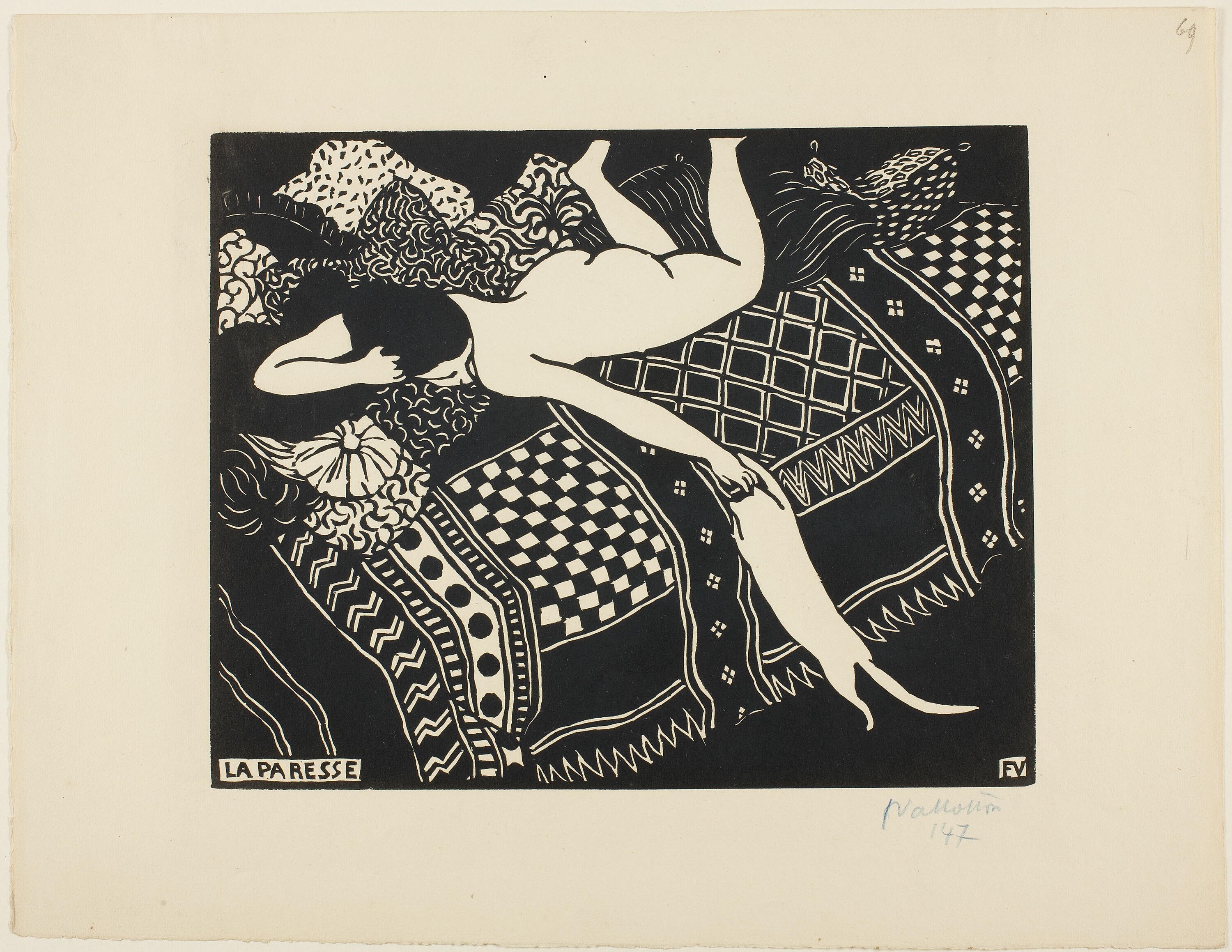
Félix Edouard Vallotton: Laziness (1896)
"Our catalogues might eternally be narrower than even we expected."
I haven't quite come to fully accept my narrow musicianship. I get by with a few keys and just about as many chord progressions. I might daydream of writing complex Hoagy Carmichael-like melodies, but I've so-far stuck with far simpler structures. Further, assimilating new chords into my tiny repertoire seems unlikely, as my hand turns into a claw whenever attempting a fresh form. I'm reminded, again and again, of Meredith Wilson, who composed the entire The Music Man score employing essentially one melodic structure, every song a slight variation upon the very same theme. His accomplishment reassures me that my apparent Laziness might hold real promise. If it doesn't, I'm probably sunk.
I've pretty much always employed applied Laziness as my primary coping strategy.
Dredging

Sakai Basai 酒井 梅齊:
The Sand-Carrying Festival [Sunamochi Matsuri] (1856)
"It's already far too late to have properly filed my history the first time."
Creating this set list involves considerable dredging. Had I properly filed my finished pieces, I might just scroll back through a pre-existing list and choose, but I did not maintain a list of completed works. I have multiple lists of completed works, none complete themselves, and not all even accessible any more due to obsoleted file structures and operating systems. Anything once saved as a WorkPerfect file is perfectly inaccessible now. I have paper backups which have fared little better, since the lists and, indeed, the actual lyric sheets seem spread over a considerable geographical area, some essentially unfindable. Seeking hard evidence of the existence of any specific song becomes a slog slowing filling with self-recriminations. It's already too late to do anything right the first time. Some pieces have been lost to the ages since their inception.
It's no great tragedy when I lose evidence of some past creativity.
Delving

Societa anonima cooperativa per la fabbricazione delle maioliche (Deruta, Italy):
Display Plate with a Man Striking a Heart on an Anvil (c. 1550)
" … grasped without really understanding what we're choosing …"
This work creating a Set List seems a bit different than the standard purposeful effort. Like you, I was exhorted to Start With The End In Mind, even though whatever end I might initially envision would have to be wanting, given that it was by definition not informed by the effort to determine it. That end, whatever I believed it could or should be, would just have to be different than I first imagined or it could not have been worth pursuing. So, Set Listing (if I might call my current occupation that), doesn't qualify as a standard engineering effort, either. The specs aren't nearly specific enough yet, and might never lend themselves to mechanical drawings. I sense that I am not so much pursuing, but Delving into.
Like all projects, this one began with a bright idea, a big, alluring statement of purpose, utterly vacuous at inception.
Reassurance
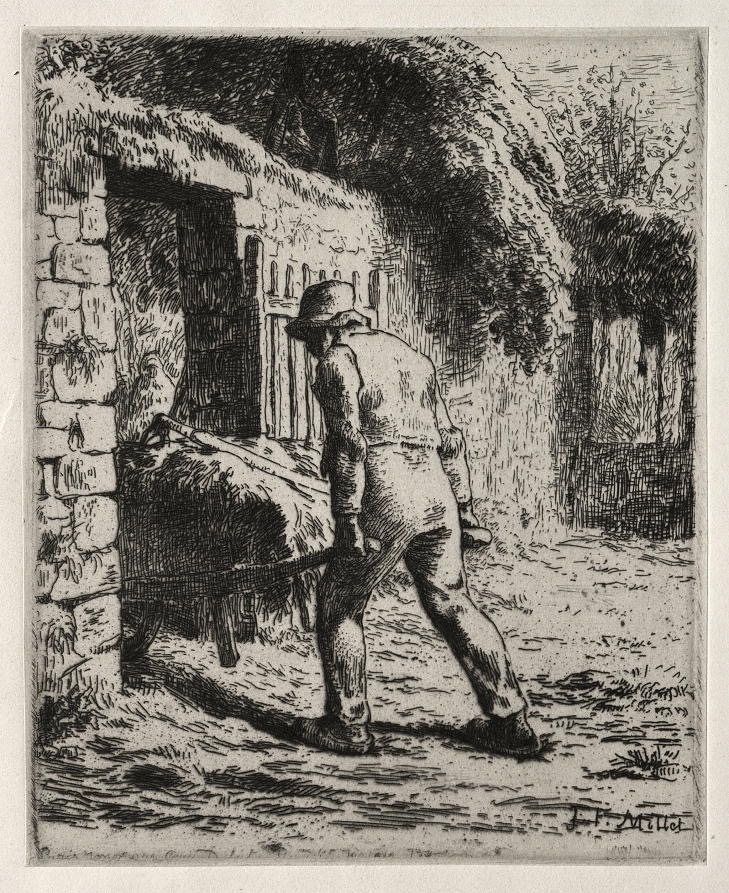
Jean-François Millet:
Peasant Returning from the Manure Heap (1855–56)
"I necessarily remain a novice at this work …"
Judging from how I seem to drag my feet into practicing, this creating a set list seems like hard work. Even the hardest work, though, might include some Reassurance, some occasional sense that it's not just hard but also rewarding. My anticipation decides much, and I too often anticipate some worst coming. This set-up leaves me surprised and sometimes even delighted when my effort produces some glimpse of goodness, when some of that old confidence shows, or when I seem to know what I'm doing again. A body of work long left idle awakens fitfully and requires Reassurance to fully awaken. Creating this set list was first just an idea, though I do not mean to demean its source since ideas seem capable of sparking most anything. Beginning again seems more daunting than was the original creation of these songs.
I sat before a small window in a cramped hotel room, guitar in hand.
Practice

Honoré Victorin Daumier: A zealous student practicing at home,
plate 6 from Les Baigneuses (1847)
"It's the pursuit of premise pursuing purpose …"
The old joke asks how to get to Carnegie Hall before disclosing: Practice, Practice, Practice. Of all human endeavor, certainly Practice stands near the most curious. I expect that we misunderstand it because I'm confident that I misunderstand it, mostly because I can't hardly stand to do it. It seems infused with purposeless, and I suppose that natively, Practice is always separate from purpose. It might be that Practice largely entails mustering a motivating backstory so as to make the effort tolerable if never entirely pleasurable. For me, it reeks of self discipline and self possession, a separation in preparation for making a connection. I often spend my practice time aching to be finished practicing and on to something more sociable and meaningful.
Still, if a musician or even a lowly songwriter ever expects to perform his work, it seems he must prepare somewhere.
CrimeScenes
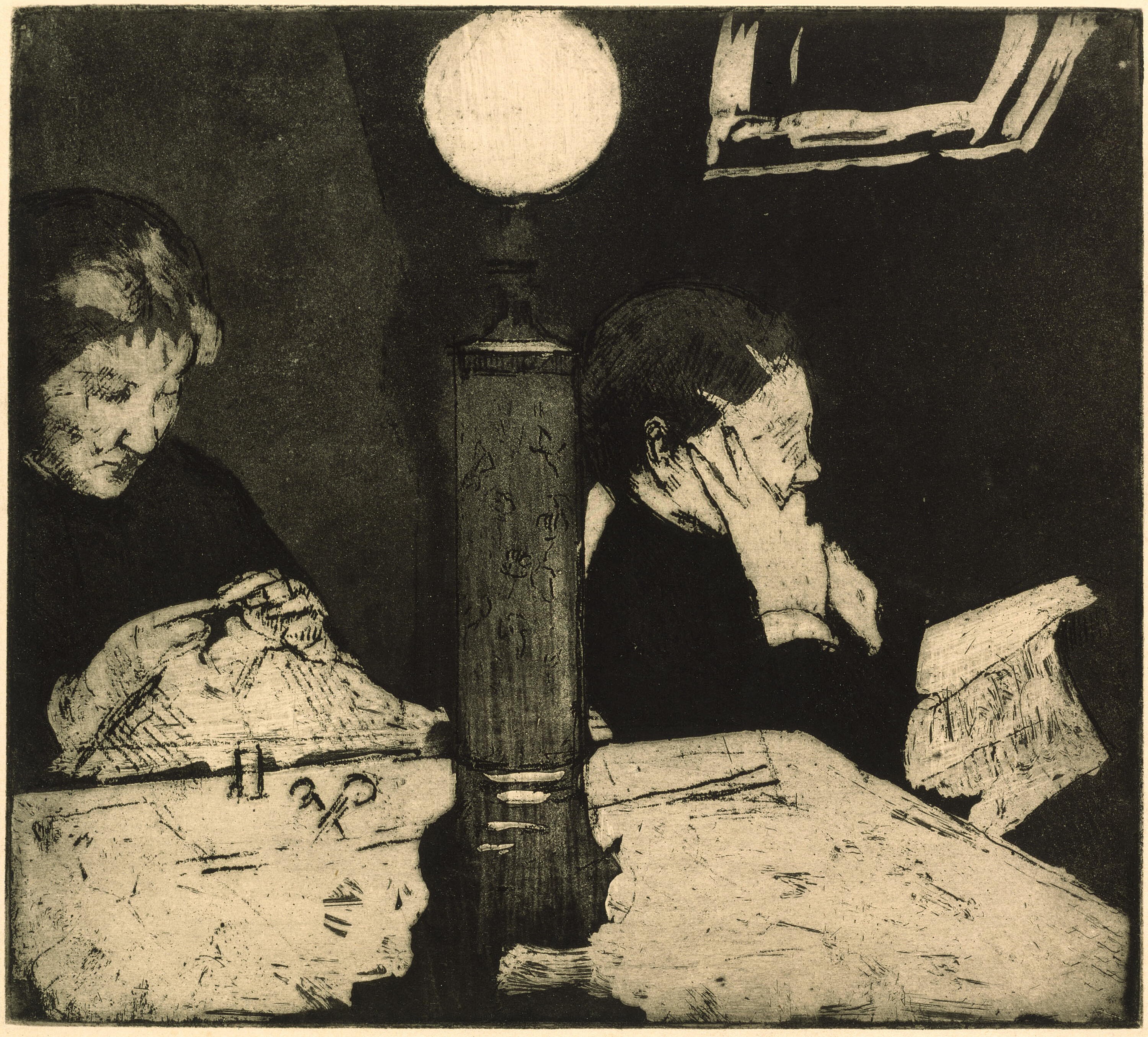
Mary Cassatt: Under the Lamp (c. 1882)
" … evidence of criminal conspiracy afoot."
Each song in a thirteen song collection of my original compositions evokes its source when I perform it. The situation, location, and conditions then present flood me, often almost overwhelming me, and sometimes succeeding in absolutely shutting me down. I am not always able to finish a song I've started for it transfers such an emotional load I cannot bear it in some moments, and I just have to stop. Other times, I'll get so distracted by the ginned up context that I'll forget the words. It's helpful, if deeply embarrassing, when The Muse reminds me of the next phrase after sensing that I somehow got lost on such tenaciously home turf. The scene of the original crime reappears each time, if, indeed, the birth of each song constituted a crime. If they were crimes, I could claim that they were innocent crimes of omission rather than of deliberate commission. I never once intended to capture that time, or any time, in any kind of bottle, but writing a song, any song, seems to inadvertently produce just that sort of result.
Room 327 in the La Posada in Alburquerue, originally built by Conrad Hilton, lord knows when, and featuring the most wonderful Spanish tile lobby.
RealPlay
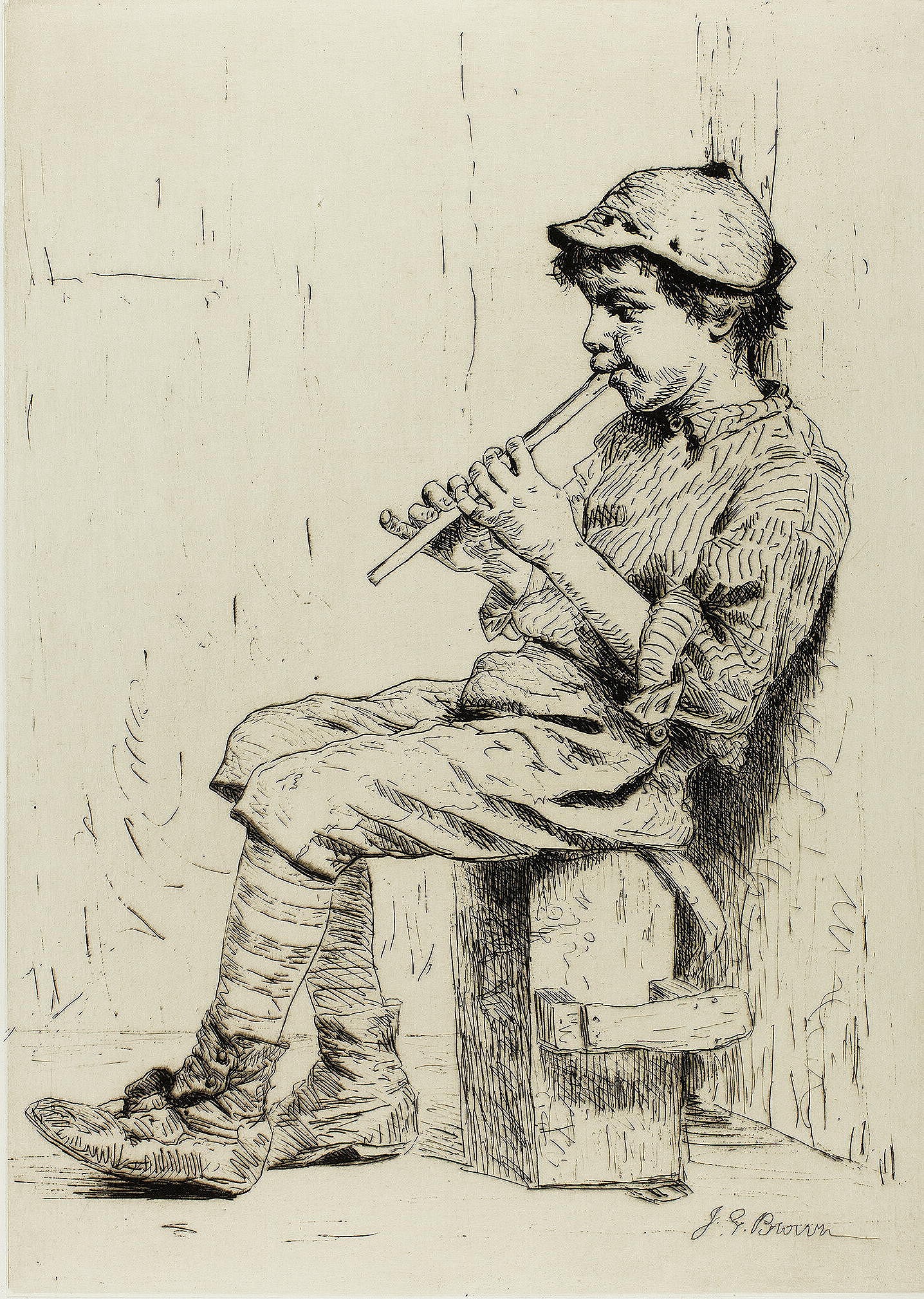
John George Brown: Boy Playing a Flute Date (c. 1860)
" … the play seems too real to be too serious."
Anyone raised under The Protestant Work Ethic should find confusing the concept of playing for work. I suppose all entertainers suffer from some of this muddle, with comedians perhaps suffering most, for they slave away in laughter mines more oppressive than South African diamond ones. Musicians, though, too, also deal with material most closely correlated with leisure. Their work is their audience's play. They are even said to "be playing" when they perform their work. They're supposed to at least appear light-hearted and, dare I say (in the most traditional way) gay whenever they're up on stage. Nobody pays good money to watch a morose bluesman perform. His lyrics might describe absolute despondency, but the ethic governing its presentation insists that the performer definitely not be suffering when recounting his humiliation at the hands of some two-timing nobody, his reported "baby." He's supposed to be above actually grieving over the experience and somehow, paradoxically, be absolutely reveling in it. "My baby left me, cha cha cha!"
The songwriter, too, suffers from expectations, or can if not properly disciplined.
RealWork

Paul Gauguin: The Large Tree (1891)
"It was an inconvenient time …"
I look at an old set list and I realize that it represents RealWork that I actually accomplished. Each title manifested the hard way; none came easy, thank heavens, for RealWork must be difficult if it ever hopes to become rewarding. Nor was I ever paid to create even the least or the very best of the songs appearing on that list. I created each as an act, and sometimes an extended act, of something very much like love. Not like love of country or of spouse, but of self, but not narcissistic love, more like the filial kind. I created none of my songs in the hope that I might one day make money off them. Well, I should amend that blanket statement by saying that I wrote precisely one song with the sincere hope of making money off it, at the encouragement of my then agent, who'd insisted that the only way I'd ever make any real money in "the business" would be to write a disco hit, so I set about attempting it. The result was the biggest piece of shit I ever produced. I will not play it for you even if you ask nicely. I won't even play it for myself. It was a blessing of a lesson, one which further solidified an understanding. RealWork's not for pay or for profit, but properly for the ages.
My understanding came slowly, the recognition that I had been training myself in RealWork since I'd started becoming addicted to my instrument, since I wrote that first song.
DiffsGiftering
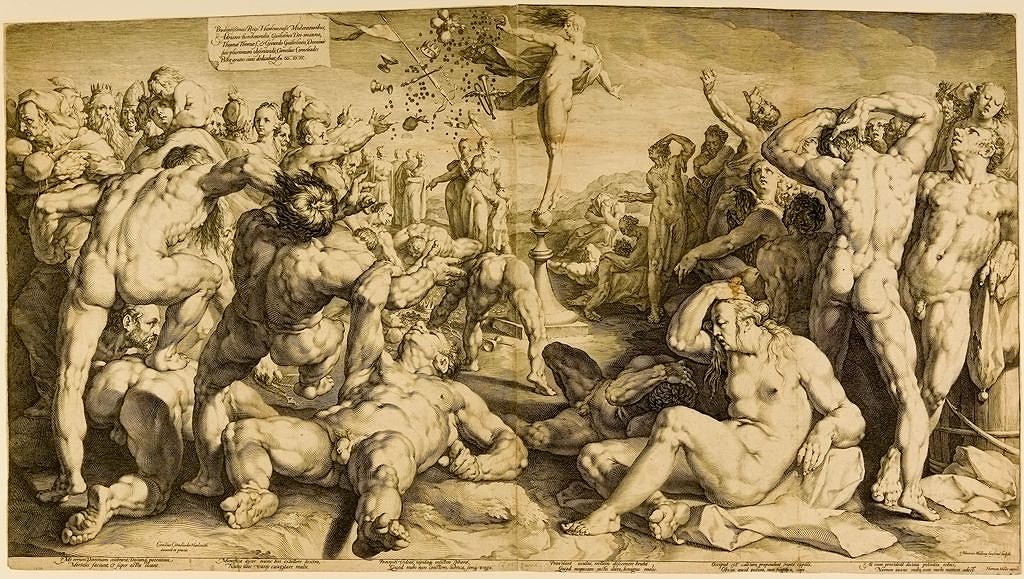
Jan Harmensz. Muller:
Blind Fortune Distributing Gifts (16th-17th century)
"Nobody ever requests the greatest gift they receive."
The ancients believed that Fortune distributed gifts to The Gods, rendering each unique. In more modern times, Fortune seems no less occupied bestowing gifts upon mere mortals. The Gods having been long ago gifted, Fortune's only alternative might have been long-term unemployment, an intolerable condition in a fundamental force of nature. It seems inarguable that different people seem to have been bestowed with different gifts. Some were seemingly born with the gift of gab while others' superpowers seem to quite naturally stifle them. It seems common enough that some aspire to achieve what for which they were never naturally gifted, with sometimes tragic results. When I attended Junior High, a purgatory between childhood and adulthood that every child must pass through, I was subjected to what was labeled a career assessment instrument. It purported to be capable of questioning a twelve year old kid and, by analyzing his responses, determine his best prospects for a career. I was declared a probable accountant, an appalling assessment I swore to resist with my heart and soul. I could not relate to the black and white photograph of a buzz cut geek in a short-sleeved white shirt and skinny tie, smiling beside a ten key machine. I dedicated myself to growing up to become anything but that!
It might be that such experiences weighed on me to the point that I would never fit into proper society.
SetTheory
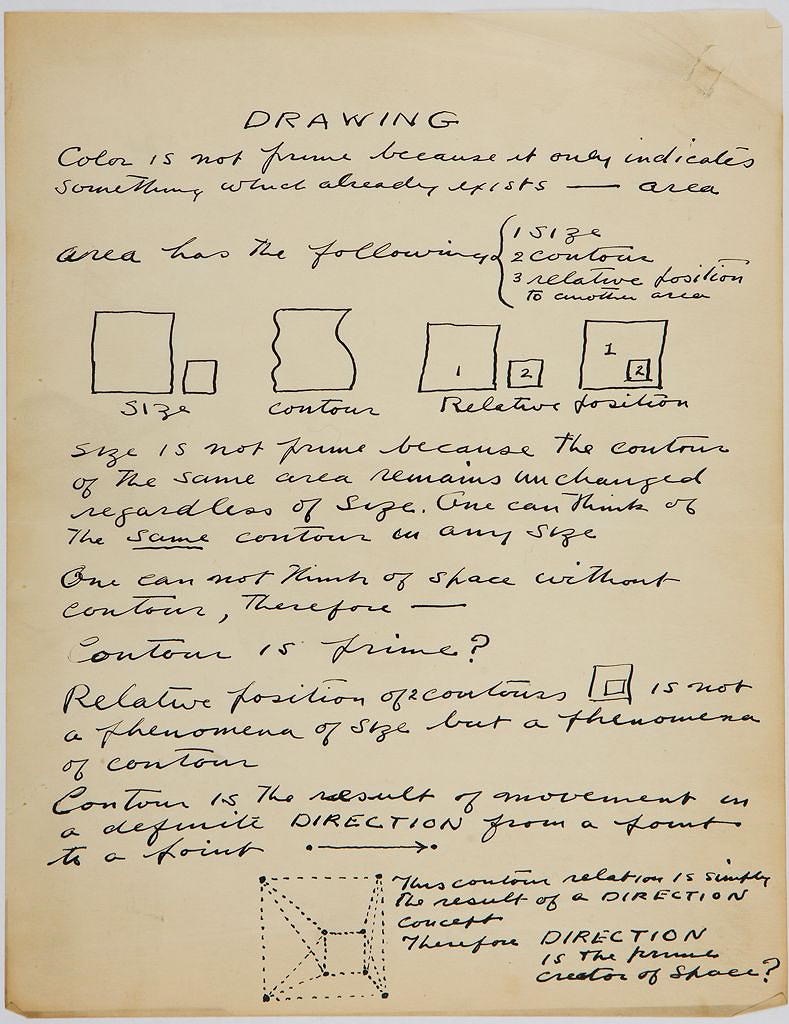
Stuart Davis: Art Theory Text with Diagrams (c. 1932)
" … employing the magic of SetTheory"
My first career, more than fifty years ago now, was that of a songwriter, an admittedly made-up career choice attractive because it required only informal study. My high school guidance counsellor declared me Not College Material, a designation I later learned actually meant Not High School Material, which cut me off from a common birth family exit. Further, I had declared myself a pacifist in the face of the Vietnam war, so the military didn't offer me an offramp, either. I pursued music, though to be fair, I really should declare that the music pursued me first, and my response was at least half defensive. I, like many in my generation, acquired a guitar addiction while still in grade school. I fell in love with the thing and dreamed in chords and rhythms. I'm convinced that it altered my DNA. Unlike most, I came to write my own songs and, through that high school within which I never belonged, I nurtured my identity performing on a tiny stage in front of an actual brick wall in a church basement coffee house replete with tiny tables and flickering candles. I later even learned to hitchhike.
I encountered my first sets in that basement.


